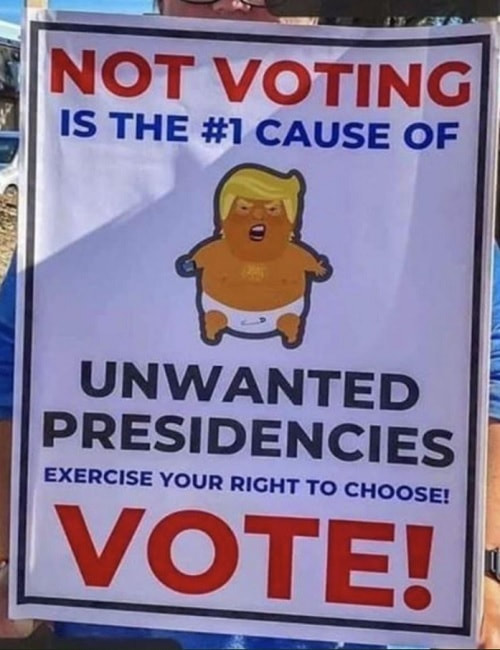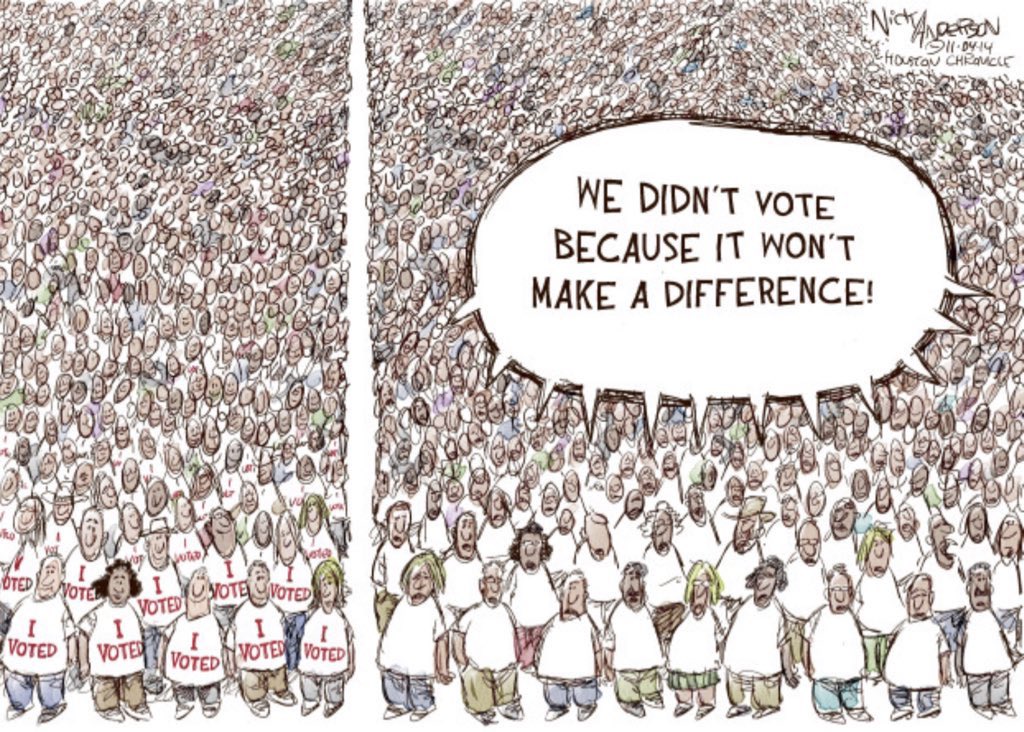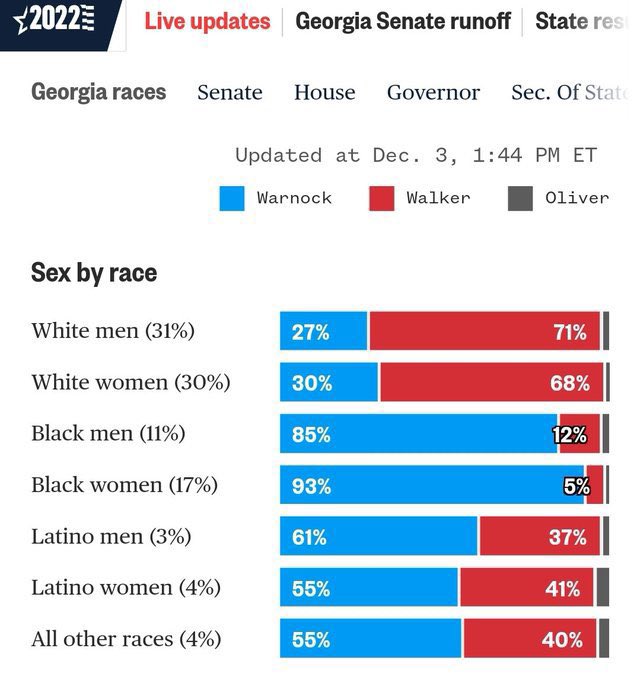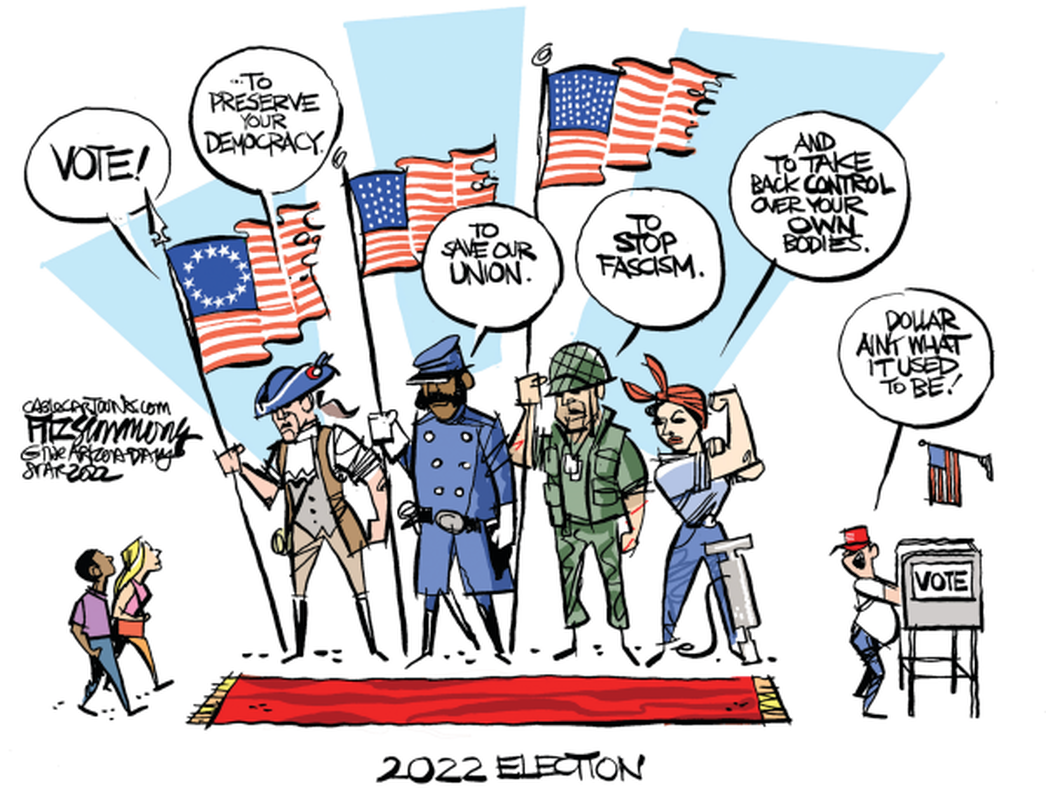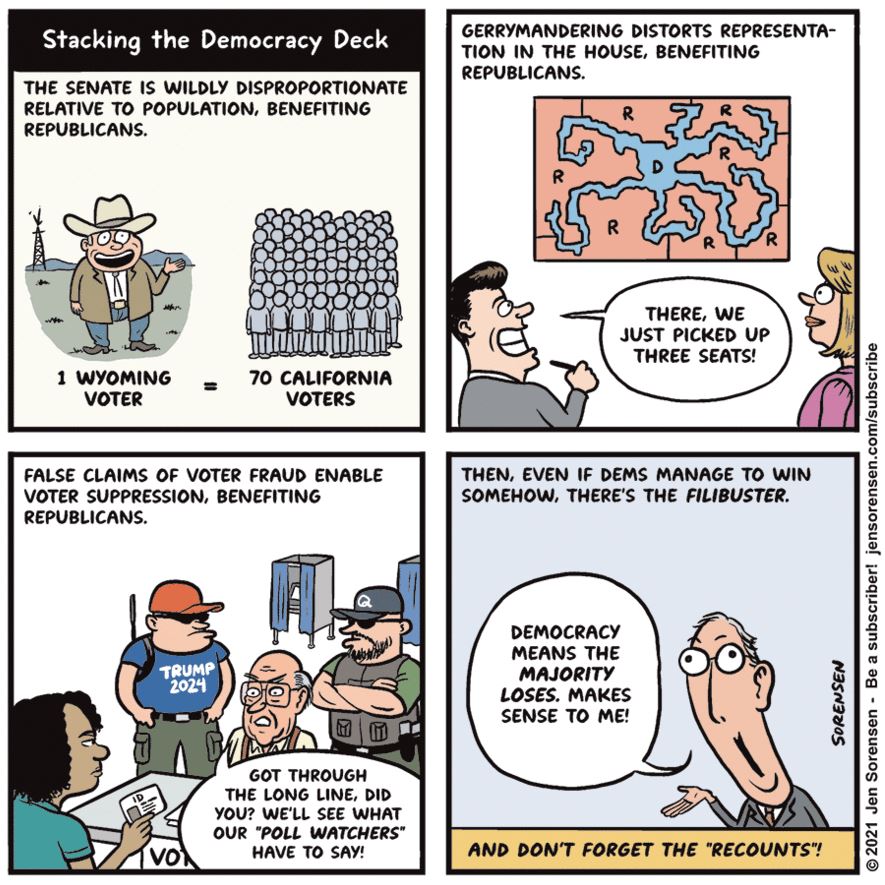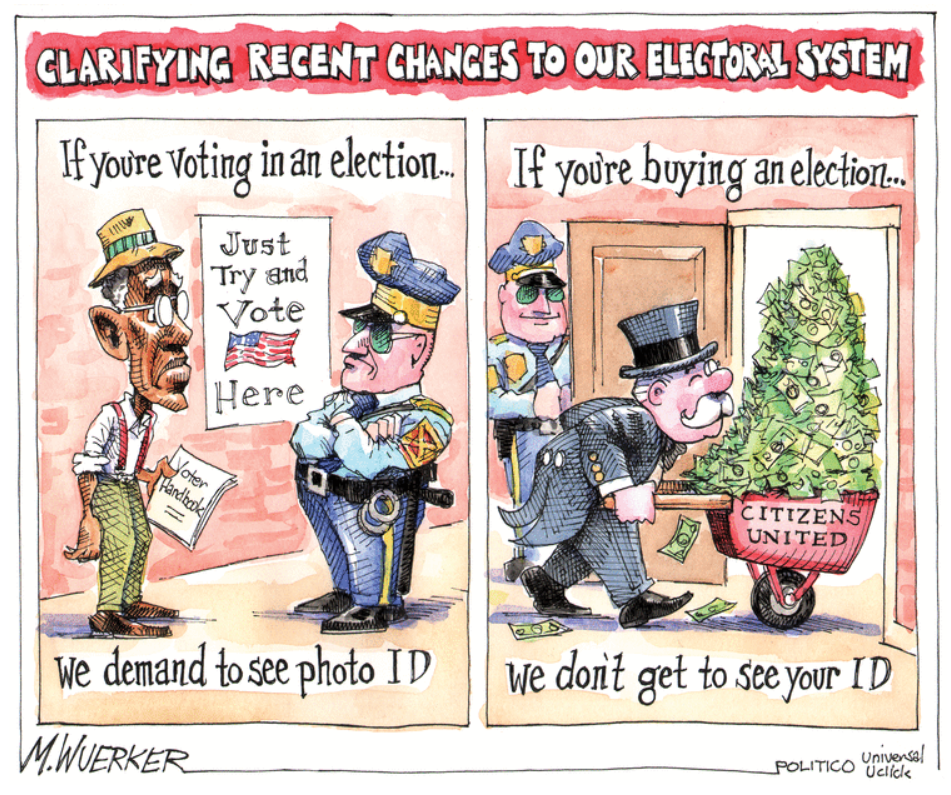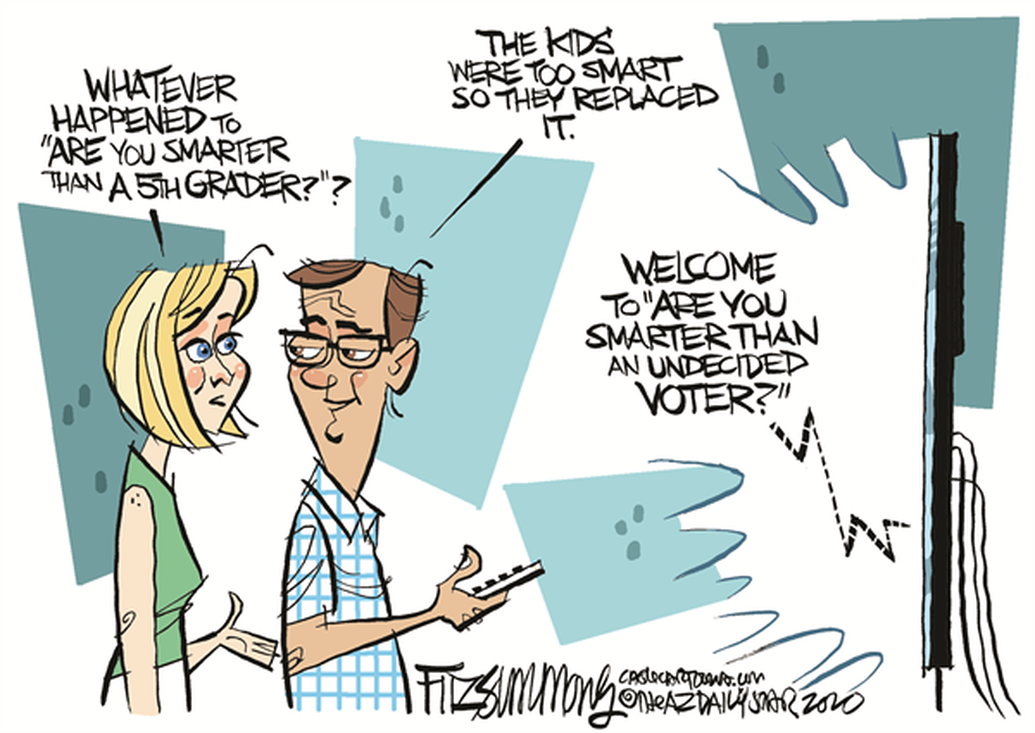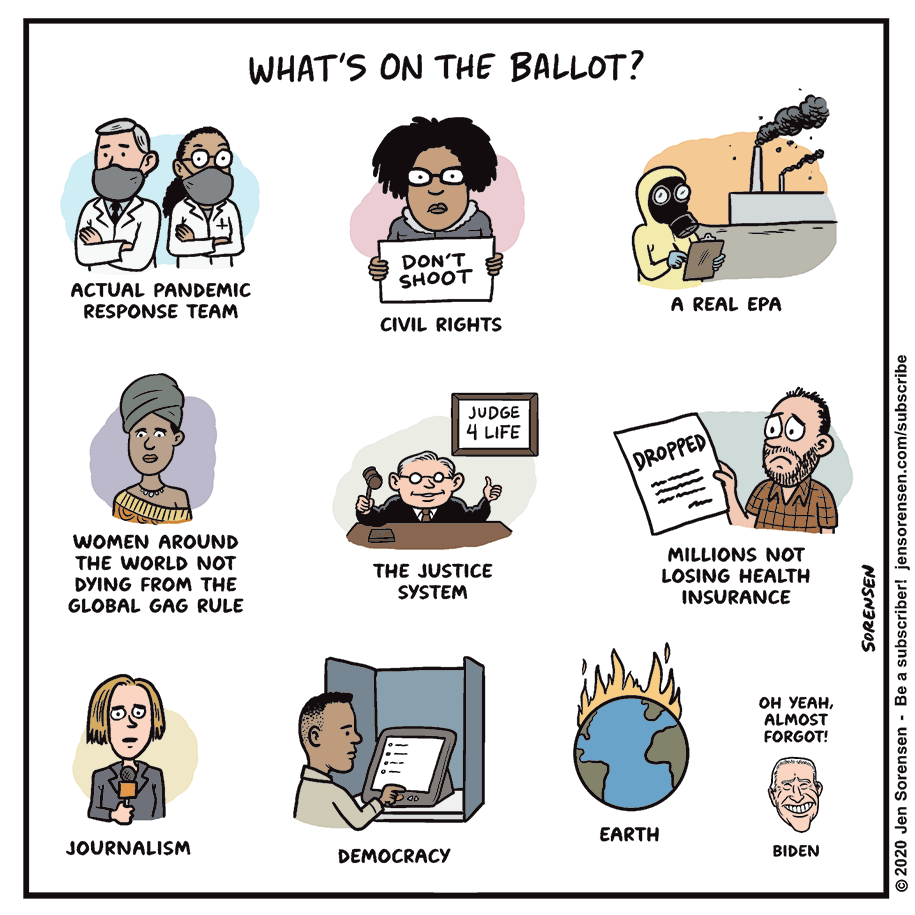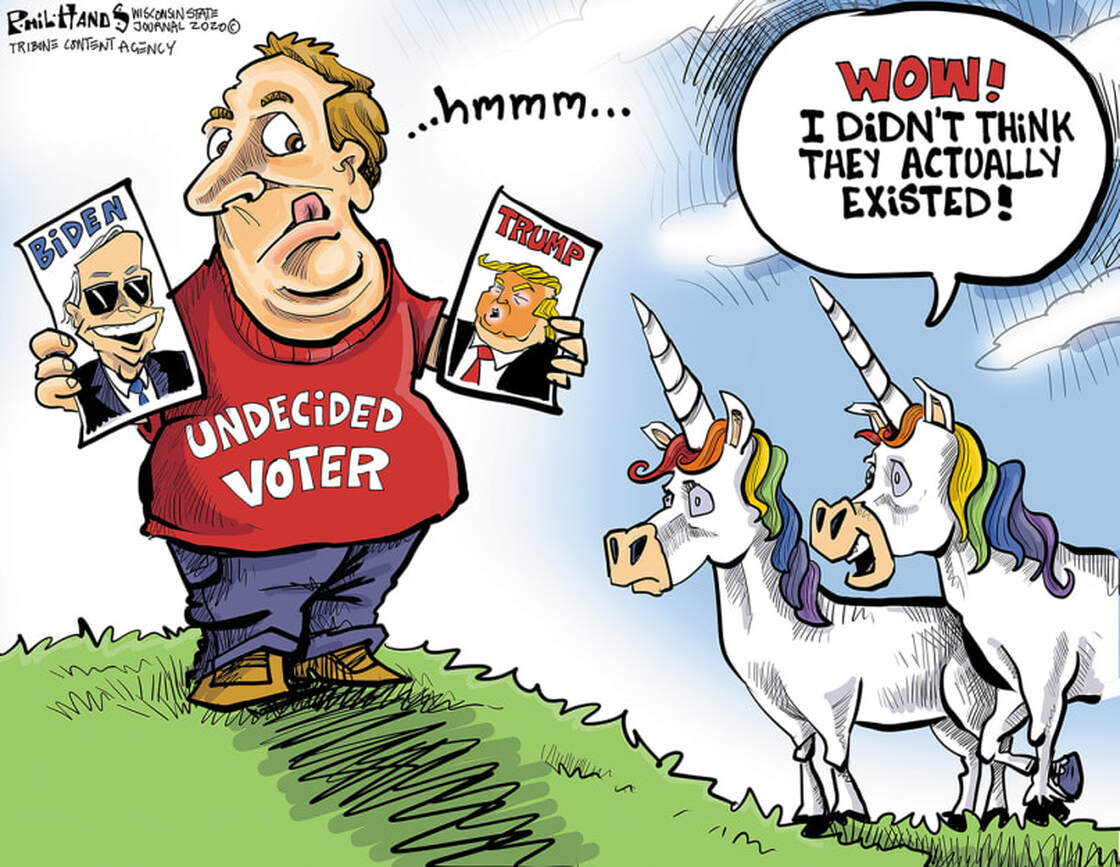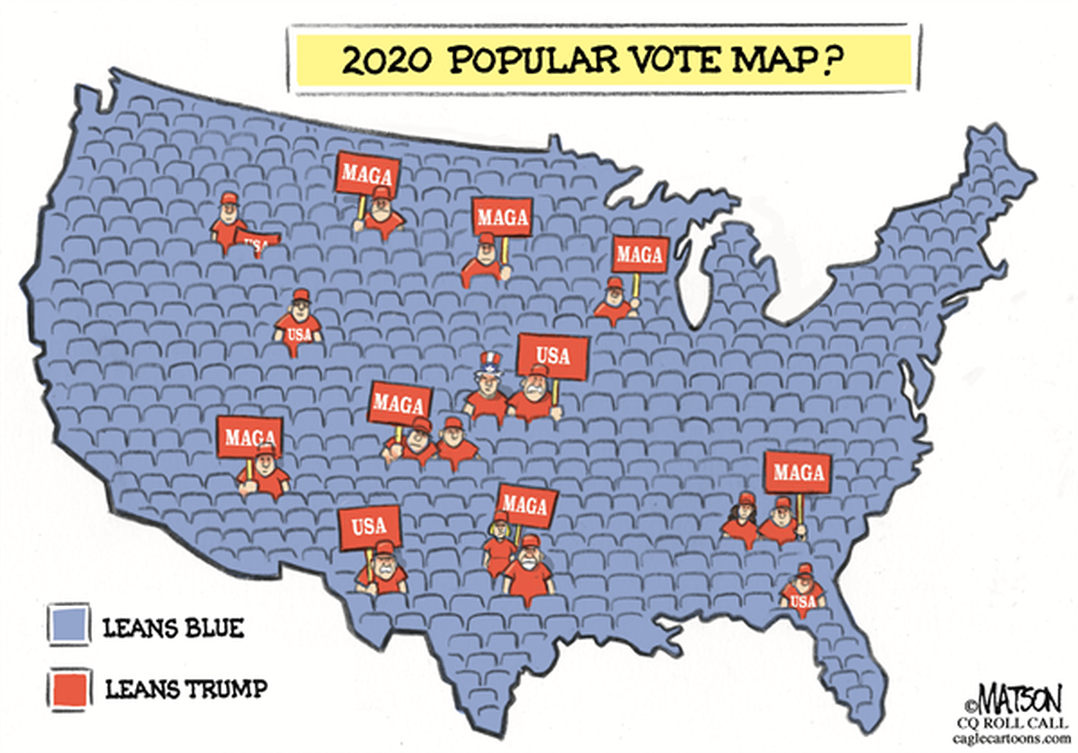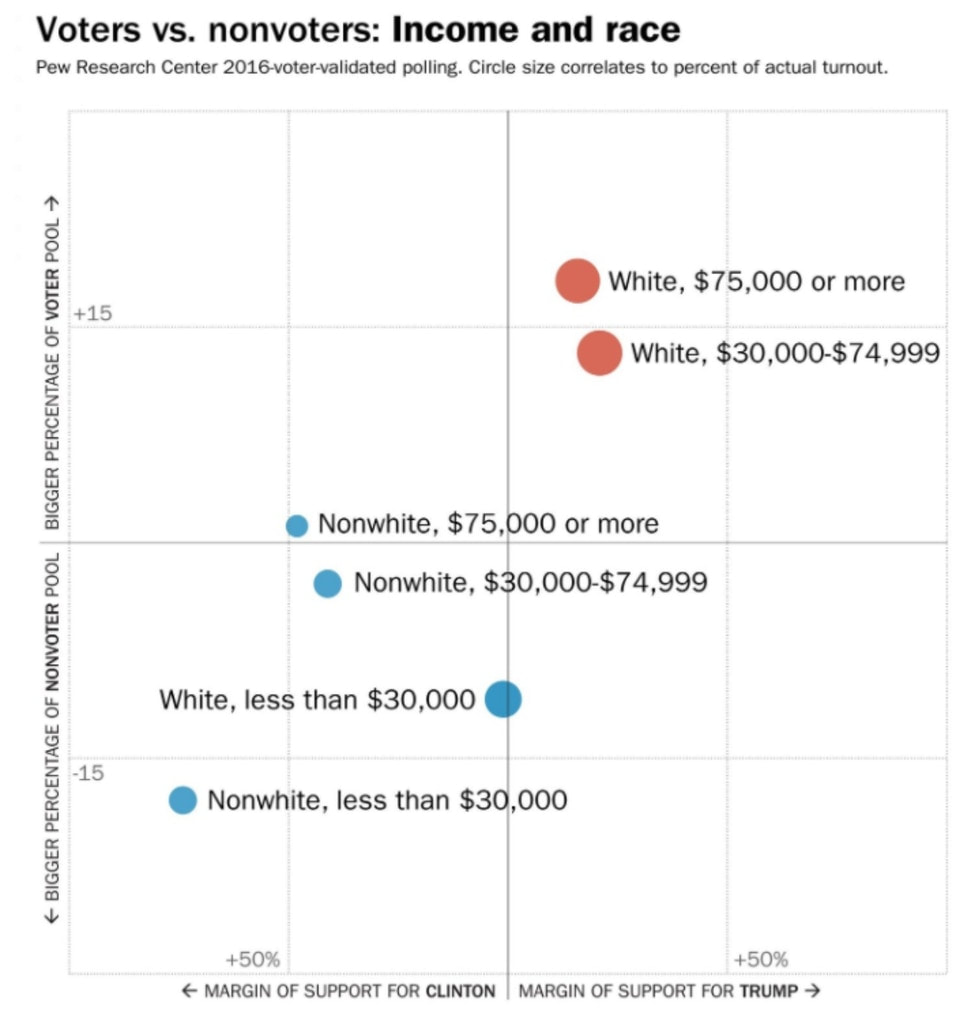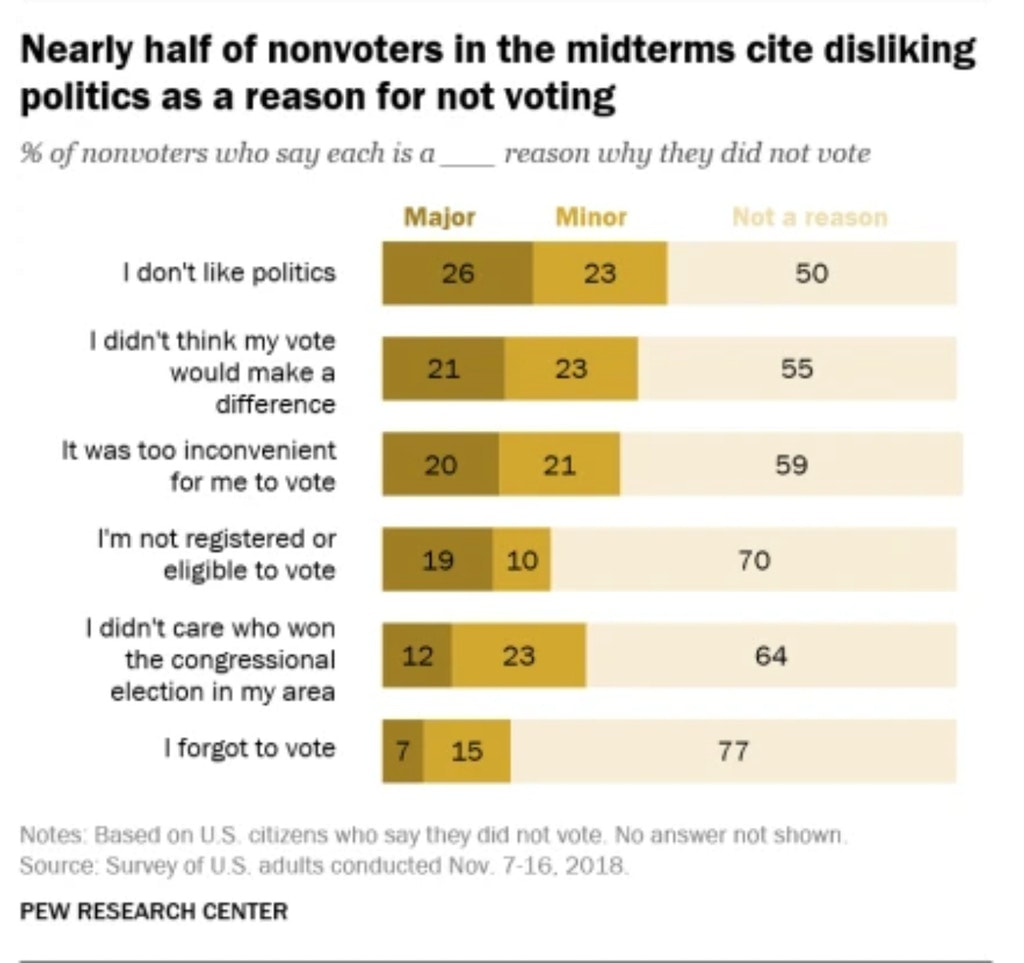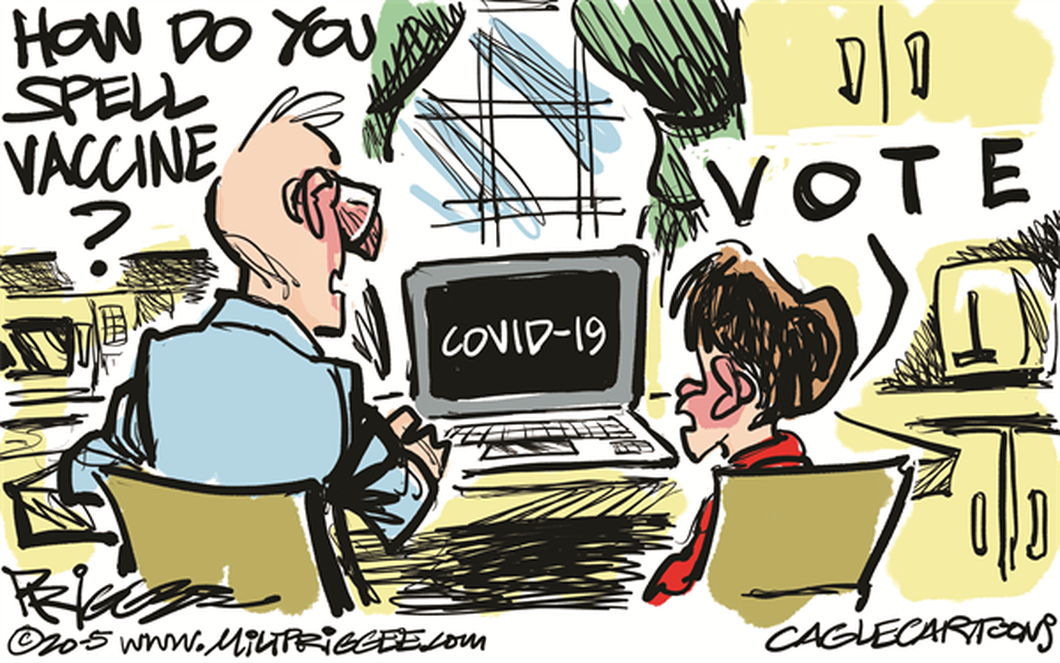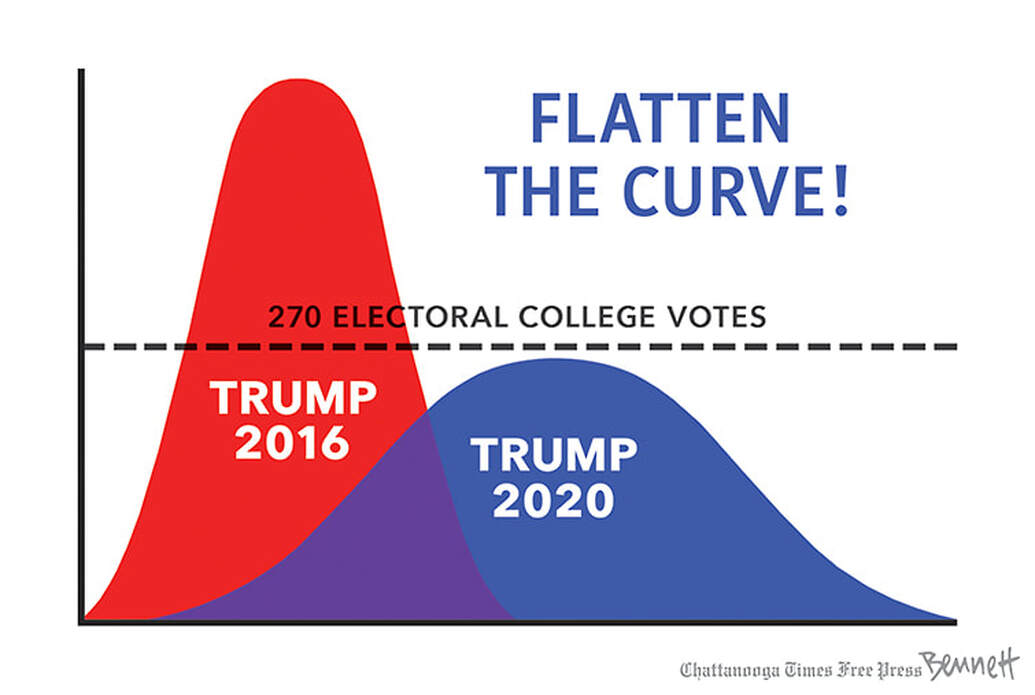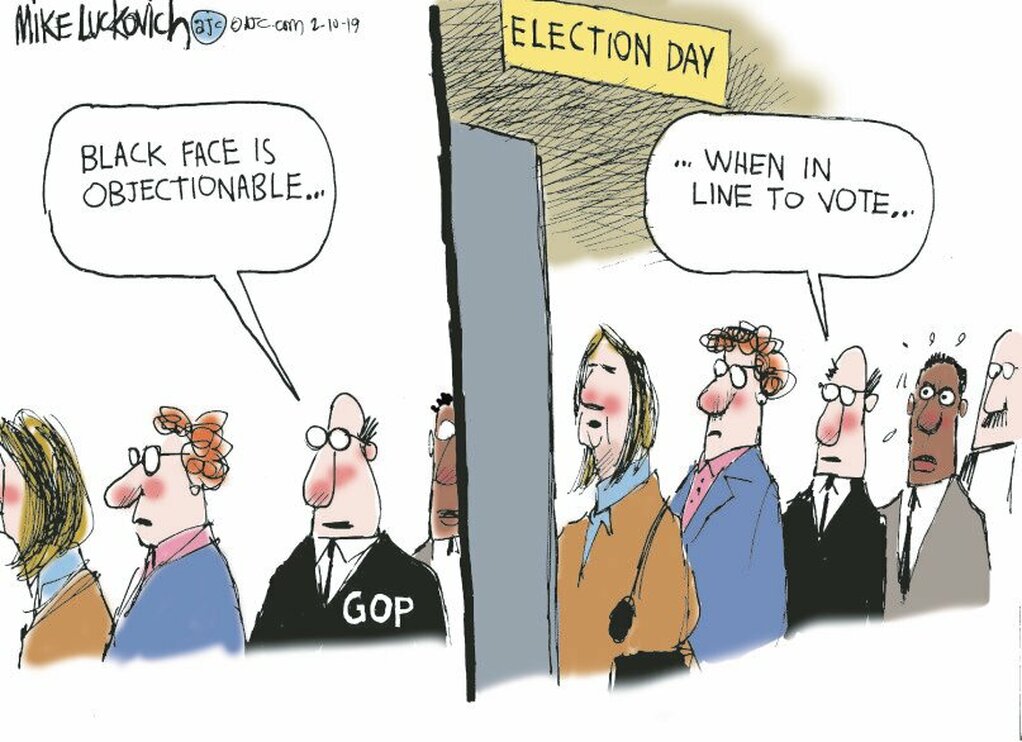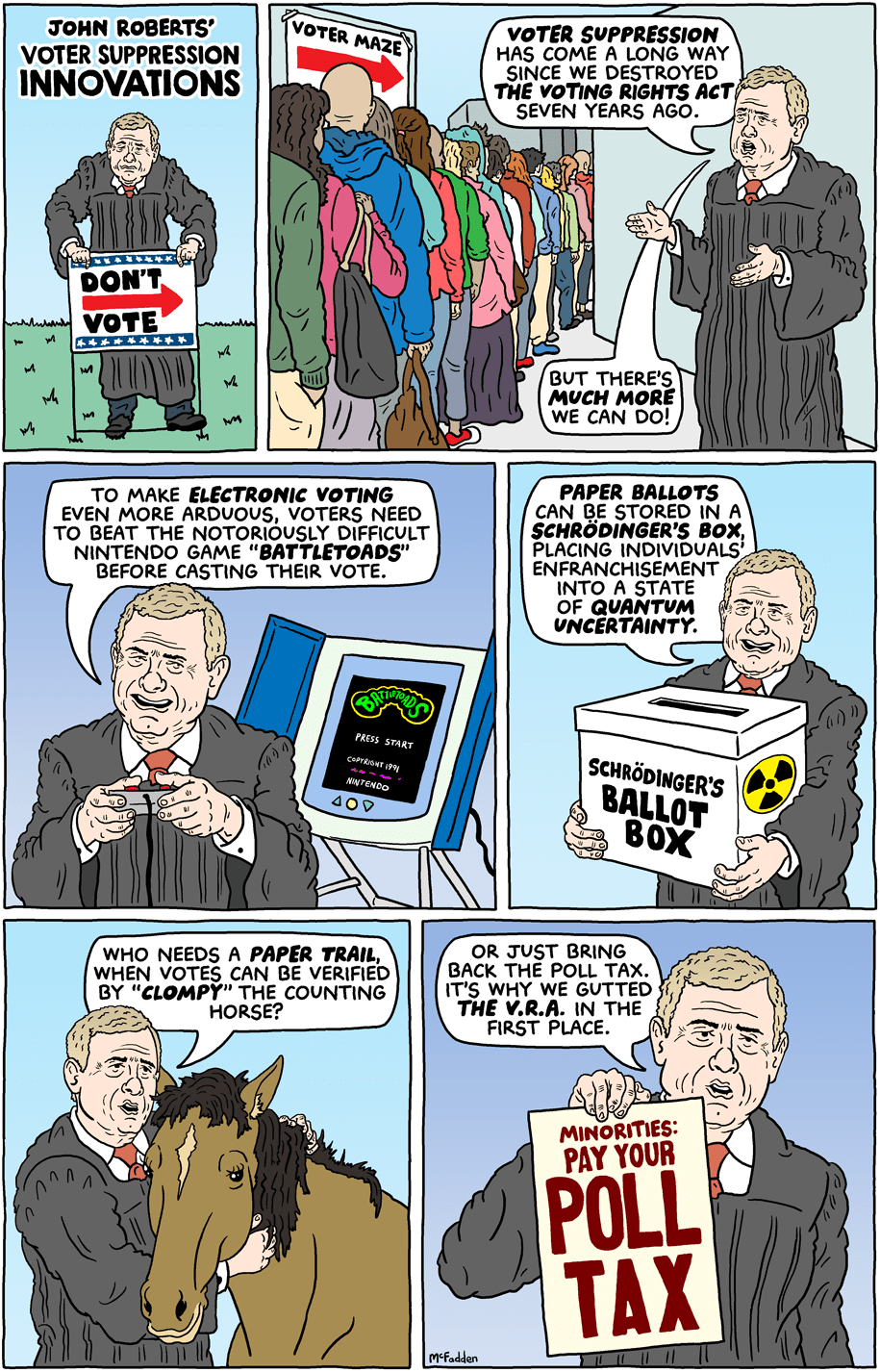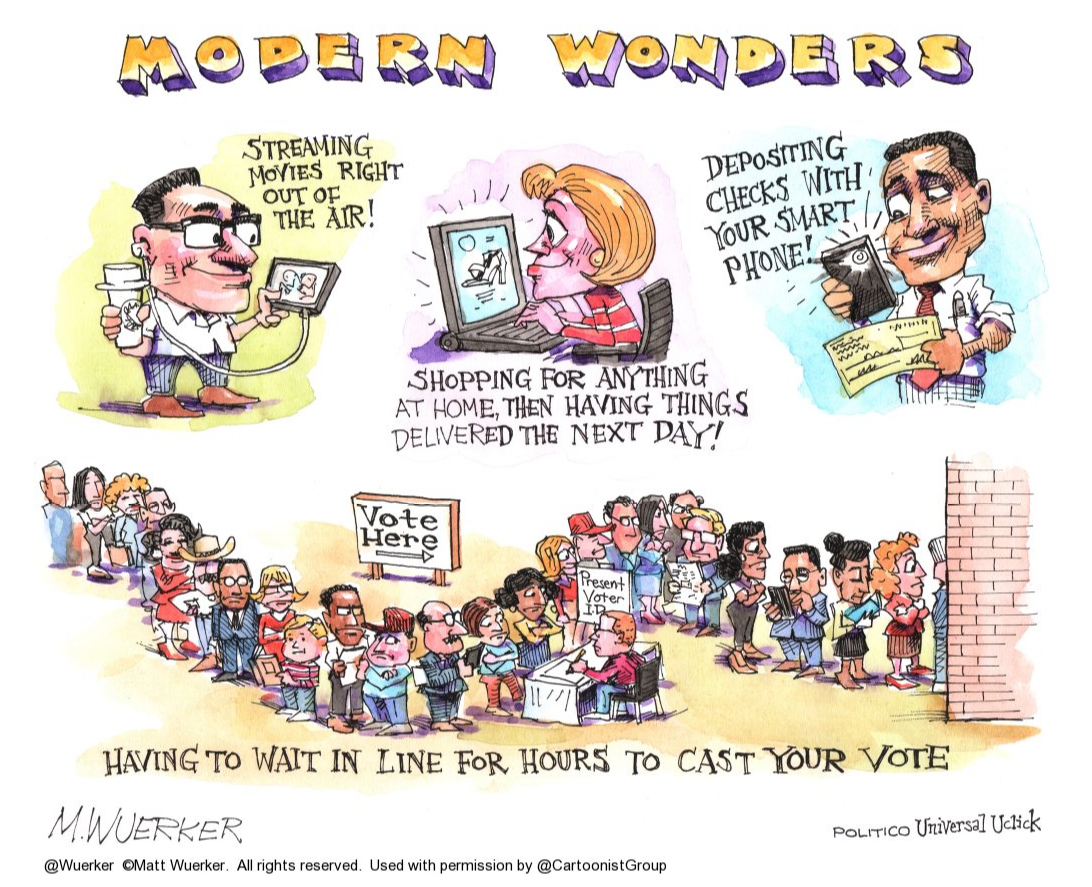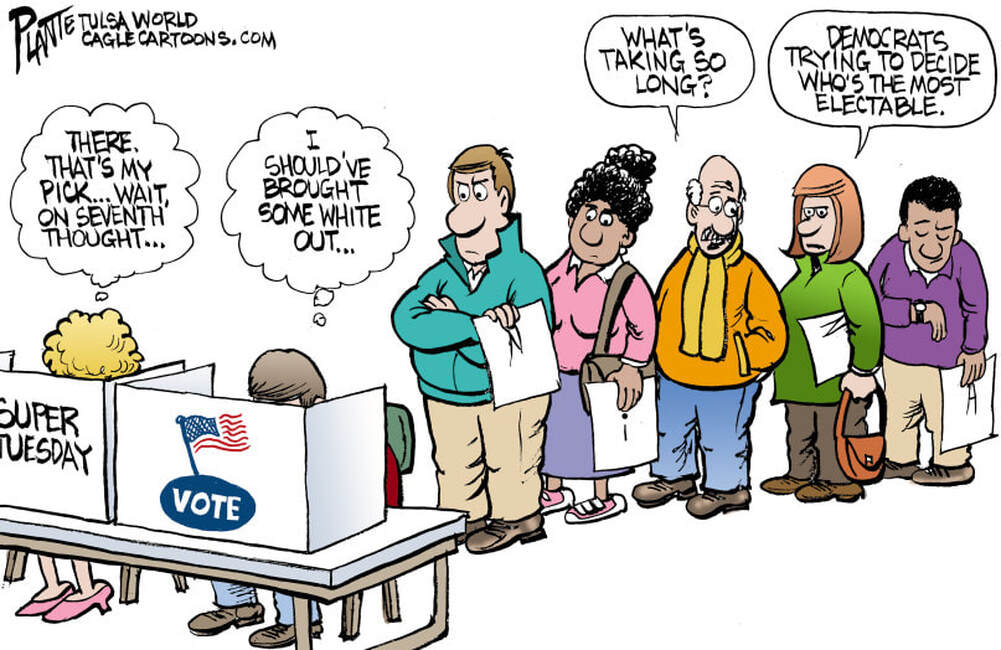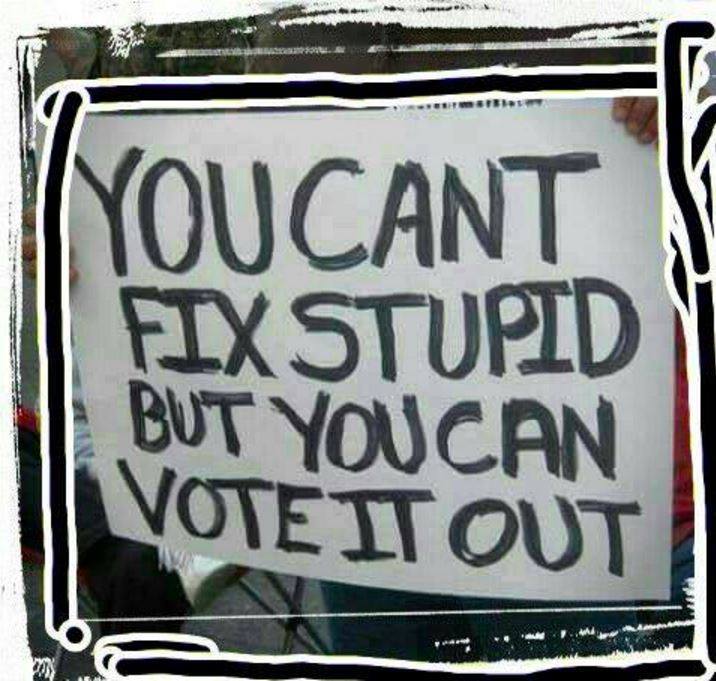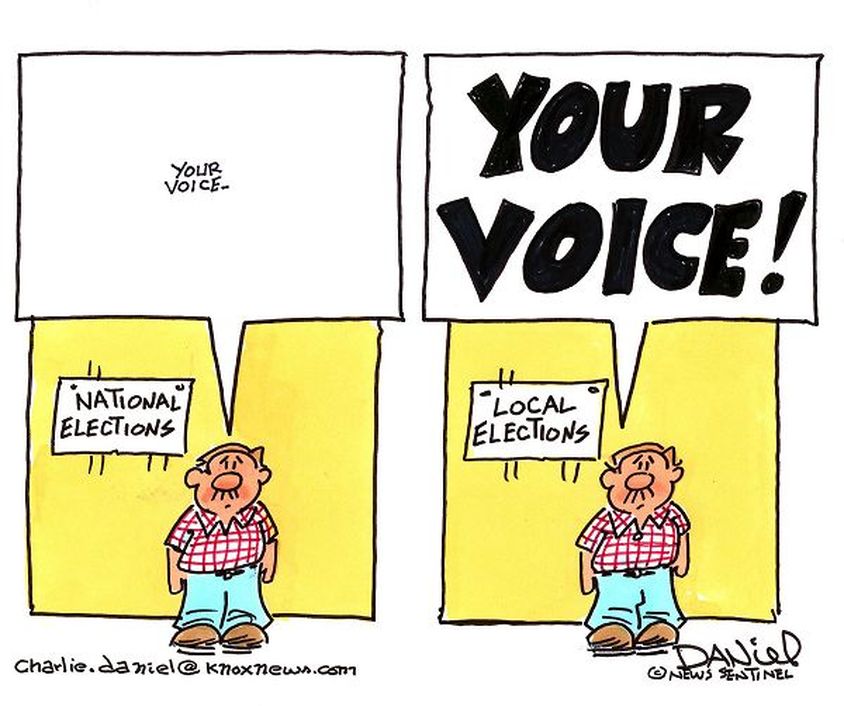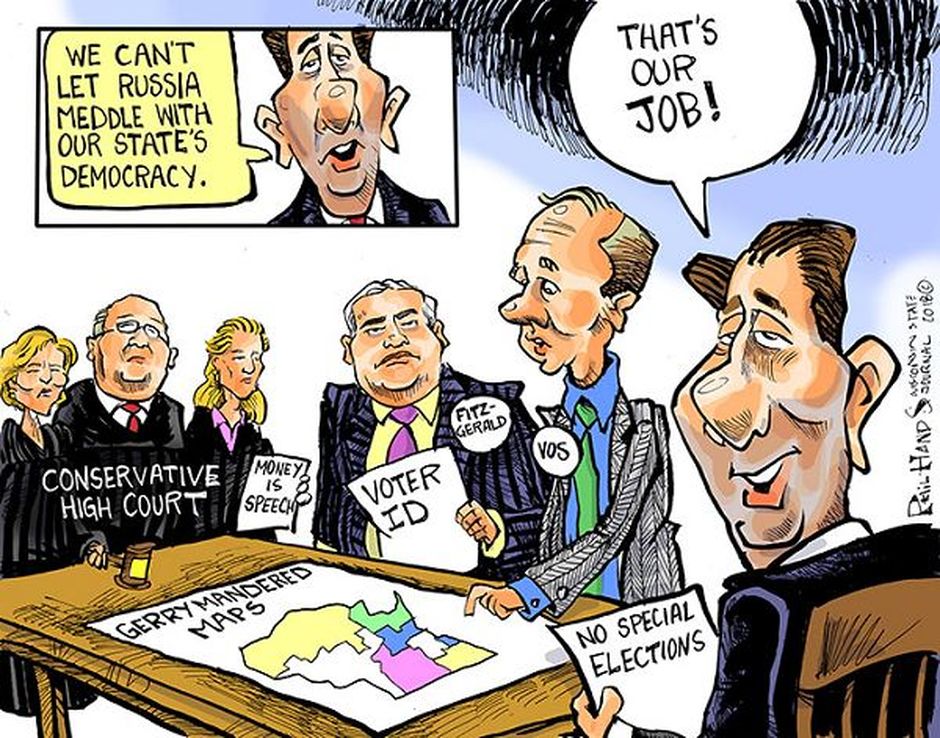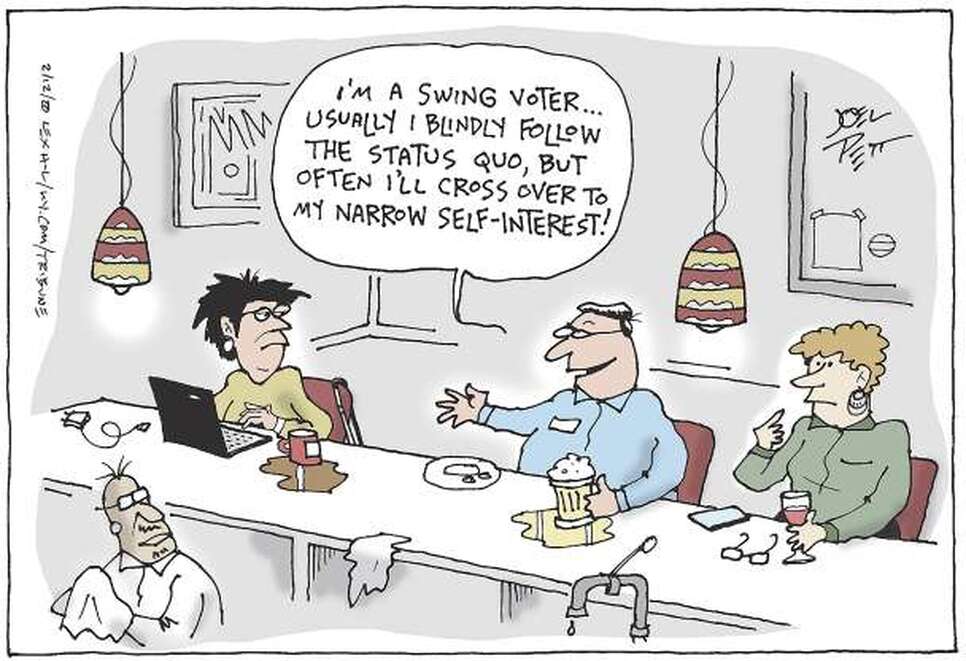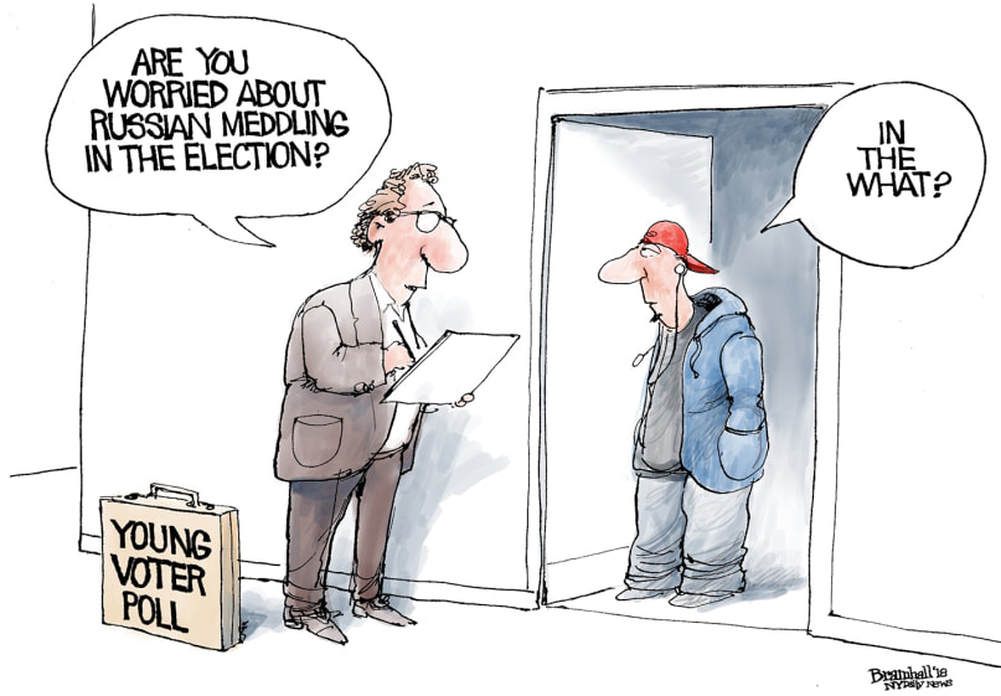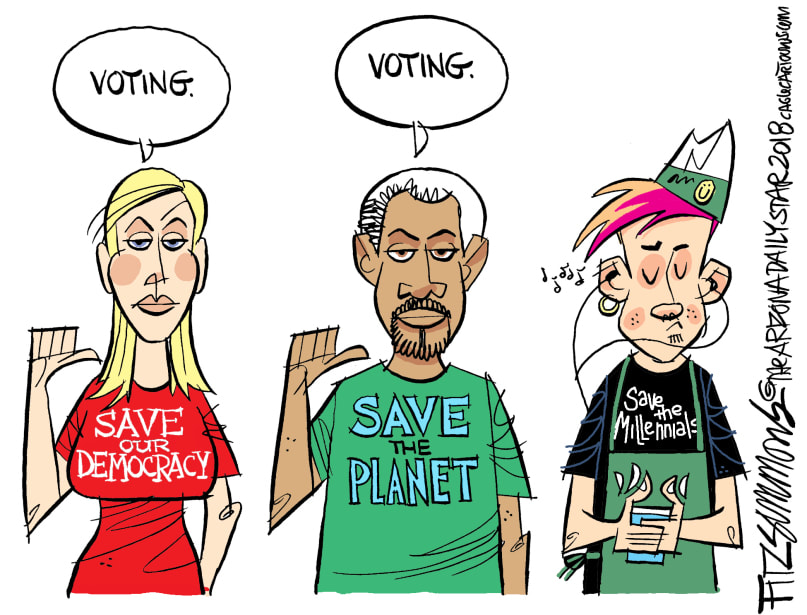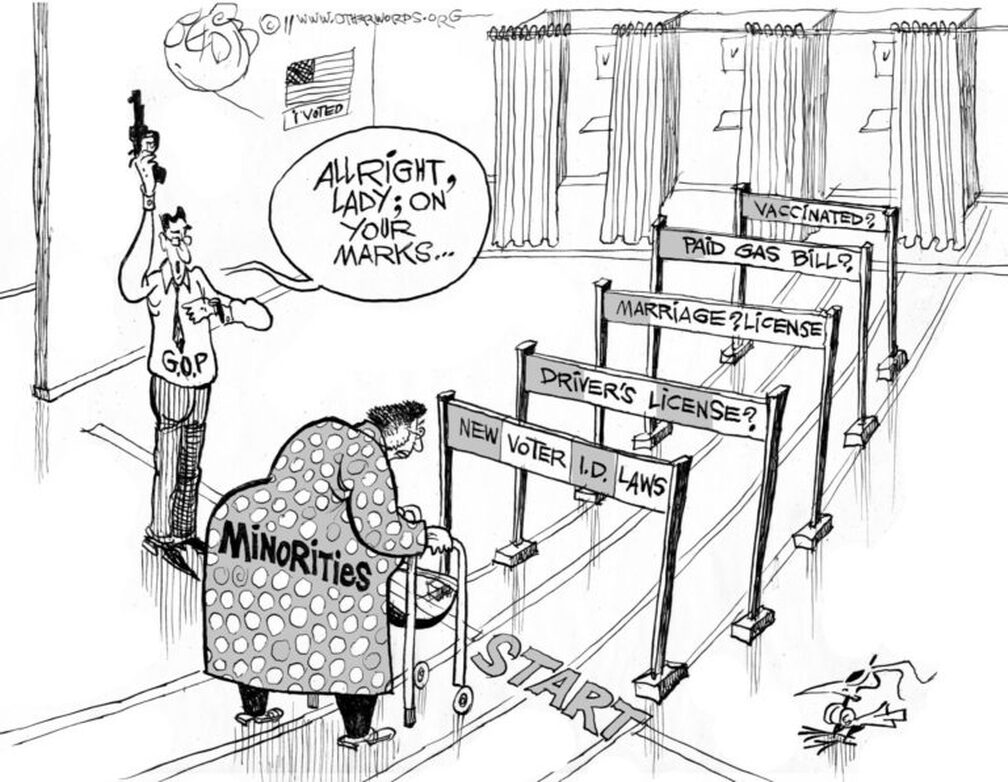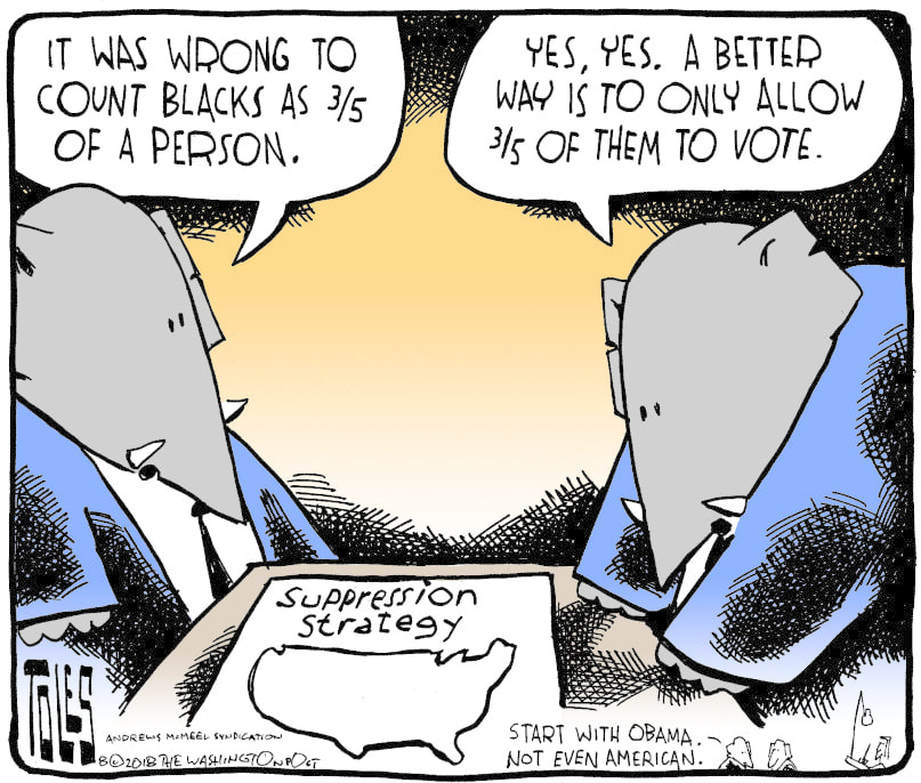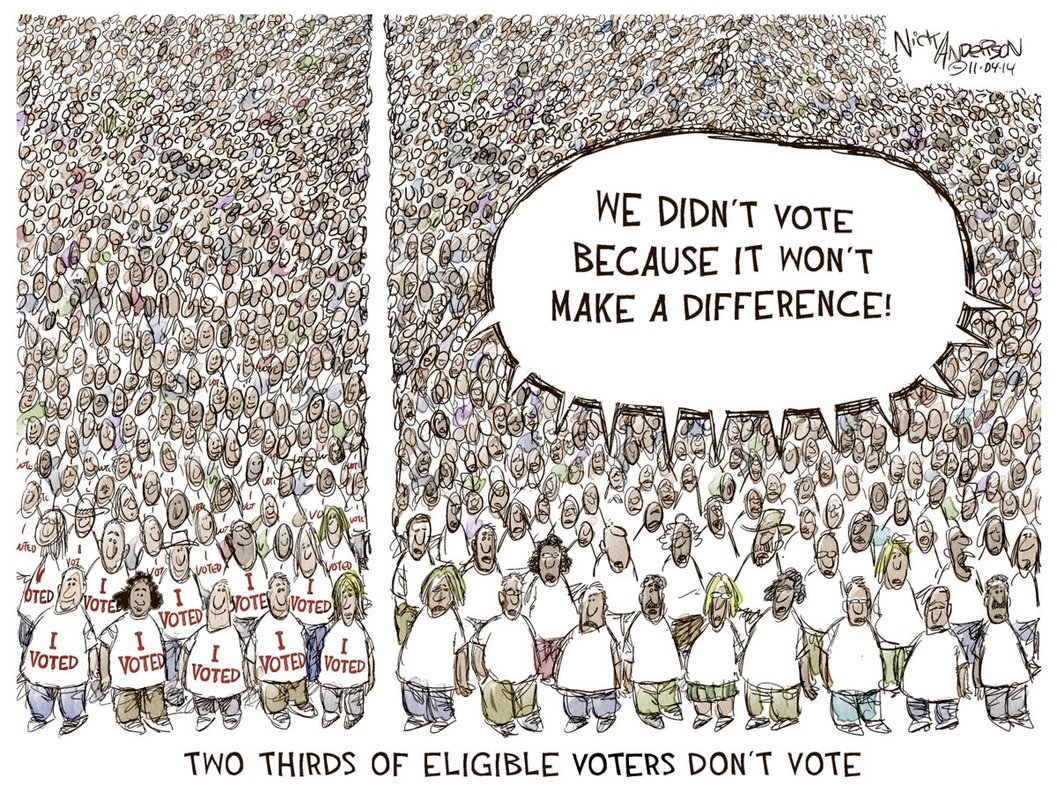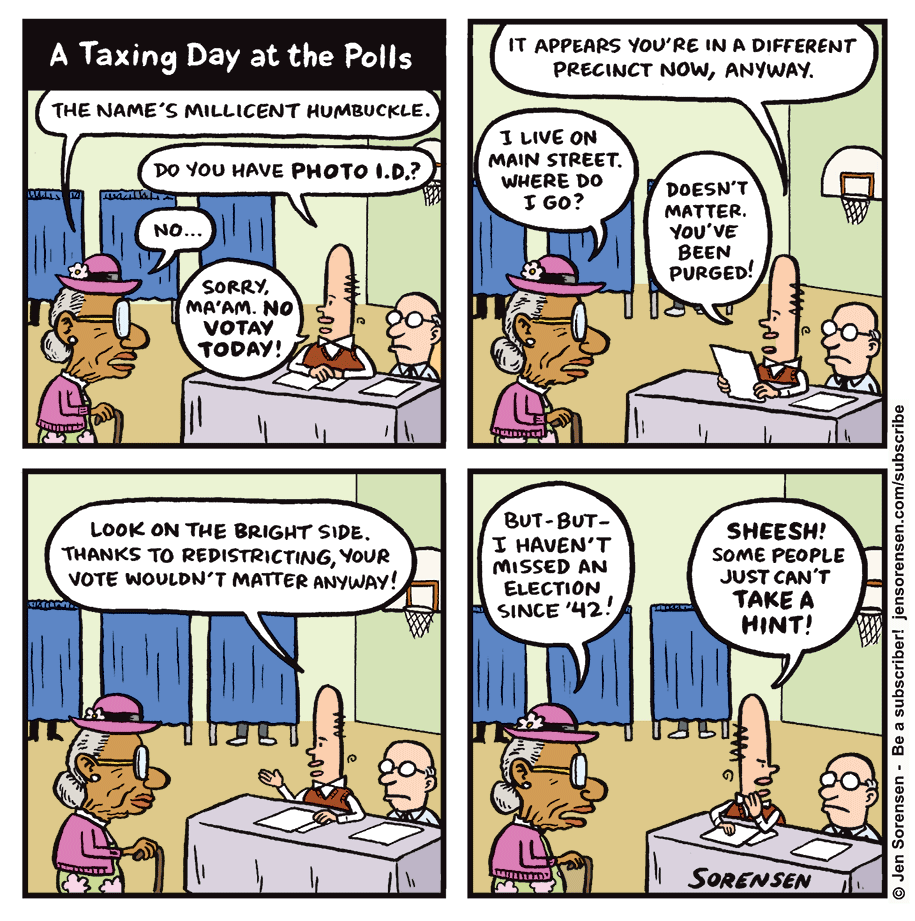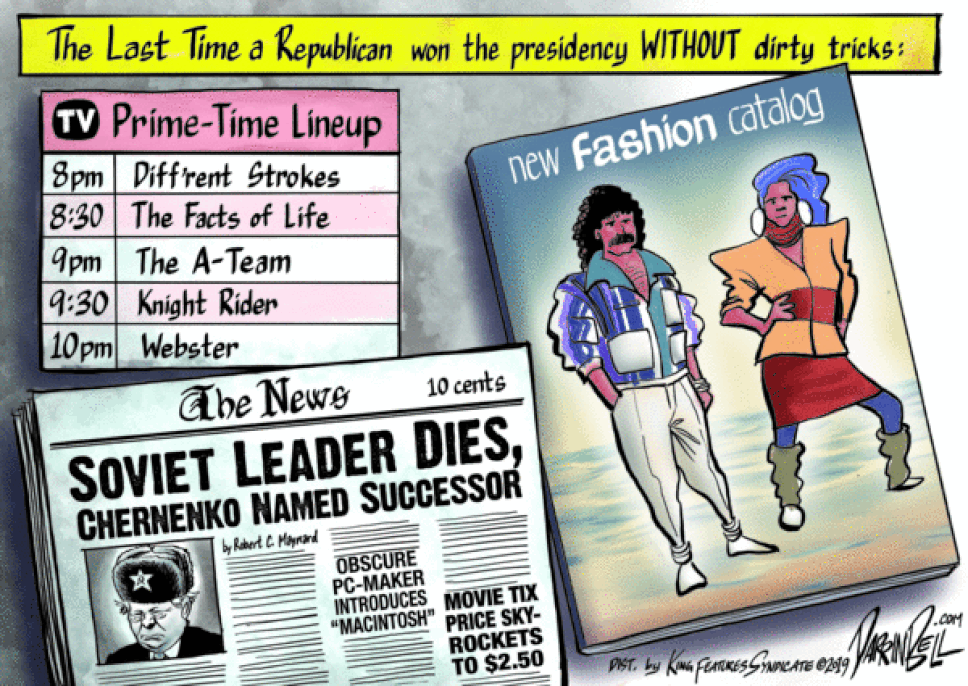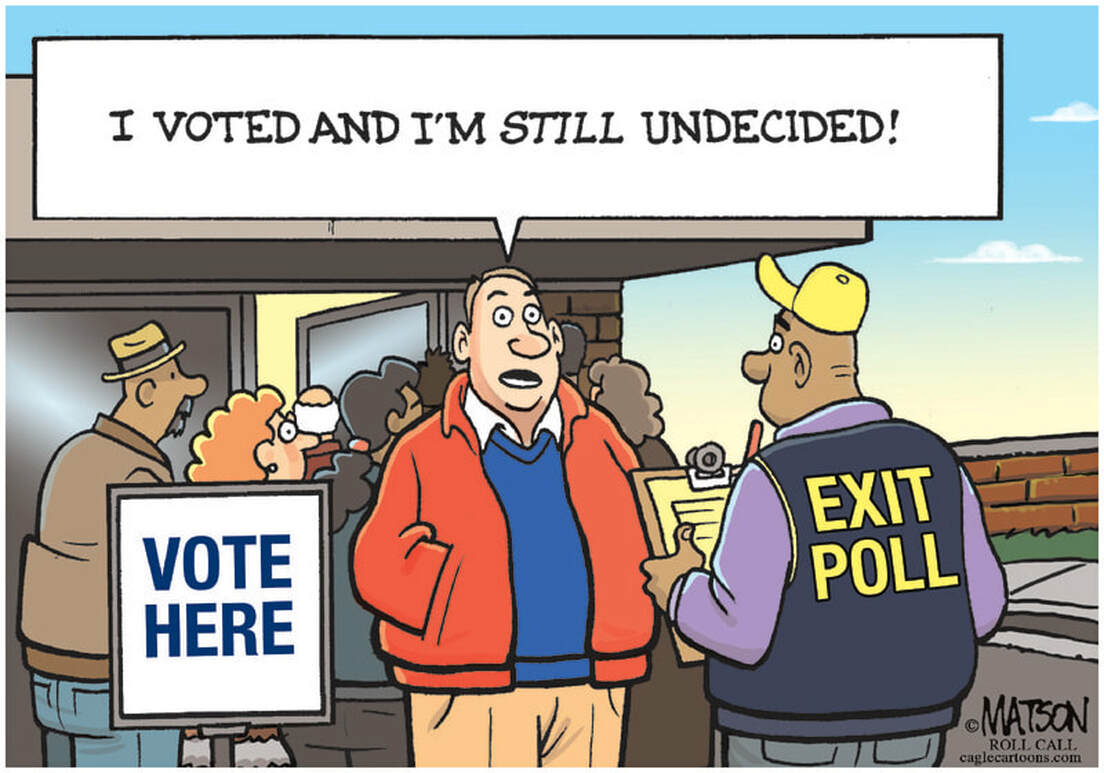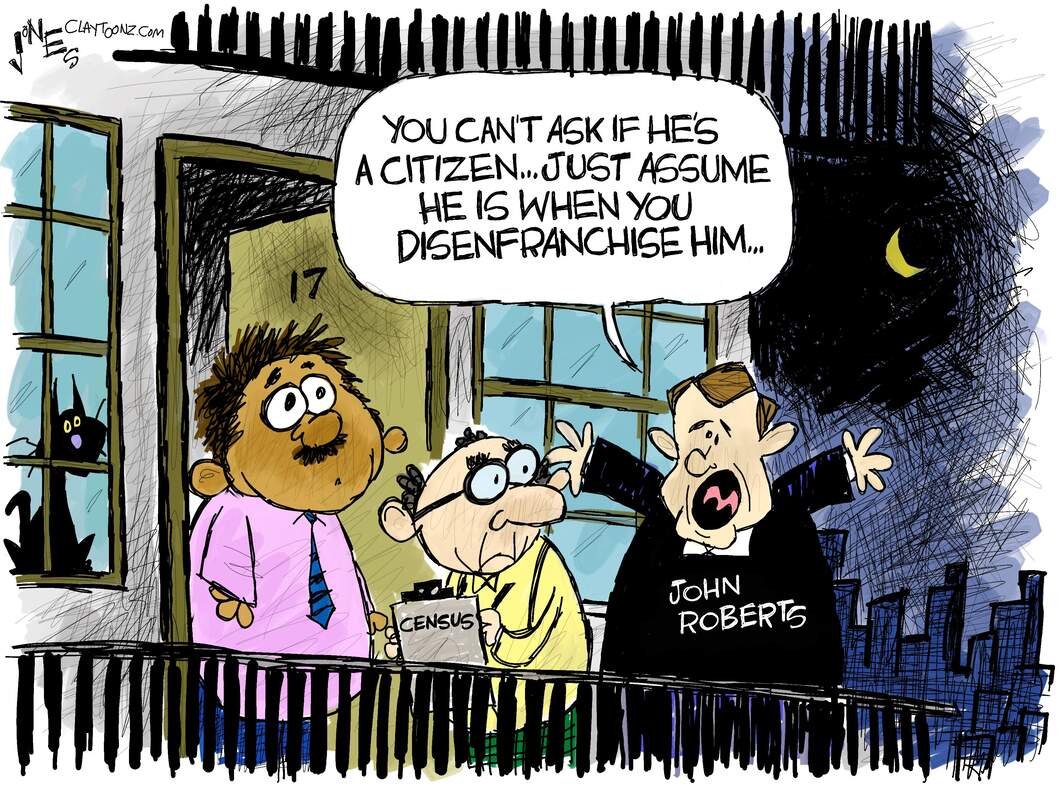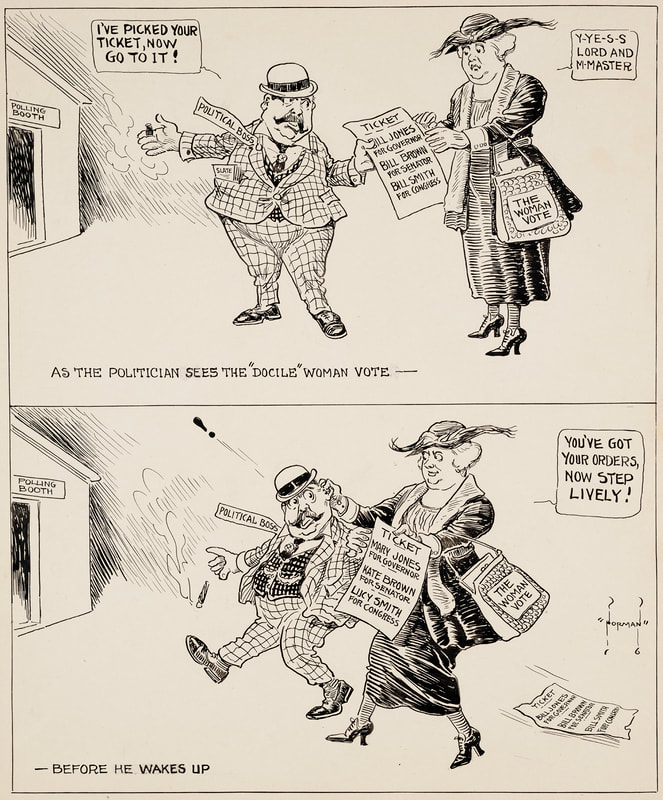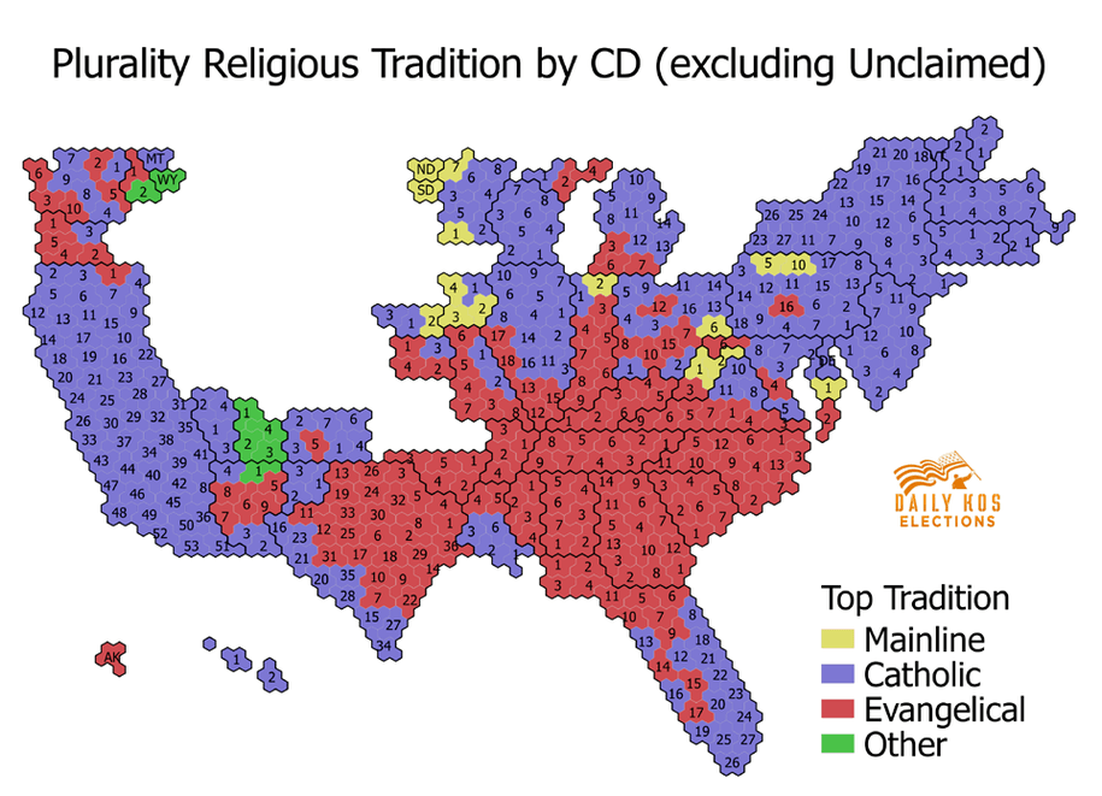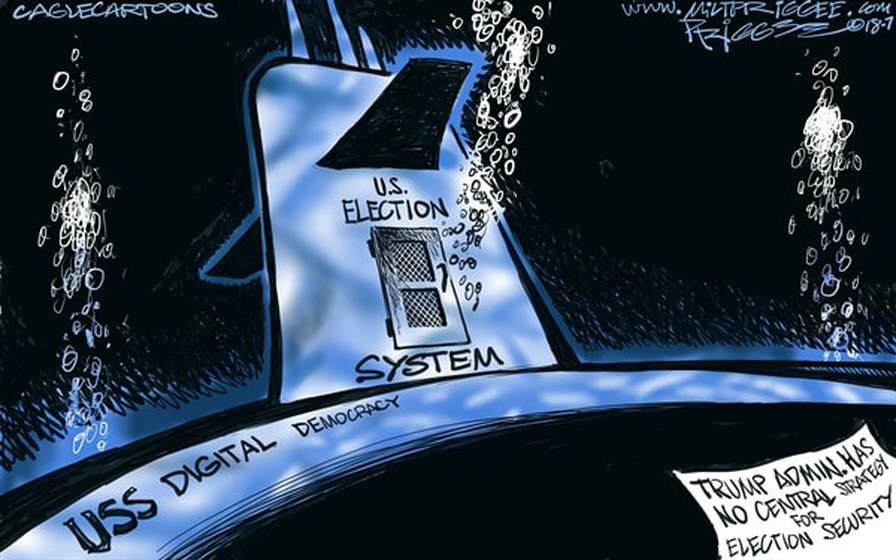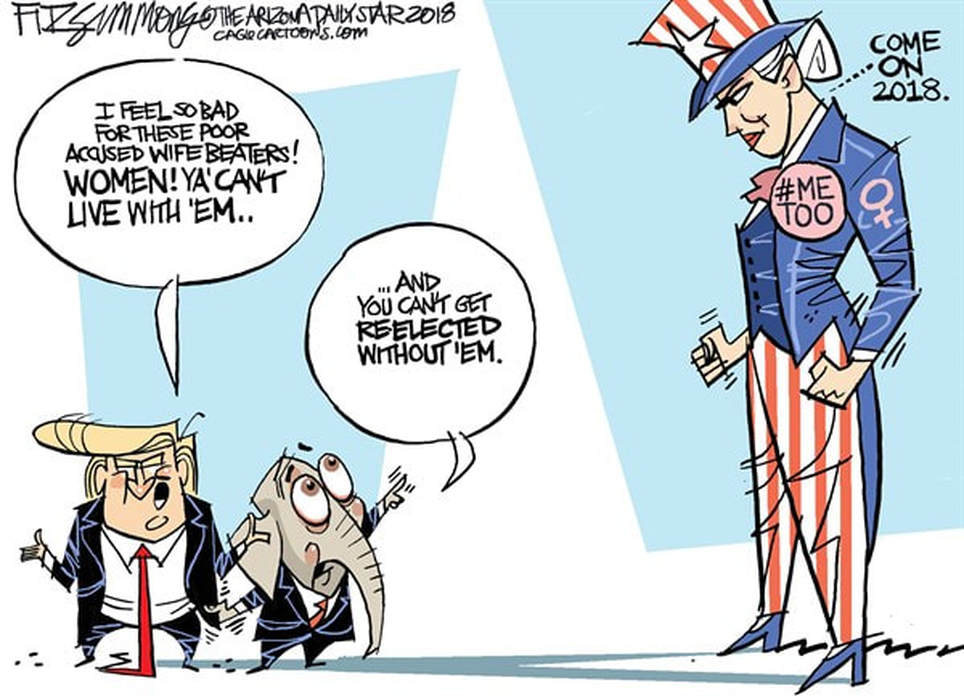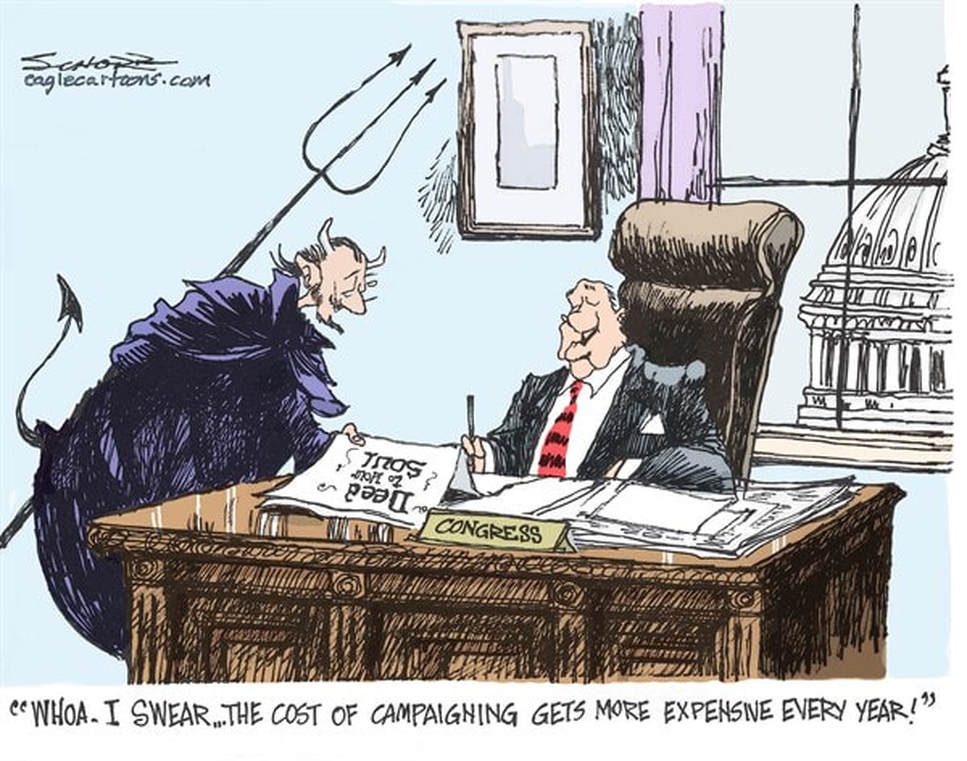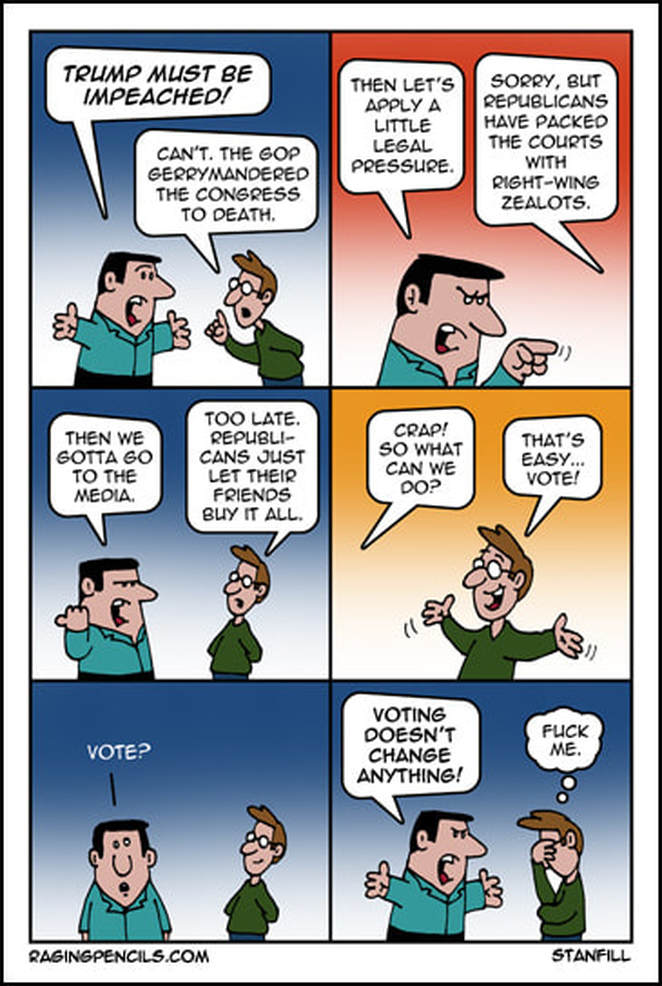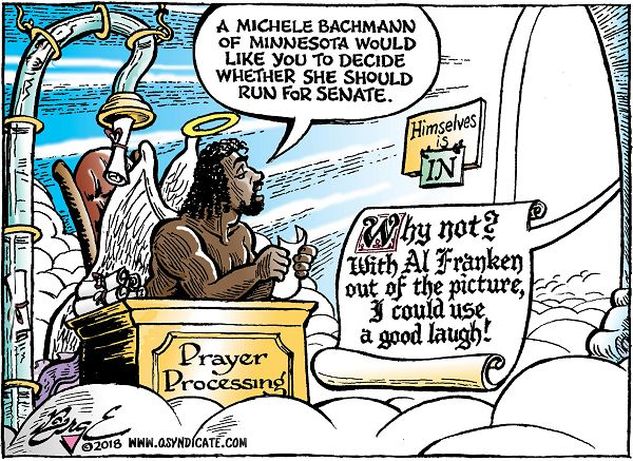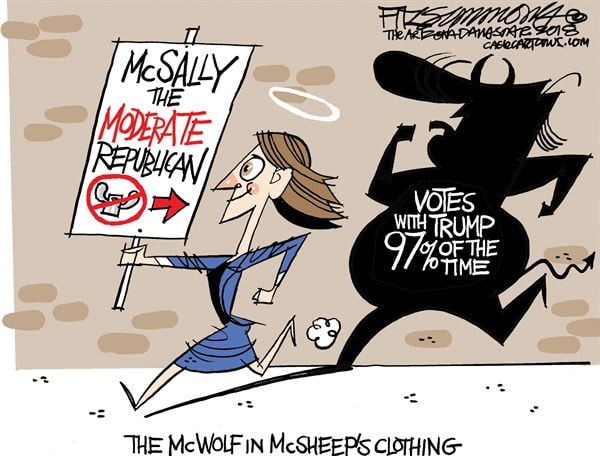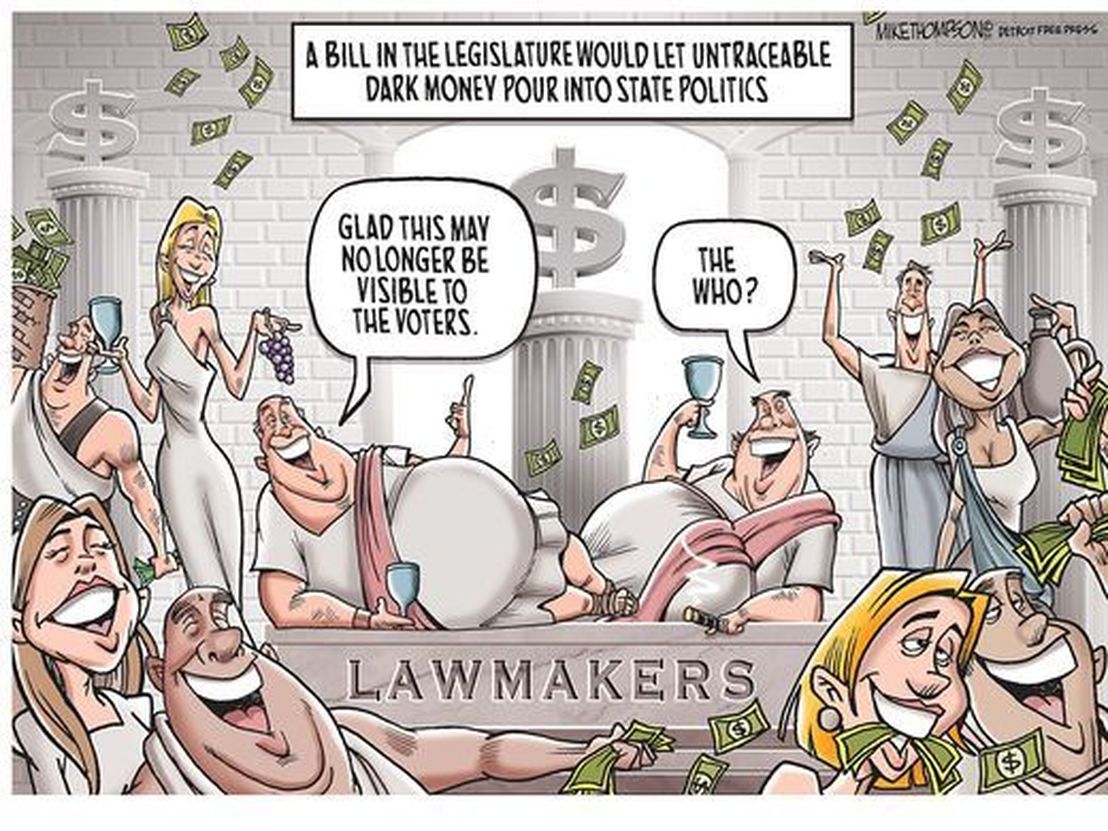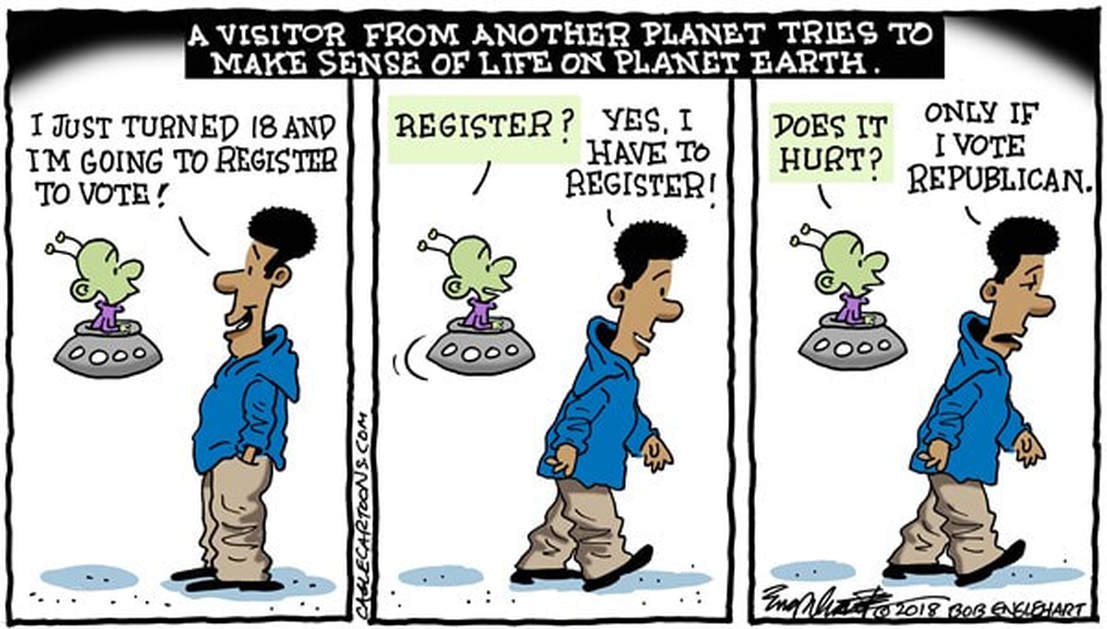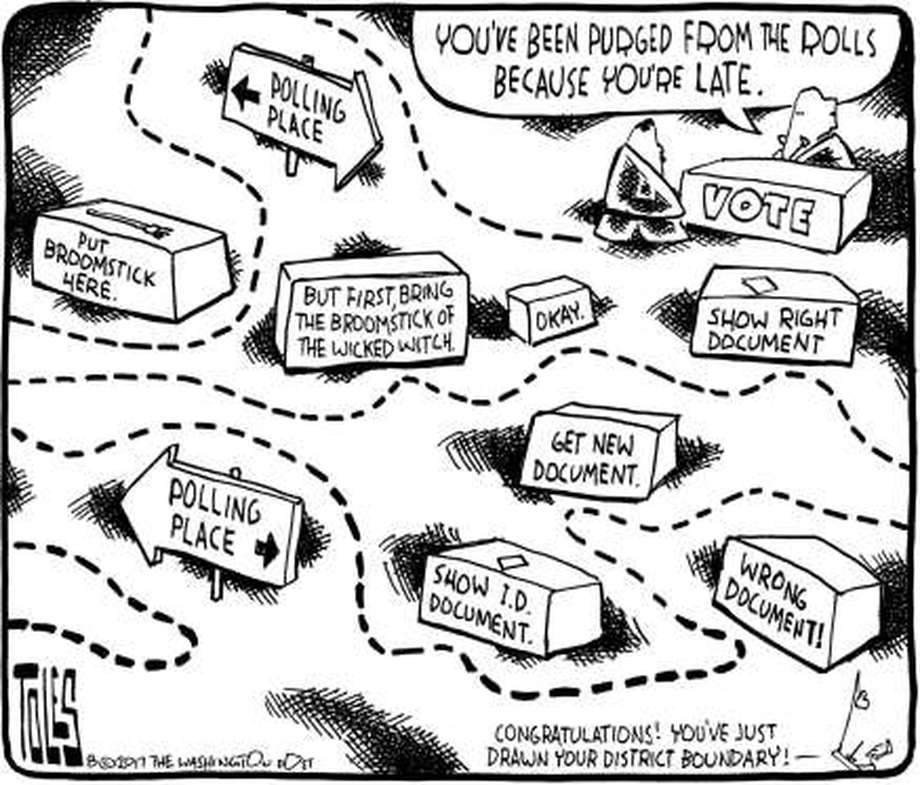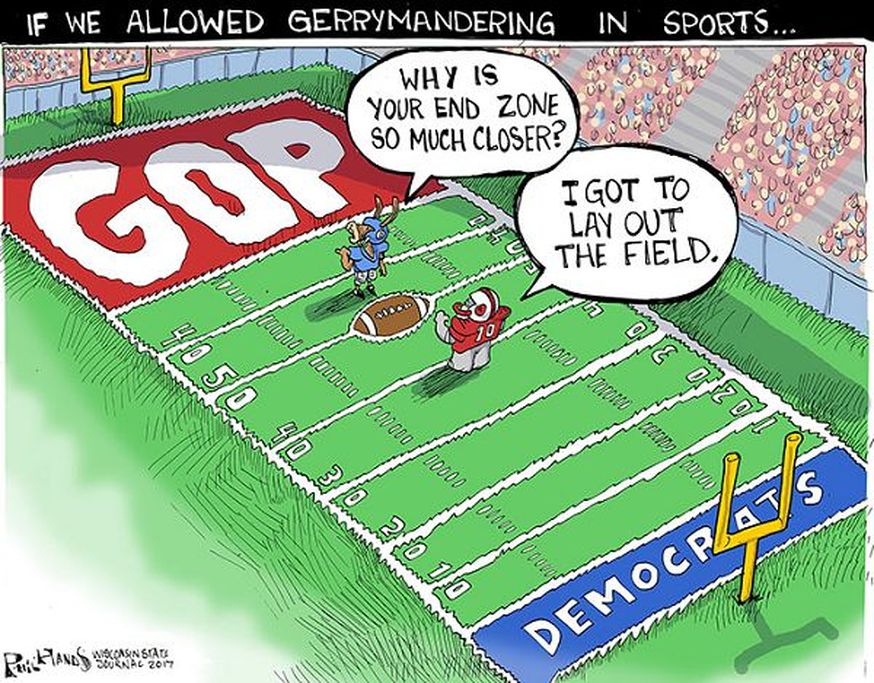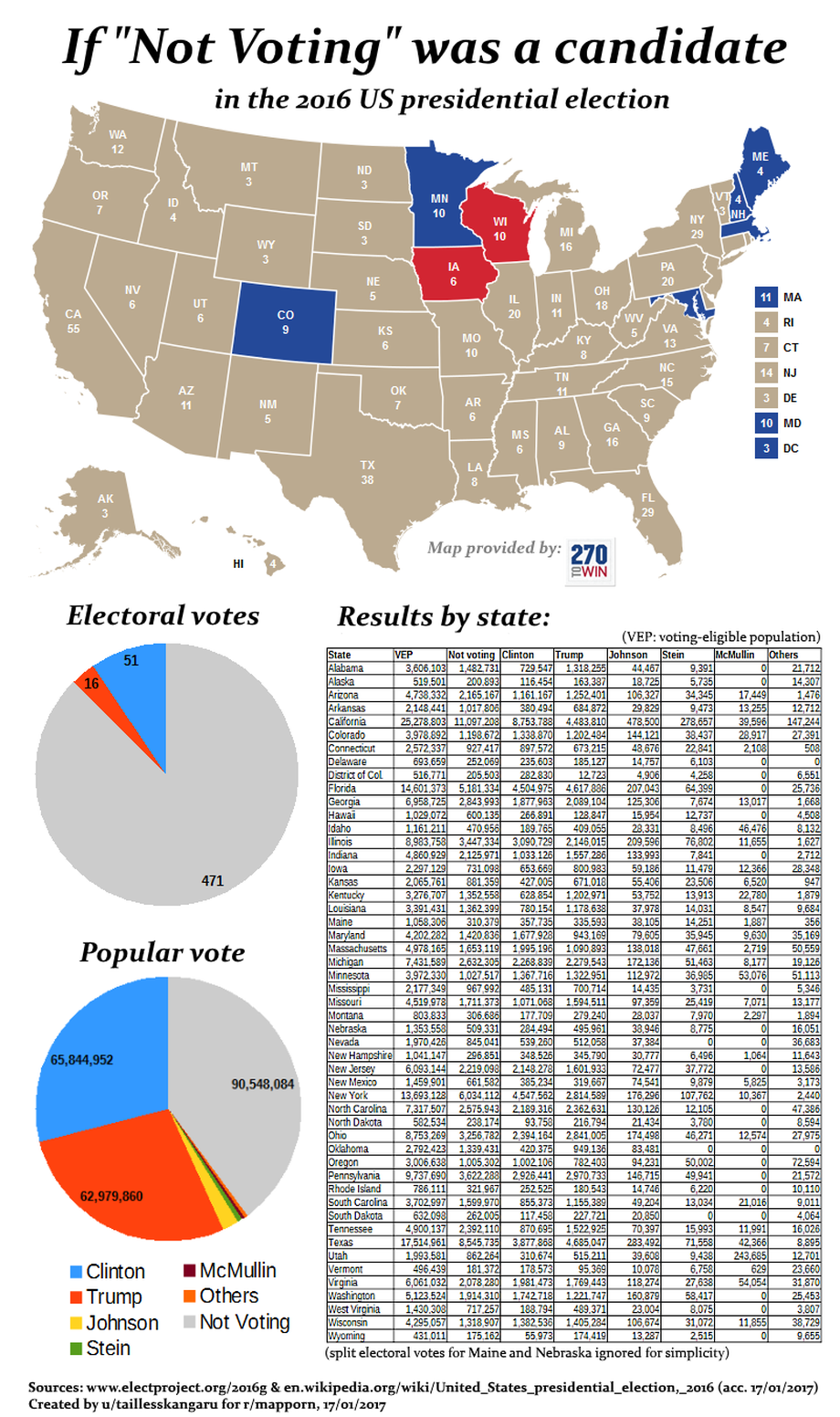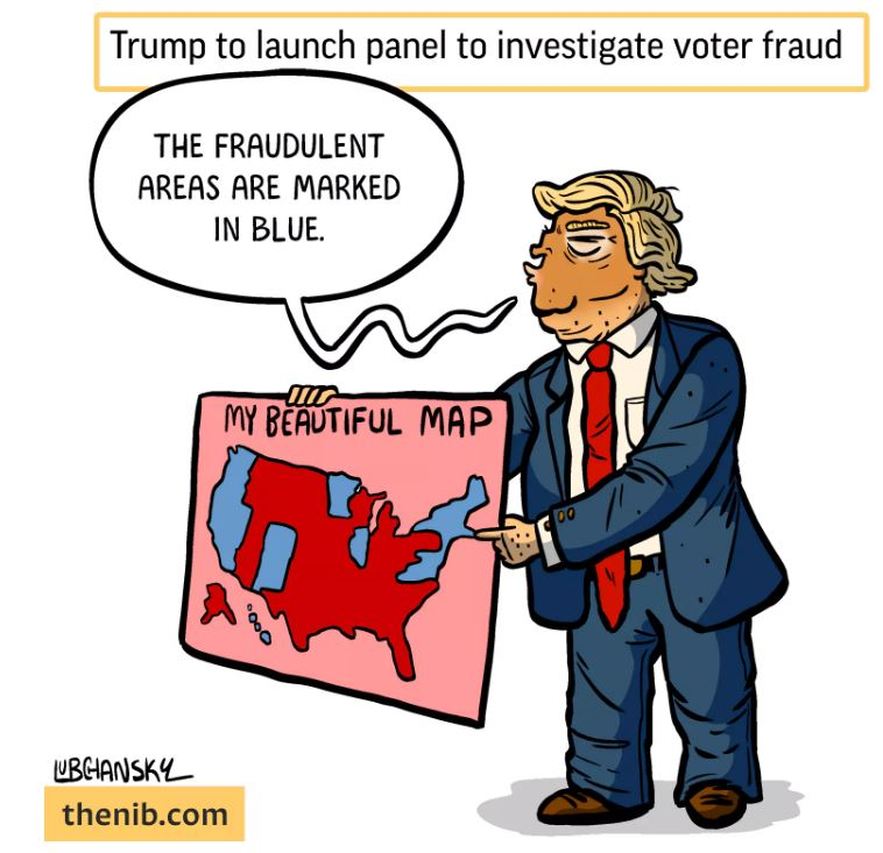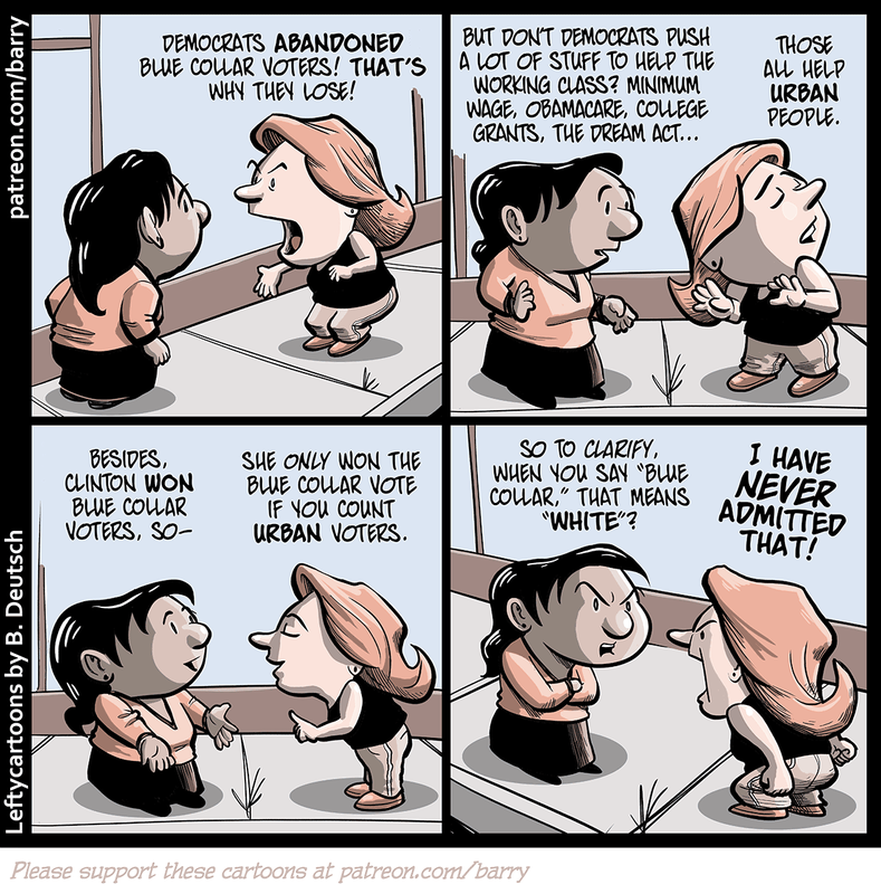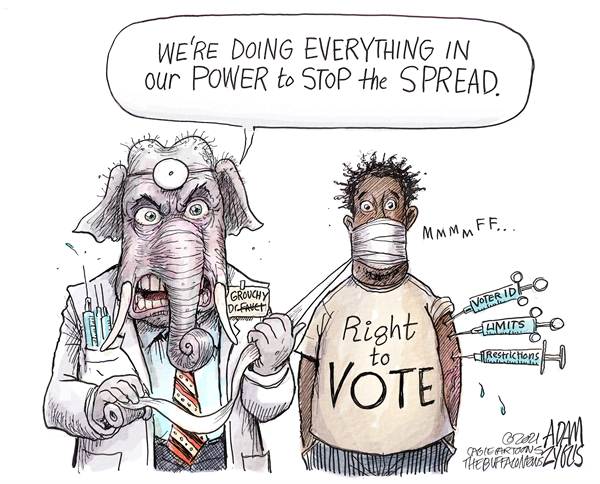TO COMMENT CLICK HERE
welcome to reality ~ TRIVIA
election news and items of interest
december 2022
Noam chomsky: “Voting should not be viewed as a form of personal self-expression or moral judgement directed in retaliation towards major party candidates who fail to reflect our values, or of a corrupt system designed to limit choices to those acceptable to corporate elites,”
what kind of democracy condones vote suppression?
headlines
*THE WEAPON REPUBLICANS POINTED AT THE HEART OF OUR DEMOCRACY
(ARTICLE BELOW)
*TEXAS VOTING RESTRICTIONS TAKE THEIR TOLL: “SORRY — NO DEMOCRAT VOTING”
(ARTICLE BELOW)
*HOW THE BLACK-JEWISH ALLIANCE CHANGED AMERICA — AND TODAY'S STRUGGLE FOR VOTING RIGHTS(ARTICLE BELOW)
*Texas leans on new voting law to reject thousands of primary ballots
(ARTICLE BELOW)
*Democrats again lament their weakness in rural areas, but they don’t have an answer to the problem(ARTICLE BELOW)
*SECRET DONORS TO NONPROFIT PUSHING TRUMP’S “BIG LIE” ELECTION CONSPIRACY REVEALED
(ARTICLE BELOW)
*YES, 55 PERCENT OF WHITE WOMEN VOTED FOR TRUMP. NO, I’M NOT SURPRISED.
(ARTICLE BELOW)
*WHY SO MANY WHITE WOMEN VOTED FOR TRUMP
(ARTICLE BELOW)
*OFFICIALS PROVE THAT TRUMP’S CLAIMS ABOUT MAIL-IN-BALLOTS ARE ALL LIES
(ARTICLE BELOW)
*10 Voter Fraud Lies Debunked
(EXCERPT BELOW)
*Nonvoters Are Not Privileged. They Are Disproportionately Lower-Income, Non-White and Dissatisfied With The Two Parties.(excerpt below)
*Why ‘Don’t-Care Democrats’ May Re-Elect Trump
(ARTICLE BELOW)
*It's 2020 – why are black university students still fighting for the right to vote?
(ARTICLE BELOW)
*The Iowa Caucus Has Choked Itself to Death at Last
(ARTICLE BELOW)
*Arizona Republicans discriminated against minority voters, court rules
(ARTICLE BELOW)
*Here are the real reasons so many people don’t vote
(ARTICLE BELOW)
*Voter Suppression Exposes the Paradox of Black Citizenship in a Racist Society
(ARTICLE BELOW)
*GERRYMANDER GURU'S SECRET FILES: HE USED RACIAL DATA TO DISENFRANCHISE BLACK VOTERS(ARTICLE BELOW)
*No, both sides are not the same
(ARTICLE BELOW)
*Political Fundraising Has a Big, Nasty Secret
(ARTICLE BELOW)
*A List -- Why A Majority of Whites No Longer Vote Democratic at the Presidential Level
(ARTICLE BELOW)
*LAWSUIT CALLS MISSISSIPPI'S WAY OF CHOOSING GOVERNORS RACIST
(ARTICLE BELOW)
*WHITE WOMEN ARE HELPING STATES PASS ABORTION RESTRICTIONS
(ARTICLE BELOW)
MAP OF THE HYPOCRITES!!!
THE DAILY KOS ELECTIONS GUIDE TO THE NATION'S RELIGIOUS POPULATIONS, BY CONGRESSIONAL DISTRICT(ARTICLE BELOW)
funnies(at the end)
*PART 1: GOP RACIAL GERRYMANDERING MASTERMIND PARTICIPATED IN REDISTRICTING IN MORE STATES THAN PREVIOUSLY KNOWN, FILES REVEAL
THOMAS HOFELLER AND GOP STRATEGISTS EXPERIMENTED WITH USING RACE AS THE PRIMARY FACTOR IN DRAWING DISTRICTS IN ALABAMA, FLORIDA, AND WEST VIRGINIA.
*PART 2“WORTH THIS INVESTMENT”: MEMOS REVEAL THE SCOPE AND RACIAL ANIMUS OF GOP GERRYMANDERING AMBITIONS
IN A TROVE OF NEVER BEFORE PUBLISHED MEMOS AND EMAILS, HOWEVER, GOP LEADERS COME CLEAN: THEIR NATIONWIDE ADVANTAGE IN STATE LEGISLATURES AND CONGRESS IS BUILT ON GERRYMANDERING. AND TOP REPUBLICAN STRATEGISTS AND POLITICAL OPERATIVES ADMIT TO WEAPONIZING RACIAL DATA AND THE VOTING RIGHTS ACT IN ORDER TO FLIP THE SOUTH RED AND TILT ELECTORAL MAPS IN THEIR DIRECTION.
*Status of National Popular Vote Bill in Each State
*MAP PORN: IF "DID NOT VOTE" WAS A CANDIDATE...( article below)
racism from the beginning!!!!
60 years of lies
excerpt: The Weapon Republicans Pointed at the Heart of our Democracy in 1964 Still Haunts Us No democracy in the world can work if its citizens don’t believe their votes are legitimately counted: This lie that started in 1964 is now a harpoon pointed at the heart of our democracy
Thom Hartmann
11/1/2022
...But Trump isn’t doing it alone: he’s following a script that has played out in multiple countries over many tragic years and wars, and is now possible in America (and is spreading around the world) because of a decision a Republican campaign made in 1964.
Our country is also experiencing this deep crisis of democracy because, in large part, the media hasn’t been doing their job about this issue of faith in the security of our vote. There’s a hell of a history here.
Republicans have been attacking the heart of our democracy right out in the open since 1964 and covering it up by yelling about “voter fraud.”
It’s a phrase they essentially invented, although it was occasionally used by the Confederacy during its later years when they tried to suppress poor white voters who opposed the oligarchy.
No other developed country in the world worries about “voter fraud” because it’s been nonexistent in most modern democracies. It’s not a thing anywhere except in the United States, and now Brazil. And it’s only a thing here because of this strategy that was developed in 1964.
Most countries don’t even have what we call voter registration, because they don’t want a system to try to cut back on the number of people who can vote.
If you’re a citizen, you vote. You show up with your ID and vote at any polling location you choose; in many countries because you’re a citizen they simply mail you the ballot and you vote by mail. Everybody gets one.
After all, what kind of idiot is stupid enough to risk going to prison to cast one vote out of millions? What possible payoff is there to that? And the one time somebody tries to do it at scale — like the Republican scheme a few years ago in North Carolina to buy a few dozen mail-in ballots from low income people in a trailer park — it gets exposed because it’s almost impossible to cover things like that up for any period of time. After all, it would take thousands of votes in most places, sometimes tens of thousands, to alter election outcomes.
In all the intervening years since Republicans began this continuous and relentless attack claiming that this “voter fraud” was happening in Black and Hispanic communities across America, our media has been totally asleep at the switch.
Remember the hours-long lines to vote we’ve seen on TV ever since the 60s in minority neighborhoods? Those are no accident: they’re part of a larger program the GOP has used to suppress the vote — to suppress democracy — for sixty years now.
Probably to keep from offending their white audience, and also to prevent Republicans squeals of “liberal media bias,” America’s news media has historically treated those long lines and other barriers to voting that conservatives have thrown up as if they were simply a bizarre force of nature.
“Who could imagine why this is?” they seem to say, sometimes noting that the poll workers in Black districts are also themselves usually Black — even though they have no say over how many voting machines or polling places their precincts get from the white-controlled state.
The media’s message over the past 60 years has been clear:
“Black people, apparently, can’t even figure out how to vote right.”
This assault on the democratic system at the heart of our republic has a long history, stretching back to the era when the Republican Party first began trying to cater to the white racist vote.
The GOP made this transition after LBJ and his Democrats passed the 1964 Civil Rights Act just five months before that year’s November election.
In 1964, Senator Barry Goldwater — who was running for President on the Republican ticket — openly opposed the Civil Rights Act that President Johnson had just pushed through Congress. He was doubly opposed to the Voting Rights Act that Johnson had teed up for 1965 if he was re-elected.
At the time:
These were not accidents: from poll taxes to jellybean counting to constitution-interpreting requirements, most Southern states had erected massive barriers to Black people voting.
These elections where only white people were allowed to vote in large numbers were — by definition — naked attacks on democracy.
After all, it’s not really democracy when a “free and fair” election was held but, in fact, large numbers of people who legally qualified and wanted to vote weren’t allowed their voice.
How can that not be a crisis for a nation that calls itself a democratic republic?
By 1964 people across the country were starting to agree with that assessment, which is why the Civil Rights Act was passed, producing a lot of angry and disaffected Dixiecrats.
Republicans decided it was a great time to pry the southern racist vote away from the Democrats. Their rallying cry would be that Black people were engaging in “voter fraud!!!”
But don’t bother looking through newspaper archives to see if the American media exposed this new GOP invention as a fraud itself: they rarely raised the question until the past year or two.
---
This 1964 story was simple:
There was massive “voter fraud” going on, exclusively in America’s cities, where mostly Black people were voting more than once in different polling places and doing so under different names, often, as Donald Trump said in 2019, “by the busload” after Sunday church services.
In addition, the Republican story went, “illegal aliens” living in the United States were using stolen Social Security numbers to vote by the millions.
None of it was true, but it became the foundation of a nationwide voter suppression campaign that the GOP continues to use to this day: a campaign based on a lie of “voter fraud” that the media was more than happy to amplify. This lie to disenfranchise Black and brown people was the original sin that has brought us to today’s crisis.
After all, “if it bleeds it ledes” and this GOP assertion that Black and Hispanic people were voting illegally was a juicy scandal that the white electorate ate up.
For six decades partisan Republican pundits have shown up on TV news programs at election time to opine about America’s “crisis” of voter fraud.
For six decades, Republican-controlled states have worked to make it more difficult to vote and easier to throw people off the voting rolls in Democratic parts of the state.
William Rehnquist, for example, was a 40-year-old Arizona lawyer and Republican activist in 1964, when his idol, Barry Goldwater, ran against Lyndon Johnson for president.
Rehnquist helped organize a program called Operation Eagle Eye in his state to challenge the vote of Hispanic and Black voters and to dramatically slow down the voting lines in communities of color to discourage people who had to get back to work from waiting what would become hours in line to vote.
As Democratic poll watcher Lito Pena observed at the time, Rehnquist showed up at a southern Phoenix polling place to do his part in Operation Eagle Eye:
“He knew the law and applied it with the precision of a swordsman,” Pena told a reporter. “He sat at the table at the Bethune School, a polling place brimming with black citizens, and quizzed voters ad nauseam about where they were from, how long they’d lived there—every question in the book. A passage of the Constitution was read and people … were ordered to interpret it to prove they had the language skills to vote.”
Rehnquist was richly rewarded for his activism; he quickly rose through the GOP ranks to being appointed by President Nixon, in 1972, to the US Supreme Court, and was elevated in 1986 by President Reagan to Chief Justice, a position he used to stop the Florida State Supreme Court-mandated vote recount in 2000, handing the White House to George W. Bush.
(Interestingly, two then-little-known lawyers who worked with the Bush legal team to argue before Rehnquist that the Florida recount should be stopped were John Roberts and Brett Kavanaugh. Bush rewarded Roberts by putting him on the Court as Chief Justice when Rehnquist died, and gave “Beerbong Brett” a lifetime position as a federal judge in 2006.)
Rehnquist’s Arizona arm of Operation Eagle Eye was one of hundreds of such formal and informal Republican voter suppression operations that exploded across the United States in 1964. As The New York Times noted on October 30, 1964:
“Republican officials have begun a massive campaign to prevent vote fraud in the election next Tuesday, a move that has caused Democrats to cry ‘fraud.’
“The Republican plan, Operation Eagle Eye, is designed, according to party officials, to prevent Democrats from ‘stealing’ the 1964 election. Republicans charge that the election was stolen in 1960.”
---
This situation has reached today’s crisis point because our media has almost entirely ignored the truth about this Republican scam for almost 60 years. Even today, about the only network that covers the work of people like Marc Elias (disclosure: I donate to Democracy Docket) is MSNBC, and even then only occasionally.
Mark Twain is sometimes quoted (probably apocryphally) as saying, “A lie can get halfway around the world before the truth gets its boots on.” Social media has given the saying a whole new meaning, but in this case an updated version may be:
“When a lie is ignored by the media for decades it becomes a believed ‘truth’ that the liars can then use to pass legislation destructive of democracy itself into law and through the courts.”
No democracy anywhere in the world can work if its citizens don’t believe their votes are legitimately counted, as we can see today in Brazil. This lie that was merely a convenience around the edges in 1964 is now a harpoon pointed right at our elections, what Thomas Paine called “the beating heart” of our republic.[...]
Our country is also experiencing this deep crisis of democracy because, in large part, the media hasn’t been doing their job about this issue of faith in the security of our vote. There’s a hell of a history here.
Republicans have been attacking the heart of our democracy right out in the open since 1964 and covering it up by yelling about “voter fraud.”
It’s a phrase they essentially invented, although it was occasionally used by the Confederacy during its later years when they tried to suppress poor white voters who opposed the oligarchy.
No other developed country in the world worries about “voter fraud” because it’s been nonexistent in most modern democracies. It’s not a thing anywhere except in the United States, and now Brazil. And it’s only a thing here because of this strategy that was developed in 1964.
Most countries don’t even have what we call voter registration, because they don’t want a system to try to cut back on the number of people who can vote.
If you’re a citizen, you vote. You show up with your ID and vote at any polling location you choose; in many countries because you’re a citizen they simply mail you the ballot and you vote by mail. Everybody gets one.
After all, what kind of idiot is stupid enough to risk going to prison to cast one vote out of millions? What possible payoff is there to that? And the one time somebody tries to do it at scale — like the Republican scheme a few years ago in North Carolina to buy a few dozen mail-in ballots from low income people in a trailer park — it gets exposed because it’s almost impossible to cover things like that up for any period of time. After all, it would take thousands of votes in most places, sometimes tens of thousands, to alter election outcomes.
In all the intervening years since Republicans began this continuous and relentless attack claiming that this “voter fraud” was happening in Black and Hispanic communities across America, our media has been totally asleep at the switch.
Remember the hours-long lines to vote we’ve seen on TV ever since the 60s in minority neighborhoods? Those are no accident: they’re part of a larger program the GOP has used to suppress the vote — to suppress democracy — for sixty years now.
Probably to keep from offending their white audience, and also to prevent Republicans squeals of “liberal media bias,” America’s news media has historically treated those long lines and other barriers to voting that conservatives have thrown up as if they were simply a bizarre force of nature.
“Who could imagine why this is?” they seem to say, sometimes noting that the poll workers in Black districts are also themselves usually Black — even though they have no say over how many voting machines or polling places their precincts get from the white-controlled state.
The media’s message over the past 60 years has been clear:
“Black people, apparently, can’t even figure out how to vote right.”
This assault on the democratic system at the heart of our republic has a long history, stretching back to the era when the Republican Party first began trying to cater to the white racist vote.
The GOP made this transition after LBJ and his Democrats passed the 1964 Civil Rights Act just five months before that year’s November election.
In 1964, Senator Barry Goldwater — who was running for President on the Republican ticket — openly opposed the Civil Rights Act that President Johnson had just pushed through Congress. He was doubly opposed to the Voting Rights Act that Johnson had teed up for 1965 if he was re-elected.
At the time:
- 35.5 percent of the citizens of Mississippi were Black but only 4.3 percent were able to register to vote.
- Alabama was 26% Black: 7% could vote.
- South Carolina was nearly one-third Black (29.2%) but only 9% of that state’s African Americans could successfully register to vote.
- Alabama was 26% Black but the white power structure made sure only 7% could vote.
These were not accidents: from poll taxes to jellybean counting to constitution-interpreting requirements, most Southern states had erected massive barriers to Black people voting.
These elections where only white people were allowed to vote in large numbers were — by definition — naked attacks on democracy.
After all, it’s not really democracy when a “free and fair” election was held but, in fact, large numbers of people who legally qualified and wanted to vote weren’t allowed their voice.
How can that not be a crisis for a nation that calls itself a democratic republic?
By 1964 people across the country were starting to agree with that assessment, which is why the Civil Rights Act was passed, producing a lot of angry and disaffected Dixiecrats.
Republicans decided it was a great time to pry the southern racist vote away from the Democrats. Their rallying cry would be that Black people were engaging in “voter fraud!!!”
But don’t bother looking through newspaper archives to see if the American media exposed this new GOP invention as a fraud itself: they rarely raised the question until the past year or two.
---
This 1964 story was simple:
There was massive “voter fraud” going on, exclusively in America’s cities, where mostly Black people were voting more than once in different polling places and doing so under different names, often, as Donald Trump said in 2019, “by the busload” after Sunday church services.
In addition, the Republican story went, “illegal aliens” living in the United States were using stolen Social Security numbers to vote by the millions.
None of it was true, but it became the foundation of a nationwide voter suppression campaign that the GOP continues to use to this day: a campaign based on a lie of “voter fraud” that the media was more than happy to amplify. This lie to disenfranchise Black and brown people was the original sin that has brought us to today’s crisis.
After all, “if it bleeds it ledes” and this GOP assertion that Black and Hispanic people were voting illegally was a juicy scandal that the white electorate ate up.
For six decades partisan Republican pundits have shown up on TV news programs at election time to opine about America’s “crisis” of voter fraud.
For six decades, Republican-controlled states have worked to make it more difficult to vote and easier to throw people off the voting rolls in Democratic parts of the state.
William Rehnquist, for example, was a 40-year-old Arizona lawyer and Republican activist in 1964, when his idol, Barry Goldwater, ran against Lyndon Johnson for president.
Rehnquist helped organize a program called Operation Eagle Eye in his state to challenge the vote of Hispanic and Black voters and to dramatically slow down the voting lines in communities of color to discourage people who had to get back to work from waiting what would become hours in line to vote.
As Democratic poll watcher Lito Pena observed at the time, Rehnquist showed up at a southern Phoenix polling place to do his part in Operation Eagle Eye:
“He knew the law and applied it with the precision of a swordsman,” Pena told a reporter. “He sat at the table at the Bethune School, a polling place brimming with black citizens, and quizzed voters ad nauseam about where they were from, how long they’d lived there—every question in the book. A passage of the Constitution was read and people … were ordered to interpret it to prove they had the language skills to vote.”
Rehnquist was richly rewarded for his activism; he quickly rose through the GOP ranks to being appointed by President Nixon, in 1972, to the US Supreme Court, and was elevated in 1986 by President Reagan to Chief Justice, a position he used to stop the Florida State Supreme Court-mandated vote recount in 2000, handing the White House to George W. Bush.
(Interestingly, two then-little-known lawyers who worked with the Bush legal team to argue before Rehnquist that the Florida recount should be stopped were John Roberts and Brett Kavanaugh. Bush rewarded Roberts by putting him on the Court as Chief Justice when Rehnquist died, and gave “Beerbong Brett” a lifetime position as a federal judge in 2006.)
Rehnquist’s Arizona arm of Operation Eagle Eye was one of hundreds of such formal and informal Republican voter suppression operations that exploded across the United States in 1964. As The New York Times noted on October 30, 1964:
“Republican officials have begun a massive campaign to prevent vote fraud in the election next Tuesday, a move that has caused Democrats to cry ‘fraud.’
“The Republican plan, Operation Eagle Eye, is designed, according to party officials, to prevent Democrats from ‘stealing’ the 1964 election. Republicans charge that the election was stolen in 1960.”
---
This situation has reached today’s crisis point because our media has almost entirely ignored the truth about this Republican scam for almost 60 years. Even today, about the only network that covers the work of people like Marc Elias (disclosure: I donate to Democracy Docket) is MSNBC, and even then only occasionally.
Mark Twain is sometimes quoted (probably apocryphally) as saying, “A lie can get halfway around the world before the truth gets its boots on.” Social media has given the saying a whole new meaning, but in this case an updated version may be:
“When a lie is ignored by the media for decades it becomes a believed ‘truth’ that the liars can then use to pass legislation destructive of democracy itself into law and through the courts.”
No democracy anywhere in the world can work if its citizens don’t believe their votes are legitimately counted, as we can see today in Brazil. This lie that was merely a convenience around the edges in 1964 is now a harpoon pointed right at our elections, what Thomas Paine called “the beating heart” of our republic.[...]
the georgia vote
kpete @ du
What is wrong with my demographic?
How can we complain about women's rights and then vote for the oppressor?
I don't get it. I see it. I believe it. I just don't understand it or how to reach them. It's like their political party is religion and can't ever be wrong.
TEXAS VOTING RESTRICTIONS TAKE THEIR TOLL: “SORRY — NO DEMOCRAT VOTING”
In Texas and at least 18 other states, restrictive new voting laws spell problems for upcoming runoffs, primaries, and the November general election.
Akela Lacy - the intercept
March 15 2022, 8:59 a.m.
WHEN VOTERS ARRIVED at their polling place on March 1 in Azle, Texas, a small city outside of Fort Worth, they saw a framed, printed sign with standard voting instructions: no phones, printed materials allowed. Taped to it was another handwritten sign that read: “Sorry — No Democrat voting (not staffed).”
More than 170 election workers in the county dropped out at the last minute, Tarrant County Democratic Party Chair Allison Campolo told The Intercept. The party did not know how many voters had been stopped from voting at the county’s Azle location that day. Across the state, Campolo said, both parties had trouble finding election workers on primary day. But Tarrant County experienced “an extreme number of last minute drop offs of available election judges.”
According to the Texas Tribune, more than a dozen polling locations in Tarrant County were closed for several hours due to staffing shortages among election judges. Texas is one of several states — also including Missouri, Maryland, and Colorado — to employ election judges to open and run poll locations, manage poll workers, and settle disputes. Other states call these officials “poll workers” or “election clerks,” but in Texas, where election judges have been used for decades, they’re partisan, and during primary elections, they are appointed by the chair of the county political party holding the primary. Numerous states had issues with recruiting poll workers at the start of the Covid-19 pandemic, and the number of jurisdictions that reported difficulty in finding enough poll workers increased by 5 percent between the 2016 and 2018 elections. But the number of sudden dropouts in Tarrant County this month was unusual, according to Campolo.
Many of the difficulties with recruiting and retaining election workers for this month’s primary stemmed from Texas’s new voting law, known as S.B. 1, Parker County Democratic Party Chair Kay Parr told The Intercept. At least 19 states passed restrictive voting measures in the year after the 2020 election, which Republican officials continue to falsely claim was stolen, but S.B. 1 is one of the nation’s most restrictive. Enacted by Republican Gov. Greg Abbott late last year, the law bans drive-thru voting, implements new ID requirements for mail voting, ends 24-hour voting, and expands the power of poll watchers. It also puts election officials at risk of committing a felony while carrying out their job duties.
S.B. 1 prohibits officials from “soliciting” or distributing mail ballot applications to people who haven’t requested them, meaning that answering questions about filling out a mail ballot or helping voters submit them could now be considered crimes — punishable by up to two years in jail and $10,000 in fines. In the eyes of the election judges, Parr said, the law threatens “legal liability for human error.”
Beyond that, with the elimination of mask mandates in most of the United States — including Texas — working the polls can be hazardous for the temporary staffers, many of whom are elderly or retired, amid the ongoing pandemic. They are often required to work for more than 14 hours on election days, a taxing shift for any worker. The new law only compounds the difficulty, adding considerable risk to a job that requires long hours, entails tedious duties, and pays minimum wage.
OTHER ASPECTS OF the new Texas law made it harder to vote even before primary day. Last month, Texas election officials reported that thousands of mail ballots across the state were rejected at unprecedented rates because many people did not include the correct ID number on their envelope, as required by the new law. The number had to match the one they used on their voter registration, whether that was a driver’s license number or a partial Social Security number. Harris County, the most populous in the state, rejected 35 percent of ballots received by the mail ballot deadline, Reuters reported, compared to a rejection rate between 5 and 10 percent in recent years. Applications for mail ballots were also rejected at similar rates due to missing or incorrect ID numbers.
The Department of Justice sued Texas over S.B. 1 in November, arguing that the law would “disenfranchise some eligible mail voters based on paperwork errors or omissions immaterial to their qualifications to vote.” The case is expected to conclude before the general election, but the timeline is still in flux. In December, Harris County Elections Administrator Isabel Longoria and Cathy Morgan, a volunteer deputy registrar, filed a complaint in federal court against Texas Attorney General Ken Paxton. Both women — represented by the Harris County Attorney’s Office, outside counsel, and the Brennan Center — argued that the provision that criminalizes helping someone vote by mail criminalizes constitutionally protected speech.
---
Texas’s law was designed “to create this exact disenfranchising outcome,” Garber said, and similar problems are likely to arise in at least 18 other states — including Georgia, Florida, Alabama, and Iowa — that joined Texas in passing restrictive new voting laws. “It makes the process of voting harder so that the end result is fewer people can vote.”
The shortage of poll workers has “certainly been made worse in Texas by some of the laws that have been passed,” according to Parr. “Our poll workers have fear of being sued now because of all of the national attention that voting got with the last election and the lies about the voter fraud. It’s harder for us to get poll workers. And that, combined with the lies and Covid, it’s made it much more difficult for us to get the experienced judges that we need for our poll sites for both parties.”
More than 170 election workers in the county dropped out at the last minute, Tarrant County Democratic Party Chair Allison Campolo told The Intercept. The party did not know how many voters had been stopped from voting at the county’s Azle location that day. Across the state, Campolo said, both parties had trouble finding election workers on primary day. But Tarrant County experienced “an extreme number of last minute drop offs of available election judges.”
According to the Texas Tribune, more than a dozen polling locations in Tarrant County were closed for several hours due to staffing shortages among election judges. Texas is one of several states — also including Missouri, Maryland, and Colorado — to employ election judges to open and run poll locations, manage poll workers, and settle disputes. Other states call these officials “poll workers” or “election clerks,” but in Texas, where election judges have been used for decades, they’re partisan, and during primary elections, they are appointed by the chair of the county political party holding the primary. Numerous states had issues with recruiting poll workers at the start of the Covid-19 pandemic, and the number of jurisdictions that reported difficulty in finding enough poll workers increased by 5 percent between the 2016 and 2018 elections. But the number of sudden dropouts in Tarrant County this month was unusual, according to Campolo.
Many of the difficulties with recruiting and retaining election workers for this month’s primary stemmed from Texas’s new voting law, known as S.B. 1, Parker County Democratic Party Chair Kay Parr told The Intercept. At least 19 states passed restrictive voting measures in the year after the 2020 election, which Republican officials continue to falsely claim was stolen, but S.B. 1 is one of the nation’s most restrictive. Enacted by Republican Gov. Greg Abbott late last year, the law bans drive-thru voting, implements new ID requirements for mail voting, ends 24-hour voting, and expands the power of poll watchers. It also puts election officials at risk of committing a felony while carrying out their job duties.
S.B. 1 prohibits officials from “soliciting” or distributing mail ballot applications to people who haven’t requested them, meaning that answering questions about filling out a mail ballot or helping voters submit them could now be considered crimes — punishable by up to two years in jail and $10,000 in fines. In the eyes of the election judges, Parr said, the law threatens “legal liability for human error.”
Beyond that, with the elimination of mask mandates in most of the United States — including Texas — working the polls can be hazardous for the temporary staffers, many of whom are elderly or retired, amid the ongoing pandemic. They are often required to work for more than 14 hours on election days, a taxing shift for any worker. The new law only compounds the difficulty, adding considerable risk to a job that requires long hours, entails tedious duties, and pays minimum wage.
OTHER ASPECTS OF the new Texas law made it harder to vote even before primary day. Last month, Texas election officials reported that thousands of mail ballots across the state were rejected at unprecedented rates because many people did not include the correct ID number on their envelope, as required by the new law. The number had to match the one they used on their voter registration, whether that was a driver’s license number or a partial Social Security number. Harris County, the most populous in the state, rejected 35 percent of ballots received by the mail ballot deadline, Reuters reported, compared to a rejection rate between 5 and 10 percent in recent years. Applications for mail ballots were also rejected at similar rates due to missing or incorrect ID numbers.
The Department of Justice sued Texas over S.B. 1 in November, arguing that the law would “disenfranchise some eligible mail voters based on paperwork errors or omissions immaterial to their qualifications to vote.” The case is expected to conclude before the general election, but the timeline is still in flux. In December, Harris County Elections Administrator Isabel Longoria and Cathy Morgan, a volunteer deputy registrar, filed a complaint in federal court against Texas Attorney General Ken Paxton. Both women — represented by the Harris County Attorney’s Office, outside counsel, and the Brennan Center — argued that the provision that criminalizes helping someone vote by mail criminalizes constitutionally protected speech.
---
Texas’s law was designed “to create this exact disenfranchising outcome,” Garber said, and similar problems are likely to arise in at least 18 other states — including Georgia, Florida, Alabama, and Iowa — that joined Texas in passing restrictive new voting laws. “It makes the process of voting harder so that the end result is fewer people can vote.”
The shortage of poll workers has “certainly been made worse in Texas by some of the laws that have been passed,” according to Parr. “Our poll workers have fear of being sued now because of all of the national attention that voting got with the last election and the lies about the voter fraud. It’s harder for us to get poll workers. And that, combined with the lies and Covid, it’s made it much more difficult for us to get the experienced judges that we need for our poll sites for both parties.”
How the Black-Jewish alliance changed America — and today's struggle for voting rights
The "Grand Alliance" of Jews and African Americans was more pragmatic than idealistic. Still: It shaped history
By TERRENCE L. JOHNSON - JACQUES BERLINERBLAU - salon
PUBLISHED FEBRUARY 6, 2022 12:00PM (EST)
In our research and teaching on African-American and Jewish-American relations, we often find ourselves puncturing misconceptions about their legendary civil rights-era partnership. Our efforts to "keep it real" aren't meant to diminish the accomplishments of their "Grand Alliance." Rather, our unsentimental assessment of relations between gentile Blacks and white Jews provides some context to think through today's challenges, like the battle to re-secure voting rights.
Let's start with the accomplishments. At mid-century, Southern states sought to expand Jim Crow, while Northern cities engaged in their own forms of discrimination. Black and Jewish strategists responded by orchestrating a nationwide plan of action. The ensuing "Fight for Freedom Campaign" of 1953 essentially framed the NAACP's legal strategy for the civil rights movement. The passage of the Voting Rights Act of 1965 was another triumph, eliminating (albeit temporarily) barriers to voting for African Americans.
In that same year, the Alliance generated its most iconic image. There isn't a liberal Jewish institution in the United States that hasn't posterized America's greatest visual testament to interfaith, multicultural activism: Dr. Martin Luther King Jr. and Rabbi Abraham Joshua Heschel with their arms linked in Selma, Alabama, leis draped around their necks.
Yet the accomplishments and the optics obscured more complex realities. One popular belief about the Alliance is that from its inception in 1909 (i.e., when the NAACP was founded) it was based on a sense of "fellow feeling" rooted in mutual recognition of common oppression. Certainly there were history buffs in both groups who recognized that their counterparts had endured (and continued to endure) the very worst that Western white Christendom had to offer. Yet in accordance with James Baldwin's dictum that suffering ennobles nobody, we must recognize that pragmatism, more than empathy, powered their relationship.
First and second-generation Jewish Americans, escaping Eastern Europe's iron furnace, looked at the Black experience as a frightening proof of concept. The concept being that this nation too could display unimaginable cruelty towards a minority. To Jews, Black misery was like a crumple zone. It absorbed the impact of white Christian violence while warning of imminent danger. When Jewish leaders advocated for Black civil rights, considerations of self-interest were not inconsequential.
Likewise, for underfunded but intellectually and tactically spry African American organizations. Jews provided them with financial resources. They also served as a corridor to an arsenal of sophisticated legal and political weaponry — all of it useful in the struggle to combat disenfranchisement, segregation and anti-blackness in general.
This crumple-zone/corridor partnership was maintained by elites — a "talented tenth" of clergy, lawyers, journalists, scholars, artists and the like, almost all of whom were men. This left roughly nine deciles worth of Blacks and Jews, male and female, to forge their own relationships. These encounters among the rank and file were tense and filled with allegations of racism and antisemitism (as well as actual racism and antisemitism).
We blame it on structural asymmetries. When the Great Migration propelled Blacks northward in the early 20th century, they met Ashkenazi Jews in New York, Boston, Baltimore, Philadelphia, Chicago and elsewhere. In these urban enclaves, the Jewish-Black relation was often one of landlord to tenant, grocer to customer, housewife to maid, etc. Such patterned inequality is never likely to foster solidarity.
That being said, Jews were unusual among white ethnic groups. Whereas the latter violently resisted Black migration to their communities, Jews did not. Even Jews who eventually "white-flighted" from their integrated neighborhoods often remained behind as business owners, teachers, etc. What is striking about Black-Jewish encounters is that there were so many of them on so many different social levels. The result was an infinity of interactions, some of which conduced to empathy.
Behind the scenes, the elites tried to quell those tensions on the ground, even as they bickered among themselves. There were fissures within the groups as well, most notably between a younger generation of radicals and the old guard civil rights leadership.This burst into view after the 1967 Six-Day War. At that momentous historical juncture many in the Black Power movement began to equate Israel with white-settler colonialism. This likely tore the Grand Alliance asunder.
The next half-century, or what we call the "afterglow" era, witnessed a dismal litany of Black/Jewish scrums. These ranged from the 1968 Ocean-Hill Brownsville teachers' strike to disputes about affirmative action to the "Andrew Young Affair" of 1979 to the antisemitic provocations of a few Black leaders to dismay about Israel's diplomatic relations with South Africa's apartheid regime to the Crown Heights riots of 1991.
And yet: The Black-Jewish Alliance did a world of good. In terms of impact, it is the liberal equivalent to the union of conservative white evangelicals and Roman Catholics; America is a different country because of their activism.
Today, as the John R. Lewis Voting Rights Advancement Act hangs in the balance, the Alliance has a few lessons to impart. The first is that diverse coalitions work. Today's activists must convince many different groups that failure to pass the act will do more than just disenfranchise Black voters.
The second is that diverse coalitions work when they season pragmatism with empathy. The late Rep. John Lewis, a bridge to the Alliance, fully understood that recipe when he wrote: "The gay community, women — my connection with them and their issues sprang from that same affinity I felt with Jewish people, the understanding of what it means to be treated unequally."
The biggest takeaway is that diverse coalitions work when they are well led. The Alliance had talented, focused, astute and no-nonsense stewards. Today, the ultimate "no-drama" senators, Raphael Warnock and Jon Ossoff of Georgia, work alongside Black and Jewish women to protect voting rights (a corrective to the Alliance's gender imbalances).
This Black-Jewish duo notwithstanding, no real effort exists to "bring the band back together." Perhaps that's fine. Blacks and Jews performed their heroisms. Those have been chronicled by scholars such as ourselves. Let other combinations of Americans study, innovate upon and refine their messy formula of wedding group-interest to social justice.
Let's start with the accomplishments. At mid-century, Southern states sought to expand Jim Crow, while Northern cities engaged in their own forms of discrimination. Black and Jewish strategists responded by orchestrating a nationwide plan of action. The ensuing "Fight for Freedom Campaign" of 1953 essentially framed the NAACP's legal strategy for the civil rights movement. The passage of the Voting Rights Act of 1965 was another triumph, eliminating (albeit temporarily) barriers to voting for African Americans.
In that same year, the Alliance generated its most iconic image. There isn't a liberal Jewish institution in the United States that hasn't posterized America's greatest visual testament to interfaith, multicultural activism: Dr. Martin Luther King Jr. and Rabbi Abraham Joshua Heschel with their arms linked in Selma, Alabama, leis draped around their necks.
Yet the accomplishments and the optics obscured more complex realities. One popular belief about the Alliance is that from its inception in 1909 (i.e., when the NAACP was founded) it was based on a sense of "fellow feeling" rooted in mutual recognition of common oppression. Certainly there were history buffs in both groups who recognized that their counterparts had endured (and continued to endure) the very worst that Western white Christendom had to offer. Yet in accordance with James Baldwin's dictum that suffering ennobles nobody, we must recognize that pragmatism, more than empathy, powered their relationship.
First and second-generation Jewish Americans, escaping Eastern Europe's iron furnace, looked at the Black experience as a frightening proof of concept. The concept being that this nation too could display unimaginable cruelty towards a minority. To Jews, Black misery was like a crumple zone. It absorbed the impact of white Christian violence while warning of imminent danger. When Jewish leaders advocated for Black civil rights, considerations of self-interest were not inconsequential.
Likewise, for underfunded but intellectually and tactically spry African American organizations. Jews provided them with financial resources. They also served as a corridor to an arsenal of sophisticated legal and political weaponry — all of it useful in the struggle to combat disenfranchisement, segregation and anti-blackness in general.
This crumple-zone/corridor partnership was maintained by elites — a "talented tenth" of clergy, lawyers, journalists, scholars, artists and the like, almost all of whom were men. This left roughly nine deciles worth of Blacks and Jews, male and female, to forge their own relationships. These encounters among the rank and file were tense and filled with allegations of racism and antisemitism (as well as actual racism and antisemitism).
We blame it on structural asymmetries. When the Great Migration propelled Blacks northward in the early 20th century, they met Ashkenazi Jews in New York, Boston, Baltimore, Philadelphia, Chicago and elsewhere. In these urban enclaves, the Jewish-Black relation was often one of landlord to tenant, grocer to customer, housewife to maid, etc. Such patterned inequality is never likely to foster solidarity.
That being said, Jews were unusual among white ethnic groups. Whereas the latter violently resisted Black migration to their communities, Jews did not. Even Jews who eventually "white-flighted" from their integrated neighborhoods often remained behind as business owners, teachers, etc. What is striking about Black-Jewish encounters is that there were so many of them on so many different social levels. The result was an infinity of interactions, some of which conduced to empathy.
Behind the scenes, the elites tried to quell those tensions on the ground, even as they bickered among themselves. There were fissures within the groups as well, most notably between a younger generation of radicals and the old guard civil rights leadership.This burst into view after the 1967 Six-Day War. At that momentous historical juncture many in the Black Power movement began to equate Israel with white-settler colonialism. This likely tore the Grand Alliance asunder.
The next half-century, or what we call the "afterglow" era, witnessed a dismal litany of Black/Jewish scrums. These ranged from the 1968 Ocean-Hill Brownsville teachers' strike to disputes about affirmative action to the "Andrew Young Affair" of 1979 to the antisemitic provocations of a few Black leaders to dismay about Israel's diplomatic relations with South Africa's apartheid regime to the Crown Heights riots of 1991.
And yet: The Black-Jewish Alliance did a world of good. In terms of impact, it is the liberal equivalent to the union of conservative white evangelicals and Roman Catholics; America is a different country because of their activism.
Today, as the John R. Lewis Voting Rights Advancement Act hangs in the balance, the Alliance has a few lessons to impart. The first is that diverse coalitions work. Today's activists must convince many different groups that failure to pass the act will do more than just disenfranchise Black voters.
The second is that diverse coalitions work when they season pragmatism with empathy. The late Rep. John Lewis, a bridge to the Alliance, fully understood that recipe when he wrote: "The gay community, women — my connection with them and their issues sprang from that same affinity I felt with Jewish people, the understanding of what it means to be treated unequally."
The biggest takeaway is that diverse coalitions work when they are well led. The Alliance had talented, focused, astute and no-nonsense stewards. Today, the ultimate "no-drama" senators, Raphael Warnock and Jon Ossoff of Georgia, work alongside Black and Jewish women to protect voting rights (a corrective to the Alliance's gender imbalances).
This Black-Jewish duo notwithstanding, no real effort exists to "bring the band back together." Perhaps that's fine. Blacks and Jews performed their heroisms. Those have been chronicled by scholars such as ourselves. Let other combinations of Americans study, innovate upon and refine their messy formula of wedding group-interest to social justice.
Fight to vote
Texas
Texas leans on new voting law to reject thousands of primary ballots
Confusing ID requirements and ban on soliciting ballots are inhibiting would-be voters and voting rights advocates
Sam Levine in New York
the guardian
Thu 3 Feb 2022 05.00 EST
Officials in Texas are rejecting thousands of mail-in ballots ahead of the first 2022 midterm primary votes next month, raising serious alarm that a new Republican law is going to disenfranchise droves of eligible voters.
The state’s 1 March primary is being closely watched as the first important testof one of the dozens of voting restrictions GOP-controlled state legislatures enacted in 2021.
Last August, Texas Republicans passed a sweeping new voting law, SB 1, that imposes new identification requirements in the mail-in voting process, prohibits election officials from soliciting mail-in ballots, provides partisan poll watchers with more autonomy at the polls and outlaws 24-hour and curbside voting.
They claimed it was to reduce fraud, despite little evidence of it being committed in 2020. Critics smell discrimination.
The March primary is the first election cycle the new law is in effect as voters go to the polls to choose their party’s nominee for US House races and the state governor, among others.
County election officials are already seeing significant consequences from the new rules around mail-in voting. So far, they have rejected 2,202 of the 32,817 applications for mail-in ballots submitted – a 6.7% rejection rate, according to the Texas secretary of state’s office.
Texas already has strict limits on who can vote by mail, allowing only those who are age 65 and older, disabled or out of town for the entire election period to do so.
Those who qualify can continue to request mail-in ballots until mid-February, and officials and voting advocates are worried that the number of rejections could rise as more people submit their applications. They also say it does not portend well for the general election in November, when turnout will be higher.
“It’s already a clusterfuck,” said Charlie Bonner, a spokesperson for Move Texas, a group that works on voter mobilization in Texas.
The source of the vast majority of those rejections is a new provision in state law that requires voters to provide either their Texas driving license number or the last four digits of their social security number – or both – on their application for vote by mail. Some voters registered originally with only one of those numbers, and if they now put the other on their application, it gets rejected.
“We’re going to lose a lot of voters and I don’t think they’re going to be coming back. I think it was purposely done to try to cull out voters and make it harder for them to participate in our democracy,” said Grace Chimene, the president of the Texas chapter of the League of Women Voters, a non-partisan group that works on voting issues.
The rejection numbers in some of the state’s largest counties are extremely high. In Travis county, home of state capital Austin, a little under one-third of the absentee ballot applications were rejected because of problems with the ID requirements. In Dallas and Tarrant counties, election officials have rejected 12% and 16% of mail-in applications already because of ID issues.
“The reason why these are happening is to make it harder to vote in Texas and it impacts poor people, it impacts voters of color, Black voters especially, Hispanic voters and disabled voters and right now, older voters,” Chimene said.
Advocates also dismissed the idea that the difficulties in Texas are growing pains that will diminish as the state and election officials get used to administering the new law.
“Their intent was never for this to be a one-time problem,” Bonner said. “This is working exactly as it was intended – to confuse people, to create simple mistakes that get applications and ballots thrown out … they are trying to create the problems to justify what they have done.”
One of the people denied a ballot was Kenneth Thompson, a 95-year-old second world war veteran who registered to vote before the state required voters to provide a driver’s license or social security number when they registered.
He told Click2Houston he has never missed a vote, but that now his request for a mail-in ballot was denied twice.
His daughter re-registered him to vote to ensure he could cast a ballot in the primary.
Bonner said: “It’s one of these problems of when they legislate in conspiracy theories and not actually in fact. Real people get hurt when you are not legislating in reality.”
The Texas secretary of state’s office says they are taking steps to lower the likelihood of rejection. In a 20 January video, John Scott, Texas’ GOP secretary of state, released a video encouraging Texans to put both their state ID number and last four digits of their social security number on the mail-in ballot application.
The state is also working to update voter records to include both the social security numbers and driver’s license numbers, and recently released guidance to local election officials on how to help voters fix deficient applications.
But election officials face another problem. SB 1 makes it a state jail felony for election officials to solicit mail-in ballot applications from voters. That provision has made local election officials wary of what they can say to voters about mail-in voting, said Isabel Longoria, the top election official in Harris county, the most populous in the state.
“I’ve got to be able to talk about mail ballots. I’ve got to be able to encourage people here who can vote by mail, we still encourage people to vote by mail if they are infirm in a pandemic … even me saying that in this interview, that may not be legal,” said Longoria, who is suing the state over the anti-solicitation requirement.
“How shocking of a world is it where it’s not that I just can’t send mail, we’re even having to tiptoe around how we even talk about mail ballots.”
There have been problems outside the mail-in voting process, too.
Texas does not have online voter registration, and the Texas secretary of state initially refused to provide the League of Women Voters with thousands of new paper forms they could use to register voters, citing a paper shortage and supply chain problems.
After a warning it might be running afoul of federal law, the Texas secretary of state’s office provided the League with 7,000 voter registration forms.
“I was irritated. It just didn’t make any sense to me,” Chimene said. “I don’t know what changed. Probably all the pressure of being in the news, made the secretary of state finally provide the forms. No apology.”
The Texas Democratic party announced plans in January to print 500,000 voter registration postcards.
The state’s 1 March primary is being closely watched as the first important testof one of the dozens of voting restrictions GOP-controlled state legislatures enacted in 2021.
Last August, Texas Republicans passed a sweeping new voting law, SB 1, that imposes new identification requirements in the mail-in voting process, prohibits election officials from soliciting mail-in ballots, provides partisan poll watchers with more autonomy at the polls and outlaws 24-hour and curbside voting.
They claimed it was to reduce fraud, despite little evidence of it being committed in 2020. Critics smell discrimination.
The March primary is the first election cycle the new law is in effect as voters go to the polls to choose their party’s nominee for US House races and the state governor, among others.
County election officials are already seeing significant consequences from the new rules around mail-in voting. So far, they have rejected 2,202 of the 32,817 applications for mail-in ballots submitted – a 6.7% rejection rate, according to the Texas secretary of state’s office.
Texas already has strict limits on who can vote by mail, allowing only those who are age 65 and older, disabled or out of town for the entire election period to do so.
Those who qualify can continue to request mail-in ballots until mid-February, and officials and voting advocates are worried that the number of rejections could rise as more people submit their applications. They also say it does not portend well for the general election in November, when turnout will be higher.
“It’s already a clusterfuck,” said Charlie Bonner, a spokesperson for Move Texas, a group that works on voter mobilization in Texas.
The source of the vast majority of those rejections is a new provision in state law that requires voters to provide either their Texas driving license number or the last four digits of their social security number – or both – on their application for vote by mail. Some voters registered originally with only one of those numbers, and if they now put the other on their application, it gets rejected.
“We’re going to lose a lot of voters and I don’t think they’re going to be coming back. I think it was purposely done to try to cull out voters and make it harder for them to participate in our democracy,” said Grace Chimene, the president of the Texas chapter of the League of Women Voters, a non-partisan group that works on voting issues.
The rejection numbers in some of the state’s largest counties are extremely high. In Travis county, home of state capital Austin, a little under one-third of the absentee ballot applications were rejected because of problems with the ID requirements. In Dallas and Tarrant counties, election officials have rejected 12% and 16% of mail-in applications already because of ID issues.
“The reason why these are happening is to make it harder to vote in Texas and it impacts poor people, it impacts voters of color, Black voters especially, Hispanic voters and disabled voters and right now, older voters,” Chimene said.
Advocates also dismissed the idea that the difficulties in Texas are growing pains that will diminish as the state and election officials get used to administering the new law.
“Their intent was never for this to be a one-time problem,” Bonner said. “This is working exactly as it was intended – to confuse people, to create simple mistakes that get applications and ballots thrown out … they are trying to create the problems to justify what they have done.”
One of the people denied a ballot was Kenneth Thompson, a 95-year-old second world war veteran who registered to vote before the state required voters to provide a driver’s license or social security number when they registered.
He told Click2Houston he has never missed a vote, but that now his request for a mail-in ballot was denied twice.
His daughter re-registered him to vote to ensure he could cast a ballot in the primary.
Bonner said: “It’s one of these problems of when they legislate in conspiracy theories and not actually in fact. Real people get hurt when you are not legislating in reality.”
The Texas secretary of state’s office says they are taking steps to lower the likelihood of rejection. In a 20 January video, John Scott, Texas’ GOP secretary of state, released a video encouraging Texans to put both their state ID number and last four digits of their social security number on the mail-in ballot application.
The state is also working to update voter records to include both the social security numbers and driver’s license numbers, and recently released guidance to local election officials on how to help voters fix deficient applications.
But election officials face another problem. SB 1 makes it a state jail felony for election officials to solicit mail-in ballot applications from voters. That provision has made local election officials wary of what they can say to voters about mail-in voting, said Isabel Longoria, the top election official in Harris county, the most populous in the state.
“I’ve got to be able to talk about mail ballots. I’ve got to be able to encourage people here who can vote by mail, we still encourage people to vote by mail if they are infirm in a pandemic … even me saying that in this interview, that may not be legal,” said Longoria, who is suing the state over the anti-solicitation requirement.
“How shocking of a world is it where it’s not that I just can’t send mail, we’re even having to tiptoe around how we even talk about mail ballots.”
There have been problems outside the mail-in voting process, too.
Texas does not have online voter registration, and the Texas secretary of state initially refused to provide the League of Women Voters with thousands of new paper forms they could use to register voters, citing a paper shortage and supply chain problems.
After a warning it might be running afoul of federal law, the Texas secretary of state’s office provided the League with 7,000 voter registration forms.
“I was irritated. It just didn’t make any sense to me,” Chimene said. “I don’t know what changed. Probably all the pressure of being in the news, made the secretary of state finally provide the forms. No apology.”
The Texas Democratic party announced plans in January to print 500,000 voter registration postcards.
voting for lies and ignoring facts!!!
Democrats again lament their weakness in rural areas, but they don’t have an answer to the problem
By Dan Balz - wapo
Chief correspondent
11/612021
Democrats have seen this movie before. An election takes place, they examine the results and suddenly lament their poor showing with rural voters. It has happened time and again and yet the party has neither a solution to the problem nor, it seems, a commitment to solving it.
The concerns have arisen again after Tuesday’s elections in Virginia. Democrat Terry McAuliffe got wiped out in rural areas of the state, as Republican Glenn Youngkin rolled up margins and turnout in the gubernatorial race that approached or eclipsed those of President Donald Trump in 2020. Rural Virginia was not the only reason McAuliffe lost, but his performance in those counties highlighted the party’s continuing weakness.
The urban-rural divide is real and has gotten wider. Democrats have seen their future as one that runs through urban and suburban America, with a coalition that is increasingly diverse, younger and more liberal. What appeals to that rising Democratic Party, however, doesn’t necessarily resonate with rural voters and sometimes drives them away. That’s the conundrum for the party as it considers how to mend its rural deficiencies.
“We go through this every time after an election, and we just never learned the lessons,” said former Democratic senator Heidi Heitkamp (N.D.), who has been preaching about the party’s lack of support in rural areas for years.
The problem, she added, did not start with Trump. “If you make it all about Donald Trump,” she said, “then it’s transactional, as opposed to an institutional failure that the Democratic Party has had in the last how many years of not paying attention to rural America.”
Heitkamp’s North Dakota, a state once identified with prairie populism, illustrates the shift in rural America. In the early 2000s, North Dakota’s three-person congressional delegation — two senators and a single member of the House — was composed entirely of Democrats. When Heitkamp was defeated in her reelection bid in 2018, the delegation became all-Republican.
Democrats have been talking about this problem for the better part of two decades. After President George W. Bush won reelection in 2004, there was soul-searching in the party about problems in rural America. It was in that election year that South Dakota’s Tom Daschle, then the Democratic leader in the Senate, who had served in Washington for a quarter-century, lost his bid for reelection in an epic battle against Republican John Thune.
In the 2010 election, Democrats suffered historic losses in the House in the second year of President Barack Obama’s first term. That election solidified the Republicans’ hold on rural America, an analysis by Bloomberg’s CityLab concluded. Its report said that Republicans picked up 31 seats listed as “pure rural” and another 20 categorized as a mix of rural and suburban.
In 2016, Trump helped to deepen the GOP’s hold on rural voters, flipping scores of rural counties, some of which had not backed a Republican presidential nominee for decades.
In Iowa, tiny Howard County, which had not voted for a Democratic presidential nominee for seven straight elections, gave Trump 57 percent of its votes after casting 60 percent for Obama in 2012, a swing of 42 percentage points. Iowa’s Clinton County, which also had voted Democratic for seven straight elections, gave Trump 49 percent of its votes after Obama had carried it with 61 percent in 2012.
In 2020, Joe Biden won the presidency, but the Trump campaign produced an even stronger performance in many rural areas, in some cases topping both his 2016 percentages and his 2016 turnout. In Iowa, for example, his Howard County percentage rose to 63 percent and his percentage in Clinton County hit 54 percent. Iowa shifted from swing state status to a reach for Democrats.
In four eastern Ohio counties — Belmont, Jefferson, Monroe and Trumbull — Trump’s 2020 percentage topped that of 2012 GOP nominee Mitt Romney by between 18 and 24 percentage points. The solidification of counties like those is one big reason that Ohio has been put out of reach for Democrats in the past two elections, despite gains in major urban and suburban counties.
The consequences of these shifts among rural voters are felt in congressional and state legislative races as well. The GOP’s strength in rural areas gives it a boost in the seesawing battles for control of the House and adds to what is becoming a geographic advantage in the competition for the Senate.
Republicans control the legislatures in Michigan, Wisconsin and Pennsylvania, despite the fact that all three backed Biden in 2020 and currently have Democratic governors. Democrats blame gerrymandering for their legislative minorities, and that certainly has made the problem worse, but to lay it all on gerrymandering ignores the fact that Democrats continue to struggle to win votes in rural areas.
In parts of rural America, Heitkamp said, the label “Democrat” is now a negative for a politician. Voters who identify as Democrats, she said, are reluctant to put yard signs outside their homes or engage in political discussions at local coffee shops. In some cases, they are being harassed by extreme Trump supporters. “People who are Democrats in rural America are hiding,” she said.
Over the years, Democrats have lamented this trend and have suggested that they should be doing better because their policies offer more economic support to rural voters than do those of the Republicans. Some have claimed that people in rural areas are voting against their own interests by supporting the trickle-down economic policies of the GOP. To that, Democrats from rural states have said it’s presumptuous for any politician to tell voters what their own interests are or should be.
Dee Davis, president of the Center for Rural Strategies, headquartered in Whitesburg, Ky., said Trump gave rural voters a greater sense of pride in themselves and their communities at a time when their livelihoods, whether through coal mining or family farming, were being threatened — and as some coastal Democrats seemed to be disrespecting them.
“He wasn’t going to bring the coal jobs back, but he elevated them,” Davis said of Trump. “We’ve brought energy and food [to the nation] and served in the wars. Rural people always felt they were in service to the rest of the country, and now there’s a cultural chasm. . . . What the Democrats have a hard time understanding is that politics are cultural and not logical. It’s going to take more than a white paper to reverse what’s going on.”
Various issues divide urban and rural voters, from views on guns or abortion to religion and race. “This is more cultural that’s at play and identity politics that’s at play than economic policies,” said Rep. Ron Kind (D-Wis.), who represents a largely rural district and who is stepping down next year. “And I think Democrats develop a blind spot to that and not being more sensitive to some of those cultural issues.”
The Democrats’ strength in the cities remains solid, but Tuesday’s results showed that the party’s suburban gains that were made during the Trump presidency might not be as solid as some thought, particularly if Trump is not on the ballot. In both Virginia and New Jersey, Republicans gained back some of what they had lost during Trump.
Many Democrats say the first thing they need to do to regain rural support is to start showing up. Biden’s domestic initiatives, whether infrastructure or the social programs in the Build Back Better legislation, could resonate with rural voters. But rebuilding support in rural America represents a longer-term challenge. “I’ve been preaching this from Day 1,” Heitkamp said, “that you don’t have to win in rural America. You just can’t lose the way we lose in rural America.”
The concerns have arisen again after Tuesday’s elections in Virginia. Democrat Terry McAuliffe got wiped out in rural areas of the state, as Republican Glenn Youngkin rolled up margins and turnout in the gubernatorial race that approached or eclipsed those of President Donald Trump in 2020. Rural Virginia was not the only reason McAuliffe lost, but his performance in those counties highlighted the party’s continuing weakness.
The urban-rural divide is real and has gotten wider. Democrats have seen their future as one that runs through urban and suburban America, with a coalition that is increasingly diverse, younger and more liberal. What appeals to that rising Democratic Party, however, doesn’t necessarily resonate with rural voters and sometimes drives them away. That’s the conundrum for the party as it considers how to mend its rural deficiencies.
“We go through this every time after an election, and we just never learned the lessons,” said former Democratic senator Heidi Heitkamp (N.D.), who has been preaching about the party’s lack of support in rural areas for years.
The problem, she added, did not start with Trump. “If you make it all about Donald Trump,” she said, “then it’s transactional, as opposed to an institutional failure that the Democratic Party has had in the last how many years of not paying attention to rural America.”
Heitkamp’s North Dakota, a state once identified with prairie populism, illustrates the shift in rural America. In the early 2000s, North Dakota’s three-person congressional delegation — two senators and a single member of the House — was composed entirely of Democrats. When Heitkamp was defeated in her reelection bid in 2018, the delegation became all-Republican.
Democrats have been talking about this problem for the better part of two decades. After President George W. Bush won reelection in 2004, there was soul-searching in the party about problems in rural America. It was in that election year that South Dakota’s Tom Daschle, then the Democratic leader in the Senate, who had served in Washington for a quarter-century, lost his bid for reelection in an epic battle against Republican John Thune.
In the 2010 election, Democrats suffered historic losses in the House in the second year of President Barack Obama’s first term. That election solidified the Republicans’ hold on rural America, an analysis by Bloomberg’s CityLab concluded. Its report said that Republicans picked up 31 seats listed as “pure rural” and another 20 categorized as a mix of rural and suburban.
In 2016, Trump helped to deepen the GOP’s hold on rural voters, flipping scores of rural counties, some of which had not backed a Republican presidential nominee for decades.
In Iowa, tiny Howard County, which had not voted for a Democratic presidential nominee for seven straight elections, gave Trump 57 percent of its votes after casting 60 percent for Obama in 2012, a swing of 42 percentage points. Iowa’s Clinton County, which also had voted Democratic for seven straight elections, gave Trump 49 percent of its votes after Obama had carried it with 61 percent in 2012.
In 2020, Joe Biden won the presidency, but the Trump campaign produced an even stronger performance in many rural areas, in some cases topping both his 2016 percentages and his 2016 turnout. In Iowa, for example, his Howard County percentage rose to 63 percent and his percentage in Clinton County hit 54 percent. Iowa shifted from swing state status to a reach for Democrats.
In four eastern Ohio counties — Belmont, Jefferson, Monroe and Trumbull — Trump’s 2020 percentage topped that of 2012 GOP nominee Mitt Romney by between 18 and 24 percentage points. The solidification of counties like those is one big reason that Ohio has been put out of reach for Democrats in the past two elections, despite gains in major urban and suburban counties.
The consequences of these shifts among rural voters are felt in congressional and state legislative races as well. The GOP’s strength in rural areas gives it a boost in the seesawing battles for control of the House and adds to what is becoming a geographic advantage in the competition for the Senate.
Republicans control the legislatures in Michigan, Wisconsin and Pennsylvania, despite the fact that all three backed Biden in 2020 and currently have Democratic governors. Democrats blame gerrymandering for their legislative minorities, and that certainly has made the problem worse, but to lay it all on gerrymandering ignores the fact that Democrats continue to struggle to win votes in rural areas.
In parts of rural America, Heitkamp said, the label “Democrat” is now a negative for a politician. Voters who identify as Democrats, she said, are reluctant to put yard signs outside their homes or engage in political discussions at local coffee shops. In some cases, they are being harassed by extreme Trump supporters. “People who are Democrats in rural America are hiding,” she said.
Over the years, Democrats have lamented this trend and have suggested that they should be doing better because their policies offer more economic support to rural voters than do those of the Republicans. Some have claimed that people in rural areas are voting against their own interests by supporting the trickle-down economic policies of the GOP. To that, Democrats from rural states have said it’s presumptuous for any politician to tell voters what their own interests are or should be.
Dee Davis, president of the Center for Rural Strategies, headquartered in Whitesburg, Ky., said Trump gave rural voters a greater sense of pride in themselves and their communities at a time when their livelihoods, whether through coal mining or family farming, were being threatened — and as some coastal Democrats seemed to be disrespecting them.
“He wasn’t going to bring the coal jobs back, but he elevated them,” Davis said of Trump. “We’ve brought energy and food [to the nation] and served in the wars. Rural people always felt they were in service to the rest of the country, and now there’s a cultural chasm. . . . What the Democrats have a hard time understanding is that politics are cultural and not logical. It’s going to take more than a white paper to reverse what’s going on.”
Various issues divide urban and rural voters, from views on guns or abortion to religion and race. “This is more cultural that’s at play and identity politics that’s at play than economic policies,” said Rep. Ron Kind (D-Wis.), who represents a largely rural district and who is stepping down next year. “And I think Democrats develop a blind spot to that and not being more sensitive to some of those cultural issues.”
The Democrats’ strength in the cities remains solid, but Tuesday’s results showed that the party’s suburban gains that were made during the Trump presidency might not be as solid as some thought, particularly if Trump is not on the ballot. In both Virginia and New Jersey, Republicans gained back some of what they had lost during Trump.
Many Democrats say the first thing they need to do to regain rural support is to start showing up. Biden’s domestic initiatives, whether infrastructure or the social programs in the Build Back Better legislation, could resonate with rural voters. But rebuilding support in rural America represents a longer-term challenge. “I’ve been preaching this from Day 1,” Heitkamp said, “that you don’t have to win in rural America. You just can’t lose the way we lose in rural America.”
funding lies and sedition!!!
SECRET DONORS TO NONPROFIT PUSHING TRUMP’S “BIG LIE” ELECTION CONSPIRACY REVEALED
Tax documents reveal the would-be anonymous donors to a nonprofit linked to a major funder of efforts to nullify the 2020 election.
Murtaza Hussain - the intercept
August 7 2021, 3:00 a.m.
AN ORGANIZATION LINKED to a major hub of efforts to undermine the credibility of the 2020 U.S. presidential election was funded to the tune of millions of dollars by several right-wing donors, according to a tax document obtained by The Intercept. The group, the Bradley Impact Fund, is linked to a larger foundation that was identified in a recent report as a central player in distributing money to organizations pushing conspiracy theories about election fraud, denying the results of the 2020 election, and undertaking legal efforts to overturn the presidential vote.
Like the larger group, the Bradley Impact Fund has given money to groups that promote election fraud conspiracies and sought to overturn President Donald Trump’s 2020 election defeat. Bradley Impact’s donors, which were ostensibly cloaked in anonymity by the nonprofit’s structure, are being revealed here for the first time.
The tax document obtained by The Intercept, a publicly filed IRS form that included a list of donors, shows a handful of large corporate and individual donors to the Bradley Impact Fund. The contributions listed in the fiscal year 2018 filing range from roughly $782,000 to $1.5 million. The Bradley Impact Fund operates as a donor-advised fund, a vehicle frequently used to allow anonymous contributions by letting donors give to a fund and then directing their contributions to particular recipients.
Among the corporate donors to Bradley Impact, according to the tax document, were ABC Supply Co., whose website describes it as “the largest wholesale distributor of roofing in the United States”; the Boelter Companies, described online as “a provider of supplies, equipment, and design solutions for commercial foodservice, hospitality, and beverage industries”; and Bandon Golf Courses, which operates a number of golf courses in Oregon. Other donors include a former music industry CEO in Wisconsin, the CEO of a company that provides equipment to pipeline companies, and a number of small family foundations. (Neither Bradley Impact nor the donors listed in the tax filing responded to requests for comment from The Intercept.)
The largest donor to Bradley Impact listed in the fiscal year 2018 filing was the Milwaukee-based Lynde and Harry Bradley Foundation. A much larger, linked nonprofit, the Bradley Foundation was identified by a recent New Yorker article as “an extraordinary force in persuading mainstream Republicans to support radical challenges to election rules.” The report described the foundation as a key promoter of the idea that election outcomes unfavorable to Trump are the result of fraud, doling out millions in grants to projects in the United States aimed at disqualifying purportedly illegitimate voters from participating in elections, according to the New Yorker, while using the issue of election integrity as a way of both undermining faith in the democratic process and manipulating election outcomes in a manner more favorable to candidates aligned with Trumpism. According to the 2018 filing, the Bradley Foundation gave $2.5 million to the Bradley Impact Fund.
The Bradley Foundation said in a statement that the Bradley Impact Fund is a separate group. Five of Bradley Impact’s board members and officers hold board seats at the Bradley Foundation, and the Bradley Impact group says its donors’ outlook is aligned with the larger foundation.
ACCORDING TO TAX filings for fiscal years 2018 and 2019, Bradley Impact funded some of the same organizations funded by the Bradley Foundation — groups that constitute a network of election fraud conspiracists and undertook legal efforts to overthrow the 2020 election. The Public Interest Legal Foundation, identified by the New Yorker as “leading the way” in attempts to nullify the 2020 election, was given more than $300,000 by Bradley Impact over the two tax years. Bradley Impact also funded at least three right-wing groups that have promoted election fraud conspiracies: Turning Point USA, Project Veritas, and the Heritage Foundation.
The issue of election integrity has become deadly serious in pro-Trump circles. Following Trump’s 2020 election defeat, conspiracy theories suggesting that the election had been stolen by President Joe Biden, who took office in January 2021, gained traction. Trump had been setting the stage for such ideas by spreading suspicion of the election process even before his loss, something he had done in 2016 in anticipation of his contest with Hillary Clinton as well. Faced with apparently declining electoral fortunes in the United States, some in the Trump movement have doubled down on voter suppression as a means of maintaining political power in the country. A controversial voter suppression law in Georgia is just one of many current flashpoints over voting rights in the United States, where Republicans have pushed to make access to elections harder for as many people as possible.
“There is an active subset of people on the right, more Trumpist than truly conservative, who are trying to do that to regain and maintain their power even at the cost of free and fair elections,” said Rick Hasen, an elections law expert, referring to groups that seek to “restrict the franchise or undermine democracy.”
Meanwhile, “the big lie,” a term for the Trump-created conspiracy about the 2020 election, continues to inspire radical movements in the country that believe that the democratic process was already abolished in order to keep their favored candidate out of office. The January 6 riot at the Capitol was inspired in large part by the idea that the election had been stolen, a perception that continues to be promoted by pro-Trump media outlets and their financial backers.
In contrast to Bradley Impact, which had a $10 million budget in 2019, the Bradley Foundation boasts an $850 million endowment, making it smaller than liberal rivals but still a potent force in American politics. In discussing the foundation’s role in subverting faith in the outcome of the 2020 election, the New Yorker piece, written by investigative journalist Jane Mayer, quoted an expert who argued that organizations that had previously “focused on advancing such conservative causes as capturing the courts and opposing abortion have now ‘more or less shifted to work on the voter-suppression thing.’” Mayer’s piece also calculated that the foundation had paid upward of $18 million since 2012 to groups working to challenge election results.
“It might seem improbable that a low-profile family foundation in Wisconsin has assumed a central role in current struggles over American democracy,” Mayer wrote. “But the modern conservative movement has depended on leveraging the fortunes of wealthy reactionaries.”
Like the larger group, the Bradley Impact Fund has given money to groups that promote election fraud conspiracies and sought to overturn President Donald Trump’s 2020 election defeat. Bradley Impact’s donors, which were ostensibly cloaked in anonymity by the nonprofit’s structure, are being revealed here for the first time.
The tax document obtained by The Intercept, a publicly filed IRS form that included a list of donors, shows a handful of large corporate and individual donors to the Bradley Impact Fund. The contributions listed in the fiscal year 2018 filing range from roughly $782,000 to $1.5 million. The Bradley Impact Fund operates as a donor-advised fund, a vehicle frequently used to allow anonymous contributions by letting donors give to a fund and then directing their contributions to particular recipients.
Among the corporate donors to Bradley Impact, according to the tax document, were ABC Supply Co., whose website describes it as “the largest wholesale distributor of roofing in the United States”; the Boelter Companies, described online as “a provider of supplies, equipment, and design solutions for commercial foodservice, hospitality, and beverage industries”; and Bandon Golf Courses, which operates a number of golf courses in Oregon. Other donors include a former music industry CEO in Wisconsin, the CEO of a company that provides equipment to pipeline companies, and a number of small family foundations. (Neither Bradley Impact nor the donors listed in the tax filing responded to requests for comment from The Intercept.)
The largest donor to Bradley Impact listed in the fiscal year 2018 filing was the Milwaukee-based Lynde and Harry Bradley Foundation. A much larger, linked nonprofit, the Bradley Foundation was identified by a recent New Yorker article as “an extraordinary force in persuading mainstream Republicans to support radical challenges to election rules.” The report described the foundation as a key promoter of the idea that election outcomes unfavorable to Trump are the result of fraud, doling out millions in grants to projects in the United States aimed at disqualifying purportedly illegitimate voters from participating in elections, according to the New Yorker, while using the issue of election integrity as a way of both undermining faith in the democratic process and manipulating election outcomes in a manner more favorable to candidates aligned with Trumpism. According to the 2018 filing, the Bradley Foundation gave $2.5 million to the Bradley Impact Fund.
The Bradley Foundation said in a statement that the Bradley Impact Fund is a separate group. Five of Bradley Impact’s board members and officers hold board seats at the Bradley Foundation, and the Bradley Impact group says its donors’ outlook is aligned with the larger foundation.
ACCORDING TO TAX filings for fiscal years 2018 and 2019, Bradley Impact funded some of the same organizations funded by the Bradley Foundation — groups that constitute a network of election fraud conspiracists and undertook legal efforts to overthrow the 2020 election. The Public Interest Legal Foundation, identified by the New Yorker as “leading the way” in attempts to nullify the 2020 election, was given more than $300,000 by Bradley Impact over the two tax years. Bradley Impact also funded at least three right-wing groups that have promoted election fraud conspiracies: Turning Point USA, Project Veritas, and the Heritage Foundation.
The issue of election integrity has become deadly serious in pro-Trump circles. Following Trump’s 2020 election defeat, conspiracy theories suggesting that the election had been stolen by President Joe Biden, who took office in January 2021, gained traction. Trump had been setting the stage for such ideas by spreading suspicion of the election process even before his loss, something he had done in 2016 in anticipation of his contest with Hillary Clinton as well. Faced with apparently declining electoral fortunes in the United States, some in the Trump movement have doubled down on voter suppression as a means of maintaining political power in the country. A controversial voter suppression law in Georgia is just one of many current flashpoints over voting rights in the United States, where Republicans have pushed to make access to elections harder for as many people as possible.
“There is an active subset of people on the right, more Trumpist than truly conservative, who are trying to do that to regain and maintain their power even at the cost of free and fair elections,” said Rick Hasen, an elections law expert, referring to groups that seek to “restrict the franchise or undermine democracy.”
Meanwhile, “the big lie,” a term for the Trump-created conspiracy about the 2020 election, continues to inspire radical movements in the country that believe that the democratic process was already abolished in order to keep their favored candidate out of office. The January 6 riot at the Capitol was inspired in large part by the idea that the election had been stolen, a perception that continues to be promoted by pro-Trump media outlets and their financial backers.
In contrast to Bradley Impact, which had a $10 million budget in 2019, the Bradley Foundation boasts an $850 million endowment, making it smaller than liberal rivals but still a potent force in American politics. In discussing the foundation’s role in subverting faith in the outcome of the 2020 election, the New Yorker piece, written by investigative journalist Jane Mayer, quoted an expert who argued that organizations that had previously “focused on advancing such conservative causes as capturing the courts and opposing abortion have now ‘more or less shifted to work on the voter-suppression thing.’” Mayer’s piece also calculated that the foundation had paid upward of $18 million since 2012 to groups working to challenge election results.
“It might seem improbable that a low-profile family foundation in Wisconsin has assumed a central role in current struggles over American democracy,” Mayer wrote. “But the modern conservative movement has depended on leveraging the fortunes of wealthy reactionaries.”
OP-ED RACIAL JUSTICE
Yes, 55 Percent of White Women Voted for Trump. No, I’m Not Surprised.
BY Jenn M. Jackson, Truthout
PUBLISHED November 14, 2020
Maya Angelou once said, “When people show you who they are, believe them.” Her lesson stemmed from the notion that people know themselves better than any other individual ever could. When people express beliefs or exhibit behaviors that relate to their own commitments and ethics, we should take them seriously. It’s a wonder, then, why every election season, we express collective shock that a majority of white women voters have chosen patriarchy, white supremacy and anti-progressive values once again.
In 2016, the big takeaway was that 53 percent of white women voters cast their ballots in favor of Donald Trump, according to exit polls, helping cement his victory. But, in 2020, white women voters surpassed their 2016 levels of support as, according to exit polls, 55 percent of white women turned out to vote for the president who was recorded saying that men should “grab ‘em by the pussy,” who has referred to women as “horseface” and a “dog,” and who remains under intense scrutiny for the 19 sexual assault allegations levied against him. Maybe it’s time to start taking this massive failure to side with marginalized people as an indication of a widespread political orientation among white women, rather than as a shocking aberration.
Protectionism and White Femininity
As the majority of white women continue to support candidates whose policies stand in opposition to the concerns and experiences of vulnerable populations in the United States, there remains a proclivity among progressives to protect them from criticism.
This stems from a long historical trend and practice that allows for white women to actively engage in white supremacy while feigning helplessness. In the post-Reconstruction era, many Black Americans, especially men, were systematically targeted and hunted by white mobs in the name of “protecting” white women from the myth of the “brutish, sexually-uncontrollable” Black man.
The primary argument for lynching in the United States was about protecting white women from sexual violence. In 1892, Ida B. Wells, the most vocal and avid anti-lynching organizer in history, wrote in an editorial that, “nobody in this section of the country believes the old threadbare lie that Negro men rape white women.” But whether people believed the lie didn’t keep mobs from murdering Black people, especially Black men, in cold blood.
There were no limits to the macabre violence. In 1955, 14-year-old Chicago resident Emmett Till was brutally lynched while visiting family in Mississippi because a white woman named Carolyn Bryant Donham claimed he grabbed and threatened her at a local grocery store. Three days later, the woman’s husband and brother abducted Till. They forced him to “carry a 75-pound cotton-gin fan to the bank of the Tallahatchie River and ordered him to take off his clothes. The two men then beat him nearly to death, gouged out his eye, shot him in the head and then threw his body, tied to the cotton-gin fan with barbed wire, into the river.” Bryant Donham later admitted that she lied about the events that led to Till’s murder.
To this day, it is not totally clear how many cases of the more than 4,000 lynchings in the United States were spawned because white women used their femininity and proximity to white men to inflict all manner of violence on Black people. What is known, though, is that white women remain stationed at the nexus of white supremacy, gender minority status and the privilege of perceived faultlessness, a position that has garnered them immense power both politically and socially.
Political Solidarity Is an Action, Not an Idea
It’s not like 2016 was the first time that white women cleaved to a Republican Party and candidate that didn’t represent feminist values and ethics. White women have only voted in plurality for a Democratic presidential candidate twice since 1952: once in 1964 for Lyndon B. Johnson and in 1996 for Bill Clinton. And only 43 percent of white women voters turned out in 2016 to elect the first woman president of the United States, another fact we haven’t discussed enough.
Political scientist Jane Junn explains that, “The elephant in the room is white and female, and she has been standing there since 1952. This result has been hiding in plain sight, obscured by a normative bias that women are more Democratic than men.” While voting is just one aspect of the U.S. political process, it is inherently tethered to the sorts of social welfare policies, institutional changes and political outcomes of minoritized people. And white women’s voting behavior tells us what the majority of them are prioritizing.
However, because so many people believe that women are inherently democratic voters and oriented toward justice, they don’t actually hold white women accountable to being democratic and oriented toward justice.
While safety pins and “pink pussy hats” have become popular markers of white feminist “allyship,” they also signal the performative nature and limitations of white women’s commitments to actually effecting change for those who most need it. Moving forward, we will have to demand more of white women than costume changes and props. Showing up to protests is simply not enough. White women have to disabuse themselves en masse of the notion that they are inherently good. They have to put themselves in harm’s way, disrupt the status quo of their own complicity in white supremacy and defer to those who are more vulnerable than themselves.
We can’t keep being surprised when white women choose whiteness over everything else. Rather, let’s shift our energy toward holding them accountable, acknowledging the failures of mainstream white feminism and pushing until the veil of protectionism falls away completely.
In 2016, the big takeaway was that 53 percent of white women voters cast their ballots in favor of Donald Trump, according to exit polls, helping cement his victory. But, in 2020, white women voters surpassed their 2016 levels of support as, according to exit polls, 55 percent of white women turned out to vote for the president who was recorded saying that men should “grab ‘em by the pussy,” who has referred to women as “horseface” and a “dog,” and who remains under intense scrutiny for the 19 sexual assault allegations levied against him. Maybe it’s time to start taking this massive failure to side with marginalized people as an indication of a widespread political orientation among white women, rather than as a shocking aberration.
Protectionism and White Femininity
As the majority of white women continue to support candidates whose policies stand in opposition to the concerns and experiences of vulnerable populations in the United States, there remains a proclivity among progressives to protect them from criticism.
This stems from a long historical trend and practice that allows for white women to actively engage in white supremacy while feigning helplessness. In the post-Reconstruction era, many Black Americans, especially men, were systematically targeted and hunted by white mobs in the name of “protecting” white women from the myth of the “brutish, sexually-uncontrollable” Black man.
The primary argument for lynching in the United States was about protecting white women from sexual violence. In 1892, Ida B. Wells, the most vocal and avid anti-lynching organizer in history, wrote in an editorial that, “nobody in this section of the country believes the old threadbare lie that Negro men rape white women.” But whether people believed the lie didn’t keep mobs from murdering Black people, especially Black men, in cold blood.
There were no limits to the macabre violence. In 1955, 14-year-old Chicago resident Emmett Till was brutally lynched while visiting family in Mississippi because a white woman named Carolyn Bryant Donham claimed he grabbed and threatened her at a local grocery store. Three days later, the woman’s husband and brother abducted Till. They forced him to “carry a 75-pound cotton-gin fan to the bank of the Tallahatchie River and ordered him to take off his clothes. The two men then beat him nearly to death, gouged out his eye, shot him in the head and then threw his body, tied to the cotton-gin fan with barbed wire, into the river.” Bryant Donham later admitted that she lied about the events that led to Till’s murder.
To this day, it is not totally clear how many cases of the more than 4,000 lynchings in the United States were spawned because white women used their femininity and proximity to white men to inflict all manner of violence on Black people. What is known, though, is that white women remain stationed at the nexus of white supremacy, gender minority status and the privilege of perceived faultlessness, a position that has garnered them immense power both politically and socially.
Political Solidarity Is an Action, Not an Idea
It’s not like 2016 was the first time that white women cleaved to a Republican Party and candidate that didn’t represent feminist values and ethics. White women have only voted in plurality for a Democratic presidential candidate twice since 1952: once in 1964 for Lyndon B. Johnson and in 1996 for Bill Clinton. And only 43 percent of white women voters turned out in 2016 to elect the first woman president of the United States, another fact we haven’t discussed enough.
Political scientist Jane Junn explains that, “The elephant in the room is white and female, and she has been standing there since 1952. This result has been hiding in plain sight, obscured by a normative bias that women are more Democratic than men.” While voting is just one aspect of the U.S. political process, it is inherently tethered to the sorts of social welfare policies, institutional changes and political outcomes of minoritized people. And white women’s voting behavior tells us what the majority of them are prioritizing.
However, because so many people believe that women are inherently democratic voters and oriented toward justice, they don’t actually hold white women accountable to being democratic and oriented toward justice.
While safety pins and “pink pussy hats” have become popular markers of white feminist “allyship,” they also signal the performative nature and limitations of white women’s commitments to actually effecting change for those who most need it. Moving forward, we will have to demand more of white women than costume changes and props. Showing up to protests is simply not enough. White women have to disabuse themselves en masse of the notion that they are inherently good. They have to put themselves in harm’s way, disrupt the status quo of their own complicity in white supremacy and defer to those who are more vulnerable than themselves.
We can’t keep being surprised when white women choose whiteness over everything else. Rather, let’s shift our energy toward holding them accountable, acknowledging the failures of mainstream white feminism and pushing until the veil of protectionism falls away completely.
Why So Many White Women Voted For Trump
Because Gender Isn’t the Most Important Reason People Support Candidates
By Terry H. Schwadron, DC Report Opinion Editor
11/10/2020
One unresolved mystery of the relative closeness of the presidential election has been the vote among women, particularly white women.
Listening to the elation in the streets about having our first woman vice president in Kamala Harris and the supportive calls of healing from Joe Biden, you might have thought this was evident in the voting patterns.
But despite Donald Trump’s long record of misogynistic statements, policies and personal acts:
From all the polling information and actual campaigning before the election, it seemed certain that women were expected to reject Trump in large numbers.
It is so unsettling to consider that many of our fellow countrymen and women are either racists or accommodate racists or acquiesce to racists.
What analysis there has been says Joe Biden won votes from all women by about the same proportion as had Hillary Clinton or Barack Obama. In other words, in the Centennial year for white women’s suffrage, there was no tidal wave among women voters here for the slate that had a woman vice-presidential candidate.
Now, exit polls are rough – this year even shakier with changes in voting shifts and pandemic. They combine in-person interviews with Election Day voters and telephone polls of mail voters and early voters. Still, they give us some information toward understanding the who and why.
It appears that other factors, including partisan orientation, rural vs. urban location, race and age showed more variation than did gender. There appears to be a slightly lower gender gap in the presidential vote, though the variation better reflects changes in voting by men.
So, we’re left with a conundrum: Over a lifetime, Trump regularly demeaned and insulted women, he faces multiple charges of assault, he has paid off porn stars for sex, he campaigned by telling suburban women he would find jobs for their husbands, he promoted policies attacking women of color, Muslim women, immigrant women.
Women mobilized with pink pussy hats and huge protests.
But on Election Day, a majority of white women ignored that and voted Trump.
Institutional Bias
So, is it engrained white entitlement—the public shaming of “Karens” too quick to call the police for minor or no issues involving Black passersby—or are we confusing the efforts to categorize voters? How do we explain voting behavior from what people say they care about?
Charles Blow, The New York Times columnist, was direct here:
“Let me be specific and explicit here: white people — both men and women — were the only group in which a majority voted for Trump, according to exit polls. To be exact, nearly three out of every five white voters in America are Trump voters. It is so unsettling to consider that many of our fellow countrymen and women are either racists or accommodate racists or acquiesce to racists… In any case, white women vote for Trump at higher rates than all other women, despite the fact that Trump has spent his first term, indeed his whole life, denigrating women.”
Political analysts offer some other thoughts here: Year after year, political party shows itself a stronger force in presidential politics than gender, for example—partisan identity, as it were. And voting patterns among women, or white women, move less over years than male voters for reasons that are not obvious.
These questions about understanding votes by women presage wider questions for Democrats, who already are showing the pressures of just how progressive this new administration will prove to be, how assertive about structural ills.
The Trends; the Campaign
This year’s campaign focused a lot on suburban voters, who had been said to be moving toward Biden. That cut both ways: Trump appealed directly to white suburban women with messages of fear and property loss, arguing Democrats want to destroy suburbs with more affordable housing.
College-educated white women and white men were split fairly evenly between Biden and Trump, with more women leaning toward Biden.
However one defines it, a majority of white women voted for Trump to protect what they have – status, income, tax advantage, whatever – despite Trump’s anti-woman attitudes and record. That is the exact thought at the center of the many books, training classes and symposiums going on across the nation about the nature of institutional racism.
Meanwhile, Black women got the vote out in urban centers, in particular, making for the close results in Georgia, Pennsylvania, North Carolina and other states. Black women went for Biden in a slightly greater proportion than Black men; there were similar numbers among Latino voters. Black women organized communities to vote.
For historical note, women narrowly have backed the Democratic candidate in every election since 1996. On average, women have been 8% more likely than men to support Democrats since 1980, according to the Pew Research Center.
Studies have suggested that causes for the gender gap in the last several decades are almost never issues like abortion rights and sexual harassment, as much as feelings about government involvement in care and education. The economy and likely coronavirus would be more at the center of votes for women, a Pew analyst wrote.
But apparently not if one candidate could label those ideas socialism, toss in a lot of fear and salt it all with debasing invective.
In voting, white women apparently ignored insults to their personal dignity.
Biden says he wants to focus on healing rifts that Trump widened. One way to start is to stop insulting half of Americans who are women. But another is to persuade all of us to recognize how deep the racial divide runs through all of our social institutions.
Listening to the elation in the streets about having our first woman vice president in Kamala Harris and the supportive calls of healing from Joe Biden, you might have thought this was evident in the voting patterns.
But despite Donald Trump’s long record of misogynistic statements, policies and personal acts:
- While women voters backed Biden, it was by the same proportion as in 2016, a 13% majority.
- More than half of white women voted for Trump, according to exit poll data. So did white men.
- Black women voted much more for Biden, even more strongly than Black men.
From all the polling information and actual campaigning before the election, it seemed certain that women were expected to reject Trump in large numbers.
It is so unsettling to consider that many of our fellow countrymen and women are either racists or accommodate racists or acquiesce to racists.
What analysis there has been says Joe Biden won votes from all women by about the same proportion as had Hillary Clinton or Barack Obama. In other words, in the Centennial year for white women’s suffrage, there was no tidal wave among women voters here for the slate that had a woman vice-presidential candidate.
Now, exit polls are rough – this year even shakier with changes in voting shifts and pandemic. They combine in-person interviews with Election Day voters and telephone polls of mail voters and early voters. Still, they give us some information toward understanding the who and why.
It appears that other factors, including partisan orientation, rural vs. urban location, race and age showed more variation than did gender. There appears to be a slightly lower gender gap in the presidential vote, though the variation better reflects changes in voting by men.
So, we’re left with a conundrum: Over a lifetime, Trump regularly demeaned and insulted women, he faces multiple charges of assault, he has paid off porn stars for sex, he campaigned by telling suburban women he would find jobs for their husbands, he promoted policies attacking women of color, Muslim women, immigrant women.
Women mobilized with pink pussy hats and huge protests.
But on Election Day, a majority of white women ignored that and voted Trump.
Institutional Bias
So, is it engrained white entitlement—the public shaming of “Karens” too quick to call the police for minor or no issues involving Black passersby—or are we confusing the efforts to categorize voters? How do we explain voting behavior from what people say they care about?
Charles Blow, The New York Times columnist, was direct here:
“Let me be specific and explicit here: white people — both men and women — were the only group in which a majority voted for Trump, according to exit polls. To be exact, nearly three out of every five white voters in America are Trump voters. It is so unsettling to consider that many of our fellow countrymen and women are either racists or accommodate racists or acquiesce to racists… In any case, white women vote for Trump at higher rates than all other women, despite the fact that Trump has spent his first term, indeed his whole life, denigrating women.”
Political analysts offer some other thoughts here: Year after year, political party shows itself a stronger force in presidential politics than gender, for example—partisan identity, as it were. And voting patterns among women, or white women, move less over years than male voters for reasons that are not obvious.
These questions about understanding votes by women presage wider questions for Democrats, who already are showing the pressures of just how progressive this new administration will prove to be, how assertive about structural ills.
The Trends; the Campaign
This year’s campaign focused a lot on suburban voters, who had been said to be moving toward Biden. That cut both ways: Trump appealed directly to white suburban women with messages of fear and property loss, arguing Democrats want to destroy suburbs with more affordable housing.
College-educated white women and white men were split fairly evenly between Biden and Trump, with more women leaning toward Biden.
However one defines it, a majority of white women voted for Trump to protect what they have – status, income, tax advantage, whatever – despite Trump’s anti-woman attitudes and record. That is the exact thought at the center of the many books, training classes and symposiums going on across the nation about the nature of institutional racism.
Meanwhile, Black women got the vote out in urban centers, in particular, making for the close results in Georgia, Pennsylvania, North Carolina and other states. Black women went for Biden in a slightly greater proportion than Black men; there were similar numbers among Latino voters. Black women organized communities to vote.
For historical note, women narrowly have backed the Democratic candidate in every election since 1996. On average, women have been 8% more likely than men to support Democrats since 1980, according to the Pew Research Center.
Studies have suggested that causes for the gender gap in the last several decades are almost never issues like abortion rights and sexual harassment, as much as feelings about government involvement in care and education. The economy and likely coronavirus would be more at the center of votes for women, a Pew analyst wrote.
But apparently not if one candidate could label those ideas socialism, toss in a lot of fear and salt it all with debasing invective.
In voting, white women apparently ignored insults to their personal dignity.
Biden says he wants to focus on healing rifts that Trump widened. One way to start is to stop insulting half of Americans who are women. But another is to persuade all of us to recognize how deep the racial divide runs through all of our social institutions.
Officials prove that Trump’s claims about mail-in-ballots are all lies
October 5, 2020
By Sarah K. Burris - raw story
The Washington Post issued an extensive fact-check for President Donald Trump‘s false claims that the November election will be rigged because mail-in-ballots can’t be trusted and will be falsified.
Ahead of heading to the hospital, Trump told top strategist and Fox News host Sean Hannity that it would take days or weeks before it is known who won the November election. He then falsely claimed that it would thus be fraudulent.
“There will be [fraud],” he told Hannity. “Just take a look at New York. Take a look at the ones — the ballots that were thrown into a garbage can and they all had the Trump name on it. They were military ballots that were thrown into the garbage can. The ones that were on a tray, and they were thrown into a creek or a river. It’s a terrible thing. And if you look at Carolyn Maloney, what they did to that guy that ran against her, it’s a disgrace. That’s in New York. And that’s only for a congressional race. They have no idea where the votes are, where the ballots are. This is going to be all over. This is in Virginia. This is in New Jersey. It’s a very, very sad thing.”
Trump’s obvious strategy is to falsely allege fraud and use that as a justification for disputing the election while ballots are being counted. It’s a tactic that former Army prosecutor Glenn Kirschner said will get Trump laughed out of court, but that doesn’t mean he won’t attempt it.
“In North Carolina, for example, his campaign is pressuring county elections officials to ignore counting rules with the rationale that doing so protects voter intent,” the Post said.
The other problem for Trump is that none of the claims he made to Hannity are examples of fraud.
In the example he cited about Rep. Carolyn Maloney (D-NY), Trump has conflated a slow count with fraud. Not counting fast enough for Trump’s standards isn’t voter fraud, as long as the count is finalized by the deadlines in the law, there’s nothing wrong with it. The Republican who ran against Maloney, Suraj Patel, even rejects the president’s assessment of the race.
Suraj Patel
@surajpatelnyc
Let’s be clear, the issue in my race was disenfranchisement, not voter fraud. More than 1 in 5 ballots were discarded, many multiples of the final margin.
We called our election a canary in the coal mine for November, we were right.
Trump lied about what happened here
7:45 PM · Sep 29, 20
---
Trump went on to lie that no one knows where the ballots in that race are. The votes were all obtained through the ballots, which were counted. Patel wanted all of the ballots to be counted even if those ballots were determined to be fraudulent by the clerk.
Trump also claimed that there were military ballots found in a trash can in a Republican-leaning Pennsylvania county. There’s no evidence of fraud in that case either.
“The investigation is still going on, but from the initial reports we’ve been given, this was a bad error,” Kathy Boockvar, Department of State as Secretary of the Commonwealth of Pennsylvania, said. “This was not intentional fraud. So training, training, training.”
Another case Trump cited was a conspiracy theory about ballots in Wisconsin found in a ditch. It’s outright false, there were no ballots found in a ditch.
In some re-tellings of those stories, Trump exaggerates even further about the conspiracy theories he created.
“In other words, Trump’s repeated fraud allegations come down to broad insinuations, unfounded allegations or questions about hundreds of votes in the race for Paterson, N.J.’s, Third Ward city council seat,” said the Post. “To some extent, this is itself the strategy: throw out a flurry of scary-sounding claims that are only debunked later, whipping up a dust storm of uncertainty that even if proved false contributes to the sort of turmoil Trump is relying on to contest mail-in ballots.”
Trump told Hannity that somehow the press is complicit and knows what’s happening. But the Post closed by saying, “The press does know what’s going on, and it is, in fact, a shame.”
Read the full report.
RELATED: Trump campaign aggressively pushing local election officials to ignore voting rules: ‘Openly trying to cheat’
Ahead of heading to the hospital, Trump told top strategist and Fox News host Sean Hannity that it would take days or weeks before it is known who won the November election. He then falsely claimed that it would thus be fraudulent.
“There will be [fraud],” he told Hannity. “Just take a look at New York. Take a look at the ones — the ballots that were thrown into a garbage can and they all had the Trump name on it. They were military ballots that were thrown into the garbage can. The ones that were on a tray, and they were thrown into a creek or a river. It’s a terrible thing. And if you look at Carolyn Maloney, what they did to that guy that ran against her, it’s a disgrace. That’s in New York. And that’s only for a congressional race. They have no idea where the votes are, where the ballots are. This is going to be all over. This is in Virginia. This is in New Jersey. It’s a very, very sad thing.”
Trump’s obvious strategy is to falsely allege fraud and use that as a justification for disputing the election while ballots are being counted. It’s a tactic that former Army prosecutor Glenn Kirschner said will get Trump laughed out of court, but that doesn’t mean he won’t attempt it.
“In North Carolina, for example, his campaign is pressuring county elections officials to ignore counting rules with the rationale that doing so protects voter intent,” the Post said.
The other problem for Trump is that none of the claims he made to Hannity are examples of fraud.
In the example he cited about Rep. Carolyn Maloney (D-NY), Trump has conflated a slow count with fraud. Not counting fast enough for Trump’s standards isn’t voter fraud, as long as the count is finalized by the deadlines in the law, there’s nothing wrong with it. The Republican who ran against Maloney, Suraj Patel, even rejects the president’s assessment of the race.
Suraj Patel
@surajpatelnyc
Let’s be clear, the issue in my race was disenfranchisement, not voter fraud. More than 1 in 5 ballots were discarded, many multiples of the final margin.
We called our election a canary in the coal mine for November, we were right.
Trump lied about what happened here
7:45 PM · Sep 29, 20
---
Trump went on to lie that no one knows where the ballots in that race are. The votes were all obtained through the ballots, which were counted. Patel wanted all of the ballots to be counted even if those ballots were determined to be fraudulent by the clerk.
Trump also claimed that there were military ballots found in a trash can in a Republican-leaning Pennsylvania county. There’s no evidence of fraud in that case either.
“The investigation is still going on, but from the initial reports we’ve been given, this was a bad error,” Kathy Boockvar, Department of State as Secretary of the Commonwealth of Pennsylvania, said. “This was not intentional fraud. So training, training, training.”
Another case Trump cited was a conspiracy theory about ballots in Wisconsin found in a ditch. It’s outright false, there were no ballots found in a ditch.
In some re-tellings of those stories, Trump exaggerates even further about the conspiracy theories he created.
“In other words, Trump’s repeated fraud allegations come down to broad insinuations, unfounded allegations or questions about hundreds of votes in the race for Paterson, N.J.’s, Third Ward city council seat,” said the Post. “To some extent, this is itself the strategy: throw out a flurry of scary-sounding claims that are only debunked later, whipping up a dust storm of uncertainty that even if proved false contributes to the sort of turmoil Trump is relying on to contest mail-in ballots.”
Trump told Hannity that somehow the press is complicit and knows what’s happening. But the Post closed by saying, “The press does know what’s going on, and it is, in fact, a shame.”
Read the full report.
RELATED: Trump campaign aggressively pushing local election officials to ignore voting rules: ‘Openly trying to cheat’
10 Voter Fraud Lies Debunked
GET THE FACTS: American elections are clean and trustworthy despite what President Trump and others claim.
Max Feldman - brennan center for justice
PUBLISHED: May 27, 2020
Mail voting has taken on new importance as a crucial strategy for protecting voters’ safety amid the Covid-19 pandemic. As if on cue, President Trump and his surrogates have claimed that mail voting is rife with fraud, and that efforts to expand access to mail voting — like Michigan's, for example — are illegitimate. That is incorrect: as the Brennan Center has explained, fraud in mail voting remains extremely rare, and none of the states that hold their elections primarily by mail have had voter fraud scandals since implementing the systems.
These claims of widespread fraud are nothing more than old wine in new bottles. President Trump and his allies have long claimed, without evidence, that different aspects of our elections are infected with voter fraud. Before mail voting, they pushed similar false narratives about noncitizen voting, voter impersonation, and double voting in order to enact laws that reduce turnout and discredit adverse election results.
Here are 10 of the most egregious voter fraud claims of the past five years.
1. Trump Lies About Noncitizens Voting After Losing Popular Vote
..In the aftermath of the 2016 election, the Brennan Center researched and rebutted claims of widespread noncitizen voting. The ensuing report found only about 30 incidents of suspected noncitizen voting that were referred for further investigation or prosecution out of 23.5 million votes tabulated in the 42 jurisdictions studied, which were selected because of their high rates of noncitizen residents. In other words, noncitizen votes accounted for no more than 0.0001 percent of the 2016 votes in these jurisdictions.
2. Trump Blames 2016 New Hampshire Loss on Out-of-State Voters
...The Brennan Center and a number of journalists have rebutted this claim — as did New Hampshire Secretary of State Bill Gardner, who was a member of Trump’s own voter fraud commission. An investigation by the New Hampshire attorney general found virtually zero evidence of voter fraud in the state. Even though Trump’s claim was baseless, it has had a harmful effect on elections. Since 2016, the state has enacted two laws to make it more difficult for students to register and to vote. Furthermore, Trump has revived the claim, repeating it at a New Hampshire rally in February 2020.
3. Activist Group Falsely Accuses Virginia Citizens of Voter Fraud
In 2016 and 2017, an activist group called the Public Interest Legal Foundation (PILF) published two documents — Alien Invasion of Virginia and Alien Invasion II, replete with flying saucers on the cover — claiming that thousands of noncitizens had registered and voted illegally in Virginia. PILF has targeted jurisdictions around the country, urging them to purge their voter rolls more aggressively.
The PILF documents misidentified lawfully registered U.S. citizens as noncitizens. Furthermore, PILF doxed these individuals, exposing their names, home addresses, and, in some cases, telephone numbers and email addresses. Voting rights advocates brought a lawsuit in response, arguing that the documents’ inaccurate claims were defamatory and also constituted voter intimidation, a violation of federal law. PILF initially fought the lawsuit but ultimately settled after an early loss in the litigation. As part of the settlement, PILF took down from its websites the exhibits that referenced individual voters, and PILF’s president issued a written apology to the plaintiffs in the lawsuit.
4. Bad Social Science Props Up Noncitizen Voter Myth
In 2017, presidential press secretary Sean Spicer used a study, authored by professors at Old Dominion University and George Mason University, to justify Trump’s claims that widespread voter fraud marred the 2016 election. The study claimed that up to 14 percent of noncitizens had voted in recent elections, based on an analysis of the Cooperative Congressional Election Study (CCES), which surveys tens of thousands of Americans about their election experience.
According to the scholars who run the CCES, the authors of the Old Dominion study misused CCES data to reach their conclusions. In surveys like the CCES, some individuals respond incorrectly to the survey’s questions. As a result, a small number of citizens were misclassified as noncitizens. The authors of the discredited study failed to account for this “measurement error,” rendering their study “irresponsible social science” that “should never have been published in the first place.” The CCES scholars concluded that “the likely percent of non-citizen voters in recent US elections is 0.”
5. Trump Alleges Widespread Voter Impersonation After 2018 Midterms
...The Brennan Center, alongside academics and journalists, have investigated claims of voter-impersonation fraud (which happens when an ineligible voter pretends to be an eligible voter at the polls) and found that it almost never happens. A Brennan Center report determined that Americans are more likely to be struck by lightning than to commit voter-impersonation fraud. Follow-up work by Loyola Law School’s Justin Levitt found just 31 credible instances of impersonation fraud from 2000 to 2014 out of more than 1 billion ballots cast.
6. Conservative Organization Compiles Misleading Database
...The Brennan Center analyzed this database and found that the claims were “grossly exaggerated” and “devoid of context.” There were only 10 cases involving in-person voter-impersonation fraud and only 41 involving noncitizen voting. Put in context, the think tank inadvertently undermined claims of widespread voter fraud. In the period covered by the database, which stretched back to the Truman era, more than 3 billion votes were cast in federal elections alone, along with many more in state and local elections. Thus, the cases identified in the database made up an infinitesimally small portion of the overall number of votes cast. Less than seven months after its inception, Trump’s voter fraud commission was disbanded.
7. Florida Senator Cries Fraud to Undermine Vote-Counting Process
In 2018, Rick Scott — at the time the governor of Florida — claimed without evidence that there was “rampant fraud” in the U.S. Senate election he ended up winning. This was a stark example of candidates in close races making wild fraud allegations to discredit the vote-counting process.
Scott’s claims of fraud were quickly and widely rejected, including by members of his own administration. For example, election monitors from Scott’s administration reported that they saw no evidence of fraud in Broward County, a focal point of Scott's accusations. A state judge, in an emergency lawsuit brought by the Scott campaign, also said that he had seen no evidence of fraud. Ultimately, in April 2020, the Florida Department of Law Enforcement closed lengthy investigations into these issues, finding no evidence to support Scott's allegations of widespread fraud.
8. Kobach Pushes Myth of Noncitizen Voter Registration in Kansas
...A federal district court rejected Kobach’s claim that the “best estimate” available was that 18,000 noncitizens were on Kansas voter rolls. The former secretary of state’s claim drew from the analysis of an expert witness he had hired to support his case, but the court found that the analysis “suffer[ed] from flaws that give it little probative value.” After trial, the court found that only 39 noncitizens had successfully registered to vote between 1999 and 2013 (before the DPOC law was put in place) — just 0.002 percent of all registered voters. The law blocked more than 31,000 Kansans from registering to vote between 2013 and 2016. The court struck it down, holding that it violated federal law, and the Tenth Circuit Court of Appeals affirmed this decision in April 2020. The court also ordered Kobach to attend legal training classes, in response to his repeated violation of court rules.
9. Texas Secretary of State Uses Flawed Lists to Justify Voter Purges
In 2019, then–Secretary of State David Whitley declared that 95,000 noncitizens were on Texas’s voter rolls and accused 58,000 of them of casting a ballot. State officials and the president seized on these statistics to suggest that new voting laws, including voter ID laws, were needed. In addition, Whitley started forwarding lists of names to county election officials so that they could be purged from the rolls.
Almost immediately, county officials complained that the lists were inaccurate. A federal court quickly intervened to halt any purges that were based on the lists. Whitley had developed his lists by comparing driver’s license records with the state’s voter rolls. But noncitizens can first obtain driver’s licenses and later naturalize, making them eligible to register to vote. This happens frequently, especially in Texas, where 55,000 people become citizens each year. Whitley eventually apologized for the lists and resigned. Even though Trump amplified the claims when they were first aired, he never issued a correction when they were proven inaccurate.
10. Kentucky Governor Alleges Fraud to Challenge Reelection Outcome
In 2019, Gov. Matt Bevin lost his reelection campaign. He immediately sought a recanvass of the votes, claiming without evidence that there were “significant irregularities” in the election process. These claims appear to have been part of an effort to build momentum to challenge the election outcome before the state legislature.
The governor and his supporters alleged that the election results were contaminated by voter fraud and improper administration (such as absentee ballots being “illegally counted”). Online trolls and Twitter bots shared the unfounded narrative. None of Bevin’s vague and varied claims were substantiated, and GOP leadership quickly called on Bevin to concede.
These claims of widespread fraud are nothing more than old wine in new bottles. President Trump and his allies have long claimed, without evidence, that different aspects of our elections are infected with voter fraud. Before mail voting, they pushed similar false narratives about noncitizen voting, voter impersonation, and double voting in order to enact laws that reduce turnout and discredit adverse election results.
Here are 10 of the most egregious voter fraud claims of the past five years.
1. Trump Lies About Noncitizens Voting After Losing Popular Vote
..In the aftermath of the 2016 election, the Brennan Center researched and rebutted claims of widespread noncitizen voting. The ensuing report found only about 30 incidents of suspected noncitizen voting that were referred for further investigation or prosecution out of 23.5 million votes tabulated in the 42 jurisdictions studied, which were selected because of their high rates of noncitizen residents. In other words, noncitizen votes accounted for no more than 0.0001 percent of the 2016 votes in these jurisdictions.
2. Trump Blames 2016 New Hampshire Loss on Out-of-State Voters
...The Brennan Center and a number of journalists have rebutted this claim — as did New Hampshire Secretary of State Bill Gardner, who was a member of Trump’s own voter fraud commission. An investigation by the New Hampshire attorney general found virtually zero evidence of voter fraud in the state. Even though Trump’s claim was baseless, it has had a harmful effect on elections. Since 2016, the state has enacted two laws to make it more difficult for students to register and to vote. Furthermore, Trump has revived the claim, repeating it at a New Hampshire rally in February 2020.
3. Activist Group Falsely Accuses Virginia Citizens of Voter Fraud
In 2016 and 2017, an activist group called the Public Interest Legal Foundation (PILF) published two documents — Alien Invasion of Virginia and Alien Invasion II, replete with flying saucers on the cover — claiming that thousands of noncitizens had registered and voted illegally in Virginia. PILF has targeted jurisdictions around the country, urging them to purge their voter rolls more aggressively.
The PILF documents misidentified lawfully registered U.S. citizens as noncitizens. Furthermore, PILF doxed these individuals, exposing their names, home addresses, and, in some cases, telephone numbers and email addresses. Voting rights advocates brought a lawsuit in response, arguing that the documents’ inaccurate claims were defamatory and also constituted voter intimidation, a violation of federal law. PILF initially fought the lawsuit but ultimately settled after an early loss in the litigation. As part of the settlement, PILF took down from its websites the exhibits that referenced individual voters, and PILF’s president issued a written apology to the plaintiffs in the lawsuit.
4. Bad Social Science Props Up Noncitizen Voter Myth
In 2017, presidential press secretary Sean Spicer used a study, authored by professors at Old Dominion University and George Mason University, to justify Trump’s claims that widespread voter fraud marred the 2016 election. The study claimed that up to 14 percent of noncitizens had voted in recent elections, based on an analysis of the Cooperative Congressional Election Study (CCES), which surveys tens of thousands of Americans about their election experience.
According to the scholars who run the CCES, the authors of the Old Dominion study misused CCES data to reach their conclusions. In surveys like the CCES, some individuals respond incorrectly to the survey’s questions. As a result, a small number of citizens were misclassified as noncitizens. The authors of the discredited study failed to account for this “measurement error,” rendering their study “irresponsible social science” that “should never have been published in the first place.” The CCES scholars concluded that “the likely percent of non-citizen voters in recent US elections is 0.”
5. Trump Alleges Widespread Voter Impersonation After 2018 Midterms
...The Brennan Center, alongside academics and journalists, have investigated claims of voter-impersonation fraud (which happens when an ineligible voter pretends to be an eligible voter at the polls) and found that it almost never happens. A Brennan Center report determined that Americans are more likely to be struck by lightning than to commit voter-impersonation fraud. Follow-up work by Loyola Law School’s Justin Levitt found just 31 credible instances of impersonation fraud from 2000 to 2014 out of more than 1 billion ballots cast.
6. Conservative Organization Compiles Misleading Database
...The Brennan Center analyzed this database and found that the claims were “grossly exaggerated” and “devoid of context.” There were only 10 cases involving in-person voter-impersonation fraud and only 41 involving noncitizen voting. Put in context, the think tank inadvertently undermined claims of widespread voter fraud. In the period covered by the database, which stretched back to the Truman era, more than 3 billion votes were cast in federal elections alone, along with many more in state and local elections. Thus, the cases identified in the database made up an infinitesimally small portion of the overall number of votes cast. Less than seven months after its inception, Trump’s voter fraud commission was disbanded.
7. Florida Senator Cries Fraud to Undermine Vote-Counting Process
In 2018, Rick Scott — at the time the governor of Florida — claimed without evidence that there was “rampant fraud” in the U.S. Senate election he ended up winning. This was a stark example of candidates in close races making wild fraud allegations to discredit the vote-counting process.
Scott’s claims of fraud were quickly and widely rejected, including by members of his own administration. For example, election monitors from Scott’s administration reported that they saw no evidence of fraud in Broward County, a focal point of Scott's accusations. A state judge, in an emergency lawsuit brought by the Scott campaign, also said that he had seen no evidence of fraud. Ultimately, in April 2020, the Florida Department of Law Enforcement closed lengthy investigations into these issues, finding no evidence to support Scott's allegations of widespread fraud.
8. Kobach Pushes Myth of Noncitizen Voter Registration in Kansas
...A federal district court rejected Kobach’s claim that the “best estimate” available was that 18,000 noncitizens were on Kansas voter rolls. The former secretary of state’s claim drew from the analysis of an expert witness he had hired to support his case, but the court found that the analysis “suffer[ed] from flaws that give it little probative value.” After trial, the court found that only 39 noncitizens had successfully registered to vote between 1999 and 2013 (before the DPOC law was put in place) — just 0.002 percent of all registered voters. The law blocked more than 31,000 Kansans from registering to vote between 2013 and 2016. The court struck it down, holding that it violated federal law, and the Tenth Circuit Court of Appeals affirmed this decision in April 2020. The court also ordered Kobach to attend legal training classes, in response to his repeated violation of court rules.
9. Texas Secretary of State Uses Flawed Lists to Justify Voter Purges
In 2019, then–Secretary of State David Whitley declared that 95,000 noncitizens were on Texas’s voter rolls and accused 58,000 of them of casting a ballot. State officials and the president seized on these statistics to suggest that new voting laws, including voter ID laws, were needed. In addition, Whitley started forwarding lists of names to county election officials so that they could be purged from the rolls.
Almost immediately, county officials complained that the lists were inaccurate. A federal court quickly intervened to halt any purges that were based on the lists. Whitley had developed his lists by comparing driver’s license records with the state’s voter rolls. But noncitizens can first obtain driver’s licenses and later naturalize, making them eligible to register to vote. This happens frequently, especially in Texas, where 55,000 people become citizens each year. Whitley eventually apologized for the lists and resigned. Even though Trump amplified the claims when they were first aired, he never issued a correction when they were proven inaccurate.
10. Kentucky Governor Alleges Fraud to Challenge Reelection Outcome
In 2019, Gov. Matt Bevin lost his reelection campaign. He immediately sought a recanvass of the votes, claiming without evidence that there were “significant irregularities” in the election process. These claims appear to have been part of an effort to build momentum to challenge the election outcome before the state legislature.
The governor and his supporters alleged that the election results were contaminated by voter fraud and improper administration (such as absentee ballots being “illegally counted”). Online trolls and Twitter bots shared the unfounded narrative. None of Bevin’s vague and varied claims were substantiated, and GOP leadership quickly called on Bevin to concede.
us against us!!!
Nonvoters Are Not Privileged. They Are Disproportionately Lower-Income, Non-White and Dissatisfied With The Two Parties.
Glenn Greenwald - the intercept
April 9 2020, 8:25 a.m.
NOT EVEN TWENTY-FOUR HOURS have elapsed since Bernie Sanders announced that he was suspending his presidential run, and already a shaming campaign has been launched against those who are contemplating abstaining from voting due to dissatisfaction with the two major-party candidates. The premise invoked for this tactic is that only those who are sufficiently “privileged” have the luxury of choosing not to vote — meaning that nonvoters are rich and white and thus largely immune from the harmful consequences of a Trump presidency, which largely fall on the backs of poorer and non-white Americans.
This tactic rests on a caricature: it is designed to suggest that the only people who make a deliberate and conscious choice not to vote due to dissatisfaction are white trust-fund leftists whose wealth, status and privilege immunize them from the consequences of abstention. By contrast, this you-must-vote campaign insists, those who lack such luxuries — poorer voters and racial and ethnic minorities — understand that voting is imperative.
This assertion about the identity and motives of nonvoters is critical not only to try to bully and coerce people into voting by associating nonvoting with rich, white privilege, but also to suppress any recognition of how widespread the dissatisfaction is for both parties and the political system generally among poor and non-white citizens.
But the problem with this claim is a rather significant one: it is based on the outright, demonstrable falsehood that those who choose not to vote are primarily rich, white and thus privileged, while those who lack those privileges — voters of color and poorer voters — are unwilling to abstain. This is something one can believe only if one’s views of the country and its electorate are shaped by social media and cable news bubbles.
The truth is exactly the opposite. Those who choose not to vote because of dissatisfaction with the choices offered are disproportionately poorer and non-white, while rich whites vote in far larger percentages. And the data also makes clear that the primary motive for nonvoting among those demographic groups is not voter suppression but a belief that election outcomes do not matter because both parties are corrupt or interested only in the lives of the wealthy.
Thus, those who try to demean, malign and shame non-voters are largely attacking poorer voters and voters of color, not the New York and California leftist trust-funders of their imagination.
ONE OF THE MOST comprehensive surveys of nonvoters was published by Pew Research Center on August 9, 2018. It summarized its bottom-line finding this way, the exact opposite of what is typically claimed by wealthy television media stars and DC operatives: “nonvoters were more likely to be younger, less educated, less affluent and nonwhite.”
The Pew data on this issue is stark. Almost half of non-voters in the 2016 presidential election were non-white, even though they compose only one-fourth of the voting population. Even more extreme is the data on class: more than half of non-voters — 56% — are quite poor, making less than $30,000, even though that income group constitutes just over one-fourth of the voting population. The people who choose to vote are disproportionately privileged; those who are non-privileged choose disproportionately not to vote.
As the Washington Post’s summary of that survey put it: “Pew’s data shows that almost half of the nonvoters were nonwhite and two-thirds were under age 50. More than half of those who didn’t vote earned less than $30,000 a year; more than half of those who did vote were over age 50.”
Those who choose not to vote — either those who are registered but do not vote or those who simply do not register — constitute a huge number of Americans. Indeed, the Post highlighted their size this way: “about 30 percent of Americans were eligible to vote but decided not to, a higher percentage than the portion of the country who voted for either Trump or his Democratic opponent, Hillary Clinton.” And while rich whites chose to vote in large numbers in the 2016 presidential election, lower-income and racial minorities composed a much larger portion of those who chose not to vote: (figure above)
In November, the New York Times’ data journalist Nate Cohn, analyzing data from a New York Times/Siena College survey of nonvoters in battleground states who abstained from voting both in 2016 and 2018, similarly described them as “disproportionately young, nonwhite and low-income,” adding that “nonvoters are less likely to have graduated from a four-year college.” In a separate article last July, Cohn noted that “young and nonwhite and low-income voters are overrepresented among nonvoters,” and “young and nonwhite voters continued to vote at lower rates than older and white voters.”
This was true not only for the 2016 election but also the 2018 mid-term election, by which time Trump had been president for almost two full years. As Cohn reported, “young and nonwhite turnout was markedly higher than it had been in 2014, but still lower than that of older and white voters.”
Pew found that “in the U.S., roughly six-in-ten adults are registered to vote.” Of them, “four-in-ten Americans who were eligible to vote did not do so in 2016.” That means 40% of eligible voters in 2016 were nonvoters. The sheer number alone — millions of Americans — should preclude any claim that non-voters are rich, white and privileged.
[Even the voting preferences of the electorate are radically distorted by online “privilege” discourse: aside from the fact that 28% of Hispanics and 14% of black men voted for Tump in 2016, rich whites voted for the Democratic candidate, not the GOP candidate, while poorer whites voted for Trump: “whites with a four-year college degree or more education made up 30% of all validated voters. Among these voters, far more (55%) said they voted for Clinton than for Trump (38%). Among the much larger group of white voters who had not completed college (44% of all voters), Trump won by more than two-to-one (64% to 28%).”]
---
While voter suppression is unquestionably a serious stain on U.S. political life that does (by design) impede voting, the overwhelming reason people stay home is due to cynicism toward or dissatisfaction with the political process and the choices they were presented. As the Huffington Post explained about the 2018 midterm elections, “as a group, nonvoters also tend to be generally disengaged from public affairs and cynical about the government and their own roles in civic life. Nearly half of nonvoters in the most recent election said their personal dislike of politics played at least a minor role in their decision not to vote.” The Pew chart highlights how widespread is this belief among nonvoters:
This tactic rests on a caricature: it is designed to suggest that the only people who make a deliberate and conscious choice not to vote due to dissatisfaction are white trust-fund leftists whose wealth, status and privilege immunize them from the consequences of abstention. By contrast, this you-must-vote campaign insists, those who lack such luxuries — poorer voters and racial and ethnic minorities — understand that voting is imperative.
This assertion about the identity and motives of nonvoters is critical not only to try to bully and coerce people into voting by associating nonvoting with rich, white privilege, but also to suppress any recognition of how widespread the dissatisfaction is for both parties and the political system generally among poor and non-white citizens.
But the problem with this claim is a rather significant one: it is based on the outright, demonstrable falsehood that those who choose not to vote are primarily rich, white and thus privileged, while those who lack those privileges — voters of color and poorer voters — are unwilling to abstain. This is something one can believe only if one’s views of the country and its electorate are shaped by social media and cable news bubbles.
The truth is exactly the opposite. Those who choose not to vote because of dissatisfaction with the choices offered are disproportionately poorer and non-white, while rich whites vote in far larger percentages. And the data also makes clear that the primary motive for nonvoting among those demographic groups is not voter suppression but a belief that election outcomes do not matter because both parties are corrupt or interested only in the lives of the wealthy.
Thus, those who try to demean, malign and shame non-voters are largely attacking poorer voters and voters of color, not the New York and California leftist trust-funders of their imagination.
ONE OF THE MOST comprehensive surveys of nonvoters was published by Pew Research Center on August 9, 2018. It summarized its bottom-line finding this way, the exact opposite of what is typically claimed by wealthy television media stars and DC operatives: “nonvoters were more likely to be younger, less educated, less affluent and nonwhite.”
The Pew data on this issue is stark. Almost half of non-voters in the 2016 presidential election were non-white, even though they compose only one-fourth of the voting population. Even more extreme is the data on class: more than half of non-voters — 56% — are quite poor, making less than $30,000, even though that income group constitutes just over one-fourth of the voting population. The people who choose to vote are disproportionately privileged; those who are non-privileged choose disproportionately not to vote.
As the Washington Post’s summary of that survey put it: “Pew’s data shows that almost half of the nonvoters were nonwhite and two-thirds were under age 50. More than half of those who didn’t vote earned less than $30,000 a year; more than half of those who did vote were over age 50.”
Those who choose not to vote — either those who are registered but do not vote or those who simply do not register — constitute a huge number of Americans. Indeed, the Post highlighted their size this way: “about 30 percent of Americans were eligible to vote but decided not to, a higher percentage than the portion of the country who voted for either Trump or his Democratic opponent, Hillary Clinton.” And while rich whites chose to vote in large numbers in the 2016 presidential election, lower-income and racial minorities composed a much larger portion of those who chose not to vote: (figure above)
In November, the New York Times’ data journalist Nate Cohn, analyzing data from a New York Times/Siena College survey of nonvoters in battleground states who abstained from voting both in 2016 and 2018, similarly described them as “disproportionately young, nonwhite and low-income,” adding that “nonvoters are less likely to have graduated from a four-year college.” In a separate article last July, Cohn noted that “young and nonwhite and low-income voters are overrepresented among nonvoters,” and “young and nonwhite voters continued to vote at lower rates than older and white voters.”
This was true not only for the 2016 election but also the 2018 mid-term election, by which time Trump had been president for almost two full years. As Cohn reported, “young and nonwhite turnout was markedly higher than it had been in 2014, but still lower than that of older and white voters.”
Pew found that “in the U.S., roughly six-in-ten adults are registered to vote.” Of them, “four-in-ten Americans who were eligible to vote did not do so in 2016.” That means 40% of eligible voters in 2016 were nonvoters. The sheer number alone — millions of Americans — should preclude any claim that non-voters are rich, white and privileged.
[Even the voting preferences of the electorate are radically distorted by online “privilege” discourse: aside from the fact that 28% of Hispanics and 14% of black men voted for Tump in 2016, rich whites voted for the Democratic candidate, not the GOP candidate, while poorer whites voted for Trump: “whites with a four-year college degree or more education made up 30% of all validated voters. Among these voters, far more (55%) said they voted for Clinton than for Trump (38%). Among the much larger group of white voters who had not completed college (44% of all voters), Trump won by more than two-to-one (64% to 28%).”]
---
While voter suppression is unquestionably a serious stain on U.S. political life that does (by design) impede voting, the overwhelming reason people stay home is due to cynicism toward or dissatisfaction with the political process and the choices they were presented. As the Huffington Post explained about the 2018 midterm elections, “as a group, nonvoters also tend to be generally disengaged from public affairs and cynical about the government and their own roles in civic life. Nearly half of nonvoters in the most recent election said their personal dislike of politics played at least a minor role in their decision not to vote.” The Pew chart highlights how widespread is this belief among nonvoters:
Non-voters, despite their large numbers, are rarely discussed in mainstream U.S. precincts. In part that is because national media figures in cable news and Washington are overwhelmingly affluent and have little connection to or interest in them.
But in large part, that omission is explained by the fact that interrogating why so many millions of Americans choose not to vote would force the political and media class to grapple with the reason for this choice: namely, the widespread perception that the political process and the two major parties are fundamentally corrupted and indifferent to all but a small sliver of privileged people. Confronting that problem and being forced to address it is far more difficult than creating a pleasant fiction that falsely maintains that people who abstain from voting do so because of selfish, amoral racial and class privilege.
---
...One of the best and most thoughtful articles was a New York Times survey of African-Americans in Milwaukee who chose not to vote in the 2016 election and, even knowing that it helped Trump win Wisconsin and thus the presidency, did not regret it.
The Times explained that “the [2016] election was notable as much for the people who did not show up, as for those who did. Nationally, about half of eligible voters did not cast ballots.” Wisconsin had its lowest turnout in sixteen years. The Times added:
Milwaukee’s lowest-income neighborhoods offer one explanation for the turnout figures. Of the city’s 15 council districts, the decline in turnout from 2012 to 2016 in the five poorest was consistently much greater than the drop seen in more prosperous areas — accounting for half of the overall decline in turnout citywide.
The interviews the paper conducted with African-Americans and other poor residents of Milwaukee who chose not to vote were illuminating. They overwhelmingly said they did not regret their choice, even knowing Trump won, because they do not believe that the outcome of elections improves their lives, and do not believe that a victory by the Democratic Party would be meaningful for them. One Milwaukee barber, Cedric Fleming, said in a quote that was representative of the survey: “I don’t feel bad. Milwaukee is tired. Both of them [Clinton and Trump] were terrible. They never do anything for us anyway.”
The Times quoted another Milwaukee barber as follows:
“I’m so numb,” said Jahn Toney, 45, who had written in Mr. Sanders. He said no president in his lifetime had done anything to improve the lives of black people, including Mr. Obama, whom he voted for twice. “It’s like I should have known this would happen. We’re worse off than before.”
That rationale for nonvoting –“both of them were terrible. They never do anything for us anyway” — is typically cast by media personalities and Washington operatives as the province of rich, white, privileged leftists. But that claim is a lie. The data makes overwhelmingly clear that those who make that choice are often those with the least amount of privilege who believe, with good reason, that both parties and the political process generally are constructed to have no interest in improving their lives.
It is crucial to understand who nonvoters are, and what their motives are for choosing to abstain, not only to prevent media figures and D.C. operatives from disseminating disinformation, but also because that understanding highlights what kinds of candidates can motivate the millions of nonvoters to go to the polls. As the New York Times’ Nate Cohn explained, the candidates most closely associated with the status quo are ones most likely to drive voters away from the polls, while those who appear to be outsiders who intend to deviate from bipartisan consensus are most likely to motivate them. That’s why Sanders, in 2019, had the greatest appeal among nonvoters when he was perceived as something other than a traditional Democrat:
When it comes to the candidates, Mr. Sanders shows relative strength among nonvoters: He has a 41 percent “very favorable” rating in the group, compared with 33 percent for Mr. Biden and 30 percent for Ms. Warren. This is at least in part because of Mr. Sanders’s longtime appeal to young voters.
Not only is Mr. Sanders’s favorability rating the best of these three candidates, but he is also the only Democrat whose favorability rating is stronger among nonvoting Democratic leaners than among those who have voted before. His outsider status and promise of fundamental change, without much focus on cultural issues, might offer at least one clue for how Democrats might appeal to these nonvoters, though it need not be the only one.
Polling already indicates that Joe Biden faces a serious problem whereby even his supporters — to say nothing of nonvoters — have extremely low enthusiasm for his candidacy. He could certainly win, but it will not be because he motivates large numbers of nonvoters to go the polls.
Whatever else is true, those who make the choice to abstain from voting in presidential and midterm elections are overwhelmingly anything but “privileged.” The claim that they are is deliberate disinformation spread by the political and media elite class to suppress the reality of their own systemic failures when it comes to serving the needs of the vast majority of the population and to try to shame, rather than persuade, disaffected people to vote for their candidate.
But in large part, that omission is explained by the fact that interrogating why so many millions of Americans choose not to vote would force the political and media class to grapple with the reason for this choice: namely, the widespread perception that the political process and the two major parties are fundamentally corrupted and indifferent to all but a small sliver of privileged people. Confronting that problem and being forced to address it is far more difficult than creating a pleasant fiction that falsely maintains that people who abstain from voting do so because of selfish, amoral racial and class privilege.
---
...One of the best and most thoughtful articles was a New York Times survey of African-Americans in Milwaukee who chose not to vote in the 2016 election and, even knowing that it helped Trump win Wisconsin and thus the presidency, did not regret it.
The Times explained that “the [2016] election was notable as much for the people who did not show up, as for those who did. Nationally, about half of eligible voters did not cast ballots.” Wisconsin had its lowest turnout in sixteen years. The Times added:
Milwaukee’s lowest-income neighborhoods offer one explanation for the turnout figures. Of the city’s 15 council districts, the decline in turnout from 2012 to 2016 in the five poorest was consistently much greater than the drop seen in more prosperous areas — accounting for half of the overall decline in turnout citywide.
The interviews the paper conducted with African-Americans and other poor residents of Milwaukee who chose not to vote were illuminating. They overwhelmingly said they did not regret their choice, even knowing Trump won, because they do not believe that the outcome of elections improves their lives, and do not believe that a victory by the Democratic Party would be meaningful for them. One Milwaukee barber, Cedric Fleming, said in a quote that was representative of the survey: “I don’t feel bad. Milwaukee is tired. Both of them [Clinton and Trump] were terrible. They never do anything for us anyway.”
The Times quoted another Milwaukee barber as follows:
“I’m so numb,” said Jahn Toney, 45, who had written in Mr. Sanders. He said no president in his lifetime had done anything to improve the lives of black people, including Mr. Obama, whom he voted for twice. “It’s like I should have known this would happen. We’re worse off than before.”
That rationale for nonvoting –“both of them were terrible. They never do anything for us anyway” — is typically cast by media personalities and Washington operatives as the province of rich, white, privileged leftists. But that claim is a lie. The data makes overwhelmingly clear that those who make that choice are often those with the least amount of privilege who believe, with good reason, that both parties and the political process generally are constructed to have no interest in improving their lives.
It is crucial to understand who nonvoters are, and what their motives are for choosing to abstain, not only to prevent media figures and D.C. operatives from disseminating disinformation, but also because that understanding highlights what kinds of candidates can motivate the millions of nonvoters to go to the polls. As the New York Times’ Nate Cohn explained, the candidates most closely associated with the status quo are ones most likely to drive voters away from the polls, while those who appear to be outsiders who intend to deviate from bipartisan consensus are most likely to motivate them. That’s why Sanders, in 2019, had the greatest appeal among nonvoters when he was perceived as something other than a traditional Democrat:
When it comes to the candidates, Mr. Sanders shows relative strength among nonvoters: He has a 41 percent “very favorable” rating in the group, compared with 33 percent for Mr. Biden and 30 percent for Ms. Warren. This is at least in part because of Mr. Sanders’s longtime appeal to young voters.
Not only is Mr. Sanders’s favorability rating the best of these three candidates, but he is also the only Democrat whose favorability rating is stronger among nonvoting Democratic leaners than among those who have voted before. His outsider status and promise of fundamental change, without much focus on cultural issues, might offer at least one clue for how Democrats might appeal to these nonvoters, though it need not be the only one.
Polling already indicates that Joe Biden faces a serious problem whereby even his supporters — to say nothing of nonvoters — have extremely low enthusiasm for his candidacy. He could certainly win, but it will not be because he motivates large numbers of nonvoters to go the polls.
Whatever else is true, those who make the choice to abstain from voting in presidential and midterm elections are overwhelmingly anything but “privileged.” The claim that they are is deliberate disinformation spread by the political and media elite class to suppress the reality of their own systemic failures when it comes to serving the needs of the vast majority of the population and to try to shame, rather than persuade, disaffected people to vote for their candidate.
op -ed: The Iowa Caucus Has Choked Itself to Death at Last
BY William Rivers Pitt, Truthout
PUBLISHED February 4, 2020
“A Systemwide Disaster.” “Meltdown.” “Debacle.” These are the headlines coming out of Iowa after the caucus on Monday night. Maybe it had to end this way for Iowa, a state that re-elects men like Chuck Grassley and Steve King with dreary consistency, and which has now seen disaster during its caucus for the third straight time.
A Vesuvian eruption of failure and disgrace to finally and forever end the unanswerable conundrum: Why does a diverse, technologically advanced nation of 327 million people allow a rural, farm-bound state with three million people, nearly all of them white, serve as the thresher for national presidential candidates every four years? And why does that decision have to happen via a chaotic, inaccessible-for-many system that remains confusing to even the most dedicated political wonks?
Answer: Because, well, see, tradition and the agrarian fantasy we cling to and, um, retail politics, right, that, plus Iowa is lovely in February, right? Right?
There is no good reason, and now there is no reason at all. An already cumbersome caucus system got slathered with confusing new voting “tiers,” whose introduction apparently vapor-locked the higher functions of state and local election officials. Half the state of Iowa did the new-version caucus wrong, bollixing the second “tier” so thoroughly that the results are not simply late, again. The results are skewed, confused and screwed.
If you were watching cable news for results last night, you knew things were going bad when Steve Kornacki, MSNBC’s normally frenetic stats guy, began gesticulating so wildly that he looked like some flightless, bespectacled waterfowl attempting to slip the surly bonds of Earth. I finally turned it off and went to bed before Kornacki’s arms flew off, expecting greater clarity would arrive with the dawn. The sun is up, and none has been forthcoming.
The Iowa Caucus collapsed last night like a child’s cardboard fort left out in the rain. There is, at this point, every reason to believe that no sure winner will emerge from this debacle, and whoever does claim victory will be standing on very shaky ground. Pete Buttigieg declared victory before midnight based on absolutely, positively nothing. “The whole system largely broke,” stated an Iowa Democrat, as quoted by Politico reporter Elena Schneider.
There is quite a lot of bullshit to endure during even a pristinely managed Iowa caucus — the weeks-long media frenzy before the vote, the tired explanations about tradition, the overhyped conclusion which comes after an inevitable delay — all for a crummy sack of 41 delegates. A candidate can take a deep breath in California and get 41 delegates. This is farce, and the stinging humiliation of this failure should finally and forever sound the death knell for Iowa’s undeserved electoral pole position.
The ancient media cliché “Dems in disarray” does not even begin to encompass the totality of this debacle.
For a while, it appeared the whole mess could be laid at the feet of Robby Mook, Hillary Clinton’s former campaign manager. Reports indicated Mook was the mastermind behind a phone app that election officials were supposed to use to report results. When the app failed spectacularly, virtually the entire political internet pounced on him. Mook vociferously denied having anything to do with the thing, and told everyone to go bother the Iowa Democratic Party.
Right or wrong (and it looks like wrong), here we have a notorious Hillary Clinton operative who stands accused of being at the center of a failed election that virtually every poll had Bernie Sanders winning handily. Given the old and recent history of animosity between the Clinton and Sanders camps, the conspiracy theories pretty much write themselves.
But wait, there’s more! It now appears that none of the Iowa election officials running the election on the ground were actually trained to use the app. When they couldn’t figure it out, they tried to call the proffered hotline to deliver caucus results, only to find themselves on permanent hold. Some officials attempted to hand-deliver caucus results directly to Iowa Democratic officials, only to be turned away with no explanation.
This all-encompassing failure of the new “tiered” voting system, app included, was folded into the caucus by the Iowa Democratic Party with the blessing of the Democratic National Committee (DNC). Once again, there is old, bad blood between Sanders and the DNC, and this mess will only reinforce the justified sense that establishment Democrats, embodied by the DNC and its cohort of Clinton holdovers, are actively trying to run the Sanders campaign off the road.
For the DNC, this black eye is the very last thing they need. A change in the debate rules to allow newly arrived billionaire candidates to participate, after every candidate of color besides Andrew Yang was chased out of the race by the old rules, has sparked broad outrage.
Compounding this is a scandal at the top of the convention host committee that has cashiered its top two officials only six short months before the convention in Milwaukee. What promised to be a chaotic and possibly brokered convention now faces the same total calamity that subsumed the Iowa caucus on Monday night.
The Buttigieg campaign released Iowa numbers to underscore how well they performed, claiming they’d won, and the Sanders campaign did likewise, sharing numbers that showed Sanders at the top. In contrast, the Biden campaign is keeping its head down, likely thrilled that what may well have been a poor showing has been obscured by this mess. None of it matters, because any results have been tainted. “Train wreck” is too kind a euphemism.
The candidates have already headed to New Hampshire, whose standard-practice primary next week will hopefully come off with a measurable level of competence. Iowa officials are promising results at some point on Tuesday, but those results will likely be so muddled and corrupted as to be utterly meaningless.
Donald Trump won the Iowa Democratic caucus on Monday night. You don’t have to wait for evidence of this. The State of the Union address is tonight, and if you think Trump won’t be gloating even as he weaponizes this catastrophe — “These are the people you want running your health care?” — you have not been paying attention. Between this and his inevitable impeachment acquittal in the Senate tomorrow, the man will be positively bursting at the seams.
At this rate, Trump won’t have to leave the White House to secure victory in November. “Dems in disarray” will do all the heavy lifting for him, and they will have no one but themselves to blame. The Iowa Caucus needed to be a showcase of Democratic competence, if only to justify its presence at the head of the line.
Instead, it was the most humiliating and dispiriting political event in modern election memory. The convention riot in 1968 was the fault of Chicago Mayor Richard Daley’s skull-cracking cops, and 2000 belongs to the Supreme Court. This one is all Democrats, and the sting of it will not be subsiding anytime soon.
Thanks for nothing, Iowa.
A Vesuvian eruption of failure and disgrace to finally and forever end the unanswerable conundrum: Why does a diverse, technologically advanced nation of 327 million people allow a rural, farm-bound state with three million people, nearly all of them white, serve as the thresher for national presidential candidates every four years? And why does that decision have to happen via a chaotic, inaccessible-for-many system that remains confusing to even the most dedicated political wonks?
Answer: Because, well, see, tradition and the agrarian fantasy we cling to and, um, retail politics, right, that, plus Iowa is lovely in February, right? Right?
There is no good reason, and now there is no reason at all. An already cumbersome caucus system got slathered with confusing new voting “tiers,” whose introduction apparently vapor-locked the higher functions of state and local election officials. Half the state of Iowa did the new-version caucus wrong, bollixing the second “tier” so thoroughly that the results are not simply late, again. The results are skewed, confused and screwed.
If you were watching cable news for results last night, you knew things were going bad when Steve Kornacki, MSNBC’s normally frenetic stats guy, began gesticulating so wildly that he looked like some flightless, bespectacled waterfowl attempting to slip the surly bonds of Earth. I finally turned it off and went to bed before Kornacki’s arms flew off, expecting greater clarity would arrive with the dawn. The sun is up, and none has been forthcoming.
The Iowa Caucus collapsed last night like a child’s cardboard fort left out in the rain. There is, at this point, every reason to believe that no sure winner will emerge from this debacle, and whoever does claim victory will be standing on very shaky ground. Pete Buttigieg declared victory before midnight based on absolutely, positively nothing. “The whole system largely broke,” stated an Iowa Democrat, as quoted by Politico reporter Elena Schneider.
There is quite a lot of bullshit to endure during even a pristinely managed Iowa caucus — the weeks-long media frenzy before the vote, the tired explanations about tradition, the overhyped conclusion which comes after an inevitable delay — all for a crummy sack of 41 delegates. A candidate can take a deep breath in California and get 41 delegates. This is farce, and the stinging humiliation of this failure should finally and forever sound the death knell for Iowa’s undeserved electoral pole position.
The ancient media cliché “Dems in disarray” does not even begin to encompass the totality of this debacle.
For a while, it appeared the whole mess could be laid at the feet of Robby Mook, Hillary Clinton’s former campaign manager. Reports indicated Mook was the mastermind behind a phone app that election officials were supposed to use to report results. When the app failed spectacularly, virtually the entire political internet pounced on him. Mook vociferously denied having anything to do with the thing, and told everyone to go bother the Iowa Democratic Party.
Right or wrong (and it looks like wrong), here we have a notorious Hillary Clinton operative who stands accused of being at the center of a failed election that virtually every poll had Bernie Sanders winning handily. Given the old and recent history of animosity between the Clinton and Sanders camps, the conspiracy theories pretty much write themselves.
But wait, there’s more! It now appears that none of the Iowa election officials running the election on the ground were actually trained to use the app. When they couldn’t figure it out, they tried to call the proffered hotline to deliver caucus results, only to find themselves on permanent hold. Some officials attempted to hand-deliver caucus results directly to Iowa Democratic officials, only to be turned away with no explanation.
This all-encompassing failure of the new “tiered” voting system, app included, was folded into the caucus by the Iowa Democratic Party with the blessing of the Democratic National Committee (DNC). Once again, there is old, bad blood between Sanders and the DNC, and this mess will only reinforce the justified sense that establishment Democrats, embodied by the DNC and its cohort of Clinton holdovers, are actively trying to run the Sanders campaign off the road.
For the DNC, this black eye is the very last thing they need. A change in the debate rules to allow newly arrived billionaire candidates to participate, after every candidate of color besides Andrew Yang was chased out of the race by the old rules, has sparked broad outrage.
Compounding this is a scandal at the top of the convention host committee that has cashiered its top two officials only six short months before the convention in Milwaukee. What promised to be a chaotic and possibly brokered convention now faces the same total calamity that subsumed the Iowa caucus on Monday night.
The Buttigieg campaign released Iowa numbers to underscore how well they performed, claiming they’d won, and the Sanders campaign did likewise, sharing numbers that showed Sanders at the top. In contrast, the Biden campaign is keeping its head down, likely thrilled that what may well have been a poor showing has been obscured by this mess. None of it matters, because any results have been tainted. “Train wreck” is too kind a euphemism.
The candidates have already headed to New Hampshire, whose standard-practice primary next week will hopefully come off with a measurable level of competence. Iowa officials are promising results at some point on Tuesday, but those results will likely be so muddled and corrupted as to be utterly meaningless.
Donald Trump won the Iowa Democratic caucus on Monday night. You don’t have to wait for evidence of this. The State of the Union address is tonight, and if you think Trump won’t be gloating even as he weaponizes this catastrophe — “These are the people you want running your health care?” — you have not been paying attention. Between this and his inevitable impeachment acquittal in the Senate tomorrow, the man will be positively bursting at the seams.
At this rate, Trump won’t have to leave the White House to secure victory in November. “Dems in disarray” will do all the heavy lifting for him, and they will have no one but themselves to blame. The Iowa Caucus needed to be a showcase of Democratic competence, if only to justify its presence at the head of the line.
Instead, it was the most humiliating and dispiriting political event in modern election memory. The convention riot in 1968 was the fault of Chicago Mayor Richard Daley’s skull-cracking cops, and 2000 belongs to the Supreme Court. This one is all Democrats, and the sting of it will not be subsiding anytime soon.
Thanks for nothing, Iowa.
The fight to vote
Arizona
Arizona Republicans discriminated against minority voters, court rules
Ruling says Republican effort to restrict third-party ballot collection appeared to be part of effort to suppress black, Hispanic and Native American votes
Sam Levine
the guardian
Mon 27 Jan 2020 17.13 EST
A federal court has ruled Arizona Republicans’ ban on mail-in ballots is illegal and unconstitutional, calling it intentionally discriminatory toward people of color, who already face increased barriers to voting.
The ruling is a major victory for the Democratic party, which filed the suit, and will likely make it easier for minorities to get their ballots counted in the largely red state.
Four years ago, Arizona Republicans made it a felony, punishable by prison time, for third-party groups to collect mail-in ballots during elections – a process often called “ballot harvesting.”
Marginalized communities in the state may rely more on ballot harvesting, the court noted. Native Americans, for example, benefit significantly from third-party ballot collection efforts because just 18% of registered voters have mail service at home, and reservations can be far from polling stations. Some minority communities also have widespread distrust in the mailing system: in San Luis, a city that is 98% Hispanic, a major highway separates 13,000 residents from the nearest post office.
“The adverse impact on minority communities is substantial. Without ‘access to reliable and secure mail services,’ and without reliable transportation, many minority voters ‘prefer instead to give their ballots to a volunteer’,” the court said. And Hispanics and Native Americans make up nearly 37% of the state’s population – promising to be a key demographic in this year’s presidential election.
The ruling noted that the Republican effort to restrict third-party ballot collection appeared to be part of a longstanding effort to suppress black, Hispanic and Native American votes. Republicans passed a similar law in 2011, but abandoned the effort after a state election official admitted that the measure was designed to target voting activity in Hispanic areas.
The court also struck down a separate state policy that required election officials to throw out ballots if someone voted in the wrong precinct. But voters faced some egregious challenges. At times they were directed to the wrong precinct, without being told their vote wouldn’t count, the court noted. And Arizona changes its polling locations with unusual frequency and rejected 38,355 ballots from people who voted in the wrong place between 2008 to 2016. (Minority voters were more than twice as likely than their white counterparts to cast a ballot out of their precinct.)
Arizona has a long history of voter discrimination and until 2013 was required to submit any voting changes to the federal government for approval under a provision in the Voting Rights Act. But after the supreme court gutted that provision, Arizona was free to implement changes – like the discriminatory ballot harvesting ban – without federal oversight.
Republicans have claimed that several of those changes, including the Arizona ballot harvesting ban, were created to avoid voter fraud. But voter fraud is exceedingly rare in the United States, and there was no evidence it was connected to ballot collection in Arizona.
“No one has ever found a case of voter fraud connected to third-party ballot collection in Arizona,” the court wrote. “This has not been for want of trying.”
The ruling is a major victory for the Democratic party, which filed the suit, and will likely make it easier for minorities to get their ballots counted in the largely red state.
Four years ago, Arizona Republicans made it a felony, punishable by prison time, for third-party groups to collect mail-in ballots during elections – a process often called “ballot harvesting.”
Marginalized communities in the state may rely more on ballot harvesting, the court noted. Native Americans, for example, benefit significantly from third-party ballot collection efforts because just 18% of registered voters have mail service at home, and reservations can be far from polling stations. Some minority communities also have widespread distrust in the mailing system: in San Luis, a city that is 98% Hispanic, a major highway separates 13,000 residents from the nearest post office.
“The adverse impact on minority communities is substantial. Without ‘access to reliable and secure mail services,’ and without reliable transportation, many minority voters ‘prefer instead to give their ballots to a volunteer’,” the court said. And Hispanics and Native Americans make up nearly 37% of the state’s population – promising to be a key demographic in this year’s presidential election.
The ruling noted that the Republican effort to restrict third-party ballot collection appeared to be part of a longstanding effort to suppress black, Hispanic and Native American votes. Republicans passed a similar law in 2011, but abandoned the effort after a state election official admitted that the measure was designed to target voting activity in Hispanic areas.
The court also struck down a separate state policy that required election officials to throw out ballots if someone voted in the wrong precinct. But voters faced some egregious challenges. At times they were directed to the wrong precinct, without being told their vote wouldn’t count, the court noted. And Arizona changes its polling locations with unusual frequency and rejected 38,355 ballots from people who voted in the wrong place between 2008 to 2016. (Minority voters were more than twice as likely than their white counterparts to cast a ballot out of their precinct.)
Arizona has a long history of voter discrimination and until 2013 was required to submit any voting changes to the federal government for approval under a provision in the Voting Rights Act. But after the supreme court gutted that provision, Arizona was free to implement changes – like the discriminatory ballot harvesting ban – without federal oversight.
Republicans have claimed that several of those changes, including the Arizona ballot harvesting ban, were created to avoid voter fraud. But voter fraud is exceedingly rare in the United States, and there was no evidence it was connected to ballot collection in Arizona.
“No one has ever found a case of voter fraud connected to third-party ballot collection in Arizona,” the court wrote. “This has not been for want of trying.”
Here are the real reasons so many people don’t vote
Andrew Joseph Pegoda, The Conversation - alternet
January 17, 2020
At least 40% to 90% of American voters stay home during elections, evidence that low voter turnout for both national and local elections is a serious problem throughout the United States.
With the 2020 presidential election approaching, directives for people to “get out and vote” will be firing up again.
Some people might be indifferent or simply not care, but many who forgo voting have legitimate reasons.
Over the past decade, through my extensive research on civil rights and oppression, through my observations of social media comments and through my conversations with hundreds of college students, I have concluded that such reasons are both important and, generally, unnoticed.
1. Voter suppression
Republican-led efforts to diminish participation in voting and voter registration have greatly contributed to the number of nonvoters.
Since 2010, 25 states have adopted measures specifically aimed at making voting more difficult. Such measures include additional voter identification requirements.
Sometimes lawmakers said these were necessary to curb illegal voting, which research shows is an all-but-nonexistent problem.
Some counties and states have also created confusion and uncertainty about how to initially register or re-register after a voter has moved.
In other cases, people might not know where to vote, due to the distribution of deliberately false information.
Since the U.S. Supreme Court ruled in Shelby County v. Holder in 2013 that key aspects of the Voting Rights Act of 1965 were unconstitutional, states have closed over 1,000 polling locations, half of these in Texas.
2. Personal choice
Some people decide to forgo voting.
I hear again and again that sometimes people make such choices because they were intimidated by friends, by family members or by people at polling places.
When facing the complexities of races with dozens of candidates and complicated issues, others say they don’t feel they know enough to make informed decisions.
People have also told me they worry about feeling personally responsible if they vote for a candidate or position and there are unforeseen consequences, such as cuts to important aid programs. Members of any group, but especially those of underrepresented groups, may long to vote for desirable candidates but not feel that current candidates offer the possibility that anything will really change.
Individuals have shared with me that they have not voted because they do not trust a nation that they feel has lied and perpetuated systemic abuse against minorities, aggravated further by widespread gerrymandering and for presidential elections, by an Electoral College system that doesn’t weigh each vote the same.
In France and India, for example, people who dislike all of the candidates can formally “vote” without endorsing any candidate by selecting “none of the above.” Not having this option in the U.S. might affect turnout, too.
3. Obstacles to access
For others, voting may simply be too difficult.
I often hear of people who – even with early voting or absentee options – cannot vote because they lack transportation. They are homeless. They lack child care. They are disabled. They work, go to school and live in different cities.
This is even more applicable for the 7 to 8 million in the U.S. who hold multiple jobs. Laws guarantee time off for voting but aren’t enforceable and aren’t always workable.
Such people are effectively disenfranchised.
4. Lack of rights
Only nonincarcerated, mentally competent, registered citizens of age can vote.
Based on 2015 data, the right to vote was not extended to an over 13 million people with green cards, work visas or refugee status. Given the total population of people 18 and older exceeded 248 million in 2015, one out of every 20 adults living, working and spending money in the U.S. was not eligible to vote.
Using vague and inconsistent language, states have also worked to deny disabled or mentally ill people a political voice. This affects potentially over a million people nationwide.
As discussed in the books “The New Jim Crow” and in “Race, Incarceration and American Values,” an additional 6 million Americans cannot vote because of felony convictions, an issue that disproportionately affects black people. In some states, this disenfranchisement remains in effect for life.
The future
Given the legitimacy of reasons why they don’t participate, nonvoters certainly shouldn’t be scolded with, “If you don’t vote, you can’t complain.” Or with even harsher words, as one friend on Facebook put it: “If you don’t vote, everything wrong in the world is your fault.”
People long to be heard and deserve fair representation. Instead of bashing nonvoters, I recommend taking some deep breaths and initiating friendly conversations. Listen and learn. At a time when public trust in government is at historic lows, such conversations might even encourage someone to demand a voice.
With the 2020 presidential election approaching, directives for people to “get out and vote” will be firing up again.
Some people might be indifferent or simply not care, but many who forgo voting have legitimate reasons.
Over the past decade, through my extensive research on civil rights and oppression, through my observations of social media comments and through my conversations with hundreds of college students, I have concluded that such reasons are both important and, generally, unnoticed.
1. Voter suppression
Republican-led efforts to diminish participation in voting and voter registration have greatly contributed to the number of nonvoters.
Since 2010, 25 states have adopted measures specifically aimed at making voting more difficult. Such measures include additional voter identification requirements.
Sometimes lawmakers said these were necessary to curb illegal voting, which research shows is an all-but-nonexistent problem.
Some counties and states have also created confusion and uncertainty about how to initially register or re-register after a voter has moved.
In other cases, people might not know where to vote, due to the distribution of deliberately false information.
Since the U.S. Supreme Court ruled in Shelby County v. Holder in 2013 that key aspects of the Voting Rights Act of 1965 were unconstitutional, states have closed over 1,000 polling locations, half of these in Texas.
2. Personal choice
Some people decide to forgo voting.
I hear again and again that sometimes people make such choices because they were intimidated by friends, by family members or by people at polling places.
When facing the complexities of races with dozens of candidates and complicated issues, others say they don’t feel they know enough to make informed decisions.
People have also told me they worry about feeling personally responsible if they vote for a candidate or position and there are unforeseen consequences, such as cuts to important aid programs. Members of any group, but especially those of underrepresented groups, may long to vote for desirable candidates but not feel that current candidates offer the possibility that anything will really change.
Individuals have shared with me that they have not voted because they do not trust a nation that they feel has lied and perpetuated systemic abuse against minorities, aggravated further by widespread gerrymandering and for presidential elections, by an Electoral College system that doesn’t weigh each vote the same.
In France and India, for example, people who dislike all of the candidates can formally “vote” without endorsing any candidate by selecting “none of the above.” Not having this option in the U.S. might affect turnout, too.
3. Obstacles to access
For others, voting may simply be too difficult.
I often hear of people who – even with early voting or absentee options – cannot vote because they lack transportation. They are homeless. They lack child care. They are disabled. They work, go to school and live in different cities.
This is even more applicable for the 7 to 8 million in the U.S. who hold multiple jobs. Laws guarantee time off for voting but aren’t enforceable and aren’t always workable.
Such people are effectively disenfranchised.
4. Lack of rights
Only nonincarcerated, mentally competent, registered citizens of age can vote.
Based on 2015 data, the right to vote was not extended to an over 13 million people with green cards, work visas or refugee status. Given the total population of people 18 and older exceeded 248 million in 2015, one out of every 20 adults living, working and spending money in the U.S. was not eligible to vote.
Using vague and inconsistent language, states have also worked to deny disabled or mentally ill people a political voice. This affects potentially over a million people nationwide.
As discussed in the books “The New Jim Crow” and in “Race, Incarceration and American Values,” an additional 6 million Americans cannot vote because of felony convictions, an issue that disproportionately affects black people. In some states, this disenfranchisement remains in effect for life.
The future
Given the legitimacy of reasons why they don’t participate, nonvoters certainly shouldn’t be scolded with, “If you don’t vote, you can’t complain.” Or with even harsher words, as one friend on Facebook put it: “If you don’t vote, everything wrong in the world is your fault.”
People long to be heard and deserve fair representation. Instead of bashing nonvoters, I recommend taking some deep breaths and initiating friendly conversations. Listen and learn. At a time when public trust in government is at historic lows, such conversations might even encourage someone to demand a voice.
PART OF THE SERIES: Voting Wrongs
Voter Suppression Exposes the Paradox of Black Citizenship in a Racist Society
BY William C. Anderson, Truthout
PUBLISHED December 28, 2019
Back citizenship has always been up for debate in the United States. The conditions in which Black people live — or survive — are a testament to this. Whether rich or poor, Black people live under the constant threat of state violence. There is no escape from it, and any Black person can fall victim to it. For many, citizenship can feel like a saving grace, despite continually being subject to constant threats. But the category of citizenship itself is a contradiction when we take Black people’s past and present circumstances into consideration. The state invalidates Black citizenship through violence in many ways. One specific way the state reveals this paradox is through voter suppression.
For Black America, gaining the right to vote has never been a complete event. Black suffrage following “emancipation” from slavery never completely materialized, despite constitutional amendments and reforms guaranteeing Black men, and later Black women, the right to vote. The Voting Rights Act of 1965 is seen as a momentous turning point for Black people and while its impact should not be lost on us, our rights have been under attack ever since. Not to mention, following that legislation, many more reforms have had to be implemented to continue trying to uphold Black people’s supposed right to vote. A “right” that requires consistent protection through reform begins to feel like a farce — especially when, despite those reforms, exercising that right remains a constant struggle.
More clarity on the matter comes when we fully take the history of Black citizenship into account. The Dred Scott case is one of many examples from the past that still has real life implications today. Scott was an enslaved man who sued for his freedom in 1847 and lost. That infamous decision stated that Black people were not and could not be citizens. A key takeaway here is that since Scott was not a citizen, he didn’t have the right to sue, and he didn’t have the right to be free. The ruling stated that Black people “were not intended to be included, under the word ‘citizens’ in the Constitution.” It’s hard to argue that’s not still the case now.
Voting is supposed to be the right of a citizen and is widely accepted as a human right throughout the world. But for Black people, being designated either citizen or human has never been a guarantee. Therefore, by extension, Black people can gather that efforts to suppress the Black vote are much deeper than partisan politics. Voter suppression is a modern-day reminder that Black people have still not been granted full citizenship. Black voters are especially susceptible to being “purged,” a process of removal where names can be removed from voter rolls due to ineligibility. Black voters are purged at higher rates now than they were a decade ago and it’s no accident.
Furthermore, rates of Black voters being removed from voter rolls are higher in places that were subject to federal oversight. To make matters even worse, oversight itself is weaker due to the fact that the 2013 Supreme Court case Shelby County v. Holder struck down a key part of the Voting Rights Act of 1965. While it’s certain this did damage to Black voting ability, that certainty is shadowed by the precariousness that’s all Black residents of the United States have ever known.
One of the most flagrant examples of this in modern times was the 2018 defeat of Stacey Abrams, who nearly became Georgia’s governor. Had she won, she would have been the first Black woman to win a governor’s race anywhere in the nation. However, she lost due to what some experts describe as “the largest mass disenfranchisement in U.S. history.” Hundreds of thousands were purged and voting machines were locked up creating unnecessary lines at Black polling places. A 2018 study also found this was a trend, in which Black voters were waiting longer on average than white voters.
The problem is much more insidious than reformers would have people think. If reform itself were working, the cases above would not be so easily executable by the most blatantly staunch opponents of Black voters. The reason that these things can happen is because at the very foundation of the country itself is the racist notion that Black people are incapable of citizenship. Though many people are upset by racist voter suppression efforts, few are truly surprised; they are simply different manifestations of a long-running status quo.
At the national level, the Electoral College originally only counted Black people as three-fifths of a person for elections’ sake. The Black vote is now disregarded in other ways by this voting system that allows presidents to be elected despite not securing the popular vote. We often hear criticisms of Black people themselves, exhorting more voter participation in the Black community – but this misses the point. Black people could participate fully and that wouldn’t change the fact that an anti-Black system renders us neither human, nor citizen. We’re not going to vote our way into either category, either; voter suppression is actually a manifestation of our reality.
Anyone that suggests that “America wasn’t a democracy until Black Americans made it one,” neglects the fact that this is no democracy. The experience of Black people in the United States is one marked by the death and destruction wrought by racism, and we cannot escape that through the system that perpetuates it. We also won’t escape it through patriotism or nationalist sentiments that suggest Black people are forcing the United States to live up to its foundation. As pointed out by theorist Sylvia Wynter, those very ideals require the exclusion of Black people to situate who is and who is not a human, or a citizen for that matter, today.
The solution is clear: The abolition of racial capitalism and white supremacy is the only way out. Though voting can be useful in achieving incremental changes, it is not a requirement and is not a route to ultimate liberation. Only through the death of the oppression that kills us can we find new life.
For Black America, gaining the right to vote has never been a complete event. Black suffrage following “emancipation” from slavery never completely materialized, despite constitutional amendments and reforms guaranteeing Black men, and later Black women, the right to vote. The Voting Rights Act of 1965 is seen as a momentous turning point for Black people and while its impact should not be lost on us, our rights have been under attack ever since. Not to mention, following that legislation, many more reforms have had to be implemented to continue trying to uphold Black people’s supposed right to vote. A “right” that requires consistent protection through reform begins to feel like a farce — especially when, despite those reforms, exercising that right remains a constant struggle.
More clarity on the matter comes when we fully take the history of Black citizenship into account. The Dred Scott case is one of many examples from the past that still has real life implications today. Scott was an enslaved man who sued for his freedom in 1847 and lost. That infamous decision stated that Black people were not and could not be citizens. A key takeaway here is that since Scott was not a citizen, he didn’t have the right to sue, and he didn’t have the right to be free. The ruling stated that Black people “were not intended to be included, under the word ‘citizens’ in the Constitution.” It’s hard to argue that’s not still the case now.
Voting is supposed to be the right of a citizen and is widely accepted as a human right throughout the world. But for Black people, being designated either citizen or human has never been a guarantee. Therefore, by extension, Black people can gather that efforts to suppress the Black vote are much deeper than partisan politics. Voter suppression is a modern-day reminder that Black people have still not been granted full citizenship. Black voters are especially susceptible to being “purged,” a process of removal where names can be removed from voter rolls due to ineligibility. Black voters are purged at higher rates now than they were a decade ago and it’s no accident.
Furthermore, rates of Black voters being removed from voter rolls are higher in places that were subject to federal oversight. To make matters even worse, oversight itself is weaker due to the fact that the 2013 Supreme Court case Shelby County v. Holder struck down a key part of the Voting Rights Act of 1965. While it’s certain this did damage to Black voting ability, that certainty is shadowed by the precariousness that’s all Black residents of the United States have ever known.
One of the most flagrant examples of this in modern times was the 2018 defeat of Stacey Abrams, who nearly became Georgia’s governor. Had she won, she would have been the first Black woman to win a governor’s race anywhere in the nation. However, she lost due to what some experts describe as “the largest mass disenfranchisement in U.S. history.” Hundreds of thousands were purged and voting machines were locked up creating unnecessary lines at Black polling places. A 2018 study also found this was a trend, in which Black voters were waiting longer on average than white voters.
The problem is much more insidious than reformers would have people think. If reform itself were working, the cases above would not be so easily executable by the most blatantly staunch opponents of Black voters. The reason that these things can happen is because at the very foundation of the country itself is the racist notion that Black people are incapable of citizenship. Though many people are upset by racist voter suppression efforts, few are truly surprised; they are simply different manifestations of a long-running status quo.
At the national level, the Electoral College originally only counted Black people as three-fifths of a person for elections’ sake. The Black vote is now disregarded in other ways by this voting system that allows presidents to be elected despite not securing the popular vote. We often hear criticisms of Black people themselves, exhorting more voter participation in the Black community – but this misses the point. Black people could participate fully and that wouldn’t change the fact that an anti-Black system renders us neither human, nor citizen. We’re not going to vote our way into either category, either; voter suppression is actually a manifestation of our reality.
Anyone that suggests that “America wasn’t a democracy until Black Americans made it one,” neglects the fact that this is no democracy. The experience of Black people in the United States is one marked by the death and destruction wrought by racism, and we cannot escape that through the system that perpetuates it. We also won’t escape it through patriotism or nationalist sentiments that suggest Black people are forcing the United States to live up to its foundation. As pointed out by theorist Sylvia Wynter, those very ideals require the exclusion of Black people to situate who is and who is not a human, or a citizen for that matter, today.
The solution is clear: The abolition of racial capitalism and white supremacy is the only way out. Though voting can be useful in achieving incremental changes, it is not a requirement and is not a route to ultimate liberation. Only through the death of the oppression that kills us can we find new life.
Gerrymander guru's secret files: He used racial data to disenfranchise black voters
Former Salon editor David Daley reveals Thomas Hofeller's plans to stop black people and students from voting
IGOR DERYSH - salon
SEPTEMBER 11, 2019 10:00AM (UTC)
Secret files found on a longtime Republican operative’s computer after his death revealed that he compiled racial data to help his party draw new political maps and impose voter ID laws.
Thomas Hofeller, who is considered the master of modern gerrymandering, left behind at least 70,000 files that were found by his estranged daughter after his death in August 2018. Some of those files have already been used to successfully challenge North Carolina’s gerrymander and the Trump administration’s plan to add a citizenship question to the census, which Hofeller argued would help “Republicans and non-Hispanic whites.”
More files, obtained by former Salon editor David Daley at The New Yorker, show that Hofeller and his race research played a key role in Republican gerrymandering efforts in North Carolina and other states, as well as other efforts intended to make it harder for African-Americans and college students to vote.
Though North Carolina Republicans have argued that their maps discriminate based on partisanship and not race, Hofeller’s files show that he compiled maps with overlays of the black voting-age population by district, suggesting that racial data was a key part of the gerrymander, which is at the center of a years-long legal battle.
The files contradict claims Republicans have long used to defend their maps in court. Republicans had long denied that a congressional-district line that cuts right down the middle of the largest historically black college in the United States, North Carolina A&T State University, was intentionally drawn to dilute the black vote, even though it effectively guaranteed two Republican districts. But Hofeller’s files show that the effort clearly focused on the race of students.
Hofeller created “giant databases that detailed the racial makeup, voting patterns, and residence halls of more than a thousand North Carolina A&T students,” Daley reported. “He also collected similar data that tracked the race, voting patterns, and addresses of tens of thousands of other North Carolina college students. Some spreadsheets have more than fifty different fields with precise racial, gender, and geographic details on thousands of college voters.”
A spreadsheet found on Hofeller’s computer shows that the operative sorted students by the residence halls they lived in along with racial data and voting status information.
Hofeller also had dozens of “intensely detailed studies” of the racial makeup of North Carolina college students that was cross-referenced with driver’s license files to determine whether these students likely had a proper ID to vote, according to the report.
Emails on his computer also show that Hofeller billed North Carolina Republicans tens of thousands of dollars for his work. Federal Election Commission filings also show that the national Republican Party paid Hofeller more than $2 million for his work.
Other files show that Hofeller, a key player in the Trump administration’s push to add a citizenship question to the census, compiled data on the citizen voting-age population in North Carolina, Texas, Arizona and other states going back to 2011. In memos, Hofeller argued that drawing maps based on the number of citizens rather than the population would “clearly be a disadvantage to the Democrats” and help “non-Hispanic whites.”
Hofeller also submitted memos to the Trump administration urging them to justify the census question with the dubious argument that it was necessary to enforce the Voting Rights Act. The New Yorker report shows that he also worked for a Massachusetts Republican who wanted to use the Voting Rights Act to turn Boston into a single district, so Republicans could contend for suburban Massachusetts congressional seats. Though Hofeller’s efforts were unsuccessful in Massachusetts, the files show he also compiled data on states like Virginia, Mississippi and Alabama.
Emails found on Hofeller’s computer also show that he advised top Republicans in Florida on gerrymandering effort, despite a state constitutional amendment that bars partisan gerrymandering. Florida officials have denied that Hofeller played any official role in the effort but a state judge later ruled that the Republicans “conducted a stealth redistricting operation that snuck partisan maps into the public process and made a ‘mockery’ of the state’s constitutional amendments,” The New Yorker reported.
The files show that Hofeller also traveled around the country to educate Republicans about redistricting and urged them to push for prison gerrymandering, which allows inmates to be counted as residents of the area where the prison is located, often helping Republican lawmakers.
Hofeller’s emails also show that he grew concerned that his maps would be undone by the anti-Trump wave that followed his election.
“Meanwhile the GOP continues to bury its collective heads in the sand or in other higher places. Trump is only a product to this stupidity,” he wrote to a Republican consultant in 2016. “Do not worry about us in North Carolina in terms of redistricting. Even in the coming political bloodbath we should still maintain majority control of the General Assembly. The Governor cannot veto a redistricting map, so the Democrats hope is that the Obamista judiciary will come to their rescue.”
Last week, a North Carolina court struck down the state’s legislative maps that Hofeller helped create, ruling that they violated the Constitution. The new map had been drawn after the Supreme Court struck down North Carolina's previous map as a racial gerrymander.
The court ruled that Hofeller’s maps “deliberately minimized the effectiveness of the votes of citizens with whom they disagree,” arguing that the map amounted to “viewpoint discrimination” against Democrats and an effort to “retaliate against voters” for voting for Democrats.
The court said that the files on Hofeller’s computer showed evidence of “predominant focus on maximizing Republican partisan advantage in creating the 2017 Plans.”
“The evidence establishes that Dr. Hofeller drew the 2017 Plans very precisely to create as many ‘safe’ Republican districts as possible, so that Republicans would maintain their supermajorities, or at least majorities even in a strong election year for Democrats,” the court said. “Hofeller drew the maps with an intent to preserve Republicans’ control of the House and Senate.”
The court gave state lawmakers two weeks to draw nonpartisan maps. Republicans have sued to try to get a court to seal or destroy the files, arguing that they should remain confidential because they were obtained from his daughter and not from him.
The files could be a treasure trove for voting rights groups as they seek to challenge years of Republican efforts to gerrymander districts in order to gain an unfair advantage, as well as to impose voter ID laws to make it harder for certain populations to vote.
“We’ve already seen that these files have been instrumental in exposing lies around the effort to add a citizenship question to the census and around subverting a court’s order to redraw gerrymandered lines,” Kathay Feng, the national redistricting director of Common Cause, told The New York Times. “The Hofeller files are important because they’re the only thing that will allow the American people to know the truth behind the efforts to rig redistricting and elections.”
The files show only a fraction of the work Hofeller did, which stretches back to the 1980s. Files obtained by The New Yorker show that Hofeller continued to work to help Republicans even after he was diagnosed with lung cancer.
“I still have time to bedevil the Democrats with more redistricting plans before I exit,” he wrote to a friend. “Look my name up on the Internet and you can follow the damage.”
Thomas Hofeller, who is considered the master of modern gerrymandering, left behind at least 70,000 files that were found by his estranged daughter after his death in August 2018. Some of those files have already been used to successfully challenge North Carolina’s gerrymander and the Trump administration’s plan to add a citizenship question to the census, which Hofeller argued would help “Republicans and non-Hispanic whites.”
More files, obtained by former Salon editor David Daley at The New Yorker, show that Hofeller and his race research played a key role in Republican gerrymandering efforts in North Carolina and other states, as well as other efforts intended to make it harder for African-Americans and college students to vote.
Though North Carolina Republicans have argued that their maps discriminate based on partisanship and not race, Hofeller’s files show that he compiled maps with overlays of the black voting-age population by district, suggesting that racial data was a key part of the gerrymander, which is at the center of a years-long legal battle.
The files contradict claims Republicans have long used to defend their maps in court. Republicans had long denied that a congressional-district line that cuts right down the middle of the largest historically black college in the United States, North Carolina A&T State University, was intentionally drawn to dilute the black vote, even though it effectively guaranteed two Republican districts. But Hofeller’s files show that the effort clearly focused on the race of students.
Hofeller created “giant databases that detailed the racial makeup, voting patterns, and residence halls of more than a thousand North Carolina A&T students,” Daley reported. “He also collected similar data that tracked the race, voting patterns, and addresses of tens of thousands of other North Carolina college students. Some spreadsheets have more than fifty different fields with precise racial, gender, and geographic details on thousands of college voters.”
A spreadsheet found on Hofeller’s computer shows that the operative sorted students by the residence halls they lived in along with racial data and voting status information.
Hofeller also had dozens of “intensely detailed studies” of the racial makeup of North Carolina college students that was cross-referenced with driver’s license files to determine whether these students likely had a proper ID to vote, according to the report.
Emails on his computer also show that Hofeller billed North Carolina Republicans tens of thousands of dollars for his work. Federal Election Commission filings also show that the national Republican Party paid Hofeller more than $2 million for his work.
Other files show that Hofeller, a key player in the Trump administration’s push to add a citizenship question to the census, compiled data on the citizen voting-age population in North Carolina, Texas, Arizona and other states going back to 2011. In memos, Hofeller argued that drawing maps based on the number of citizens rather than the population would “clearly be a disadvantage to the Democrats” and help “non-Hispanic whites.”
Hofeller also submitted memos to the Trump administration urging them to justify the census question with the dubious argument that it was necessary to enforce the Voting Rights Act. The New Yorker report shows that he also worked for a Massachusetts Republican who wanted to use the Voting Rights Act to turn Boston into a single district, so Republicans could contend for suburban Massachusetts congressional seats. Though Hofeller’s efforts were unsuccessful in Massachusetts, the files show he also compiled data on states like Virginia, Mississippi and Alabama.
Emails found on Hofeller’s computer also show that he advised top Republicans in Florida on gerrymandering effort, despite a state constitutional amendment that bars partisan gerrymandering. Florida officials have denied that Hofeller played any official role in the effort but a state judge later ruled that the Republicans “conducted a stealth redistricting operation that snuck partisan maps into the public process and made a ‘mockery’ of the state’s constitutional amendments,” The New Yorker reported.
The files show that Hofeller also traveled around the country to educate Republicans about redistricting and urged them to push for prison gerrymandering, which allows inmates to be counted as residents of the area where the prison is located, often helping Republican lawmakers.
Hofeller’s emails also show that he grew concerned that his maps would be undone by the anti-Trump wave that followed his election.
“Meanwhile the GOP continues to bury its collective heads in the sand or in other higher places. Trump is only a product to this stupidity,” he wrote to a Republican consultant in 2016. “Do not worry about us in North Carolina in terms of redistricting. Even in the coming political bloodbath we should still maintain majority control of the General Assembly. The Governor cannot veto a redistricting map, so the Democrats hope is that the Obamista judiciary will come to their rescue.”
Last week, a North Carolina court struck down the state’s legislative maps that Hofeller helped create, ruling that they violated the Constitution. The new map had been drawn after the Supreme Court struck down North Carolina's previous map as a racial gerrymander.
The court ruled that Hofeller’s maps “deliberately minimized the effectiveness of the votes of citizens with whom they disagree,” arguing that the map amounted to “viewpoint discrimination” against Democrats and an effort to “retaliate against voters” for voting for Democrats.
The court said that the files on Hofeller’s computer showed evidence of “predominant focus on maximizing Republican partisan advantage in creating the 2017 Plans.”
“The evidence establishes that Dr. Hofeller drew the 2017 Plans very precisely to create as many ‘safe’ Republican districts as possible, so that Republicans would maintain their supermajorities, or at least majorities even in a strong election year for Democrats,” the court said. “Hofeller drew the maps with an intent to preserve Republicans’ control of the House and Senate.”
The court gave state lawmakers two weeks to draw nonpartisan maps. Republicans have sued to try to get a court to seal or destroy the files, arguing that they should remain confidential because they were obtained from his daughter and not from him.
The files could be a treasure trove for voting rights groups as they seek to challenge years of Republican efforts to gerrymander districts in order to gain an unfair advantage, as well as to impose voter ID laws to make it harder for certain populations to vote.
“We’ve already seen that these files have been instrumental in exposing lies around the effort to add a citizenship question to the census and around subverting a court’s order to redraw gerrymandered lines,” Kathay Feng, the national redistricting director of Common Cause, told The New York Times. “The Hofeller files are important because they’re the only thing that will allow the American people to know the truth behind the efforts to rig redistricting and elections.”
The files show only a fraction of the work Hofeller did, which stretches back to the 1980s. Files obtained by The New Yorker show that Hofeller continued to work to help Republicans even after he was diagnosed with lung cancer.
“I still have time to bedevil the Democrats with more redistricting plans before I exit,” he wrote to a friend. “Look my name up on the Internet and you can follow the damage.”
No, both sides are not the same
Mark E Andersen for Daily Kos
Community
Sunday July 28, 2019 · 6:30 PM PDT
Read the comments on any political post and sooner or later you will run across the obligatory “Both sides are the same” argument, or some variant of that sentiment. It is normally said by someone who thinks they are smarter than everyone else, and when they say it, they talk down to all who disagree with them. They also happen to be wrong.
There are two distinct sides in American politics today. The differences between the two sides could not be any more apparent or clear, especially since the election of the current White House occupant.
On one side is the American right, where facts and reason have been cast off as if they were a worthless trinket won at the country fair. Members of the Republican Party are expected to walk lockstep with party leadership: There is no dissent, and very little, if any, diversity. They are a party that uses racism, hatred, and fear to drive voters to the polls. Someone is always coming to get their guns or bring sharia law to the country, and scary brown people are constantly trying to take their jobs.
The GOP is a party that claims fiscal restraint yet cuts taxes with abandon, never worrying about the impacts those tax cuts will have on the very institutions that rely on government funding to function. Infrastructure crumbles, college tuition climbs, and elementary and secondary education suffer. Parents have to pick up the slack by selling wrapping paper, magazine subscriptions, discount cards, and various other schemes to replace funding that has been cut to pay for ill-advised tax cuts, while the Air Force gets all the money they want for a bomber that we really don’t need. You can bet the Air Force won’t be holding a bake sale to raise $600 million to buy a new bomber.
The Republican Party also claims the moral high ground. With the backing of American evangelicals, they claim to be the soul of America, yet they support a thrice-married cheater who epitomizes everything Jesus preached against.
On the left you have the Democratic Party which, while not perfect, is a damn sight better than anything on the right. On the left there are actual proposals that will make peoples lives better, and not just rich folks.
The Affordable Care Act was a long time coming and is the first step in making health care a right, and not a privilege. Massachusetts Sen. Elizabeth Warren, who has a plan for everything, recently released a plan to eliminate student debt, a plan that could help millions of Americans and prevent an economic collapse.
Democrats stand for taxes and decry income equality, arguing that billionaires and large corporations should not be paying less in taxes than the average American making a median income. Democrats believe that no one should suffer from food insecurity, while Republicans have no issue with kicking 3 million people off the SNAP program.
Democrats want inclusivity and as a result, it often seems like getting the Democratic Party to agree on anything is like herding cats. Every group has a voice and every voice has a different priority, but eventually a consensus is achieved, and moved forward.
Some of America’s greatest achievements have been shepherded in by the American left. In the throes of the Great Depression, Franklin D. Roosevelt introduced Social Security. John F. Kennedy gave us the moon. Lyndon Johnson gave us Medicare. Barack Obama gave us the Affordable Care Act.
Is the Democratic Party perfect? Not by a long shot. But that is what is so great about it: We can all complain about the party, we can argue about its future, we can agree, and we can disagree. We do not have to march in lockstep with the party leaders, and that is the strength of the American left.
So the next time you hear someone smugly say that “both parties are the same,” do not engage them, and do not argue with them. Let them have their little moment, and know that they are not as smart as they think they are. There is a stark difference between the parties. Anyone who says any different is doing nothing more than displaying their ignorance of American politics.
There are two distinct sides in American politics today. The differences between the two sides could not be any more apparent or clear, especially since the election of the current White House occupant.
On one side is the American right, where facts and reason have been cast off as if they were a worthless trinket won at the country fair. Members of the Republican Party are expected to walk lockstep with party leadership: There is no dissent, and very little, if any, diversity. They are a party that uses racism, hatred, and fear to drive voters to the polls. Someone is always coming to get their guns or bring sharia law to the country, and scary brown people are constantly trying to take their jobs.
The GOP is a party that claims fiscal restraint yet cuts taxes with abandon, never worrying about the impacts those tax cuts will have on the very institutions that rely on government funding to function. Infrastructure crumbles, college tuition climbs, and elementary and secondary education suffer. Parents have to pick up the slack by selling wrapping paper, magazine subscriptions, discount cards, and various other schemes to replace funding that has been cut to pay for ill-advised tax cuts, while the Air Force gets all the money they want for a bomber that we really don’t need. You can bet the Air Force won’t be holding a bake sale to raise $600 million to buy a new bomber.
The Republican Party also claims the moral high ground. With the backing of American evangelicals, they claim to be the soul of America, yet they support a thrice-married cheater who epitomizes everything Jesus preached against.
On the left you have the Democratic Party which, while not perfect, is a damn sight better than anything on the right. On the left there are actual proposals that will make peoples lives better, and not just rich folks.
The Affordable Care Act was a long time coming and is the first step in making health care a right, and not a privilege. Massachusetts Sen. Elizabeth Warren, who has a plan for everything, recently released a plan to eliminate student debt, a plan that could help millions of Americans and prevent an economic collapse.
Democrats stand for taxes and decry income equality, arguing that billionaires and large corporations should not be paying less in taxes than the average American making a median income. Democrats believe that no one should suffer from food insecurity, while Republicans have no issue with kicking 3 million people off the SNAP program.
Democrats want inclusivity and as a result, it often seems like getting the Democratic Party to agree on anything is like herding cats. Every group has a voice and every voice has a different priority, but eventually a consensus is achieved, and moved forward.
Some of America’s greatest achievements have been shepherded in by the American left. In the throes of the Great Depression, Franklin D. Roosevelt introduced Social Security. John F. Kennedy gave us the moon. Lyndon Johnson gave us Medicare. Barack Obama gave us the Affordable Care Act.
Is the Democratic Party perfect? Not by a long shot. But that is what is so great about it: We can all complain about the party, we can argue about its future, we can agree, and we can disagree. We do not have to march in lockstep with the party leaders, and that is the strength of the American left.
So the next time you hear someone smugly say that “both parties are the same,” do not engage them, and do not argue with them. Let them have their little moment, and know that they are not as smart as they think they are. There is a stark difference between the parties. Anyone who says any different is doing nothing more than displaying their ignorance of American politics.
A List -- Why A Majority of Whites No Longer Vote Democratic at the Presidential Level
Stephen Nelson
Community (This content is not subject to review by Daily Kos staff prior to publication.)
Wednesday March 06, 2013 · 2:59 PM PST
In seven of the nine Presidential elections that took place in the United States from 1932 through 1964 a majority of white voters in the country voted for the Democratic nominee for President. However, not once in the twelve President elections since 1964 has a majority of white voters voted for the Democratic nominee for President. What has happened to cause this rather dramatic and consistent shift among white voters?
There is no single simple answer. It's a complex confluence of many different causes and issues. Below is simply a list, in my opinion, of some of the causes of white flight from the Democratic party at the Presidential level.
Race --
The 1964 Civil Rights Act -- Lyndon Johnson reportedly said to Bill Moyers after Johnson signed the 1964 Civil rights act, "We have last the South for a generation." Johnson actually underestimated the length of time that the Democrats would lose the South as it's been almost 50 years since the Civil Rights Act was signed and with very few exceptions Democratic Presidential nominees have not won states in the South (I'm not considering Florida to be part of the original South). Out of the 132 opportunities to win states in the South between 1968 and 2012 Democratic nominees have won only 24 times, and 10 of those wins occurred during a single election, the post-Watergate backlash election of 1976 when Georgia native Jimmy Carter was on the Democratic ticket.
The 1965 Immigration Law --
Lyndon Johnson signed the 1965 Immigration Law which changed the immigration policy toward non-Europeans. In 1970 Europeans accounted for almost 60% of the foreign born population but by 2000 Europeans accounted for only 15% of the foreign born population. Many white xenophobes blame the Democrats for what they see as the browning of America.
Affimative Action --
White backlash to affirmation action (the 1978 Bakke case held that racial quotas were unconstitutional) which was started started by executive orders of the Kennedy (10925) and Johnson (11246 and 11375) administrations.
The Perceived Breakdown of "Law and Order" --
The term "Law and Order" was used as coded racism by the right-wing as they used it to dissolve a liberal consensus about crime that involved federal court decisions and a pushback against illegal drugs and violent gang activity. Many whites turned against the Democratic party, blaming it for being soft on crime and rioters, including the Watts riots in 1965 and the Newark and Detroit riots in 1967.
The Warren Court --
many "law abiding" citizens blamed the "activist" Warren Court and Democrats for its "liberal" decisions, such as Escobedo vs. Illinois and Miranda vs. Arizona, which they believed handcuffed law enforcement and allowed criminals to evade justice.
Student Demonstrations --
In the Fall of 1964 the Free Speech Movement erupted on the Berkeley campus of the Univeristy of California, and many, including Ronald Reagan, blamed the "permissive, liberal" establishment, including Pat Brown, who was California governor, Clark Kerr, who was President of the University of California, and Edward Strong, who was chancellor at Berkeley, all of whom were Democrats. The FSM demonstrations were just the beginning, as later in the decade the anti-Vietnam War demonstrations become center stage.
1968 Democratic National Convention --
There was the chaos and disorder at the 1968 Democratic convention in Chicago which was seen by millions of Americans on television and reinforced the view that the Democrats could not maintain order in their own party, much less in the streets of America.
General Distrust of Goverment --
Democrats have tended to be seen as the pro-government party and the Republicans have been the anti-government party and there has been, in general, a mistrust of government including:
The Warren Commission -- 25 years after the JFK assassination a majority of the American public believed (rightly or wrongly) that JFK was assassinated as part of a conspiracy and not by a lone assassin as the Warren Commission concluded.
The Vietnam War --
The American public was constantly told by government officials that there was light at the end of the Tunnel, then early in 1968 the Tet Offensive occurred and it became obvious that the light at the end of the tunnel was the headlight of an oncoming train. Then, of course, there was Nixon's non-existant secret plan to end the war.
Watergate --
If people at the highest levels of the Federal government are corrupt, then government in general must be corrupt by definiation.
Democrats seen as weak on Defense/Foreign Policy --
Vietnam War-- One reason the Vietnam War divided and discredited Democrats and splintered the liberal consensus was because it was a Democratic adminstration that effectively started that war. Opposition to the war didn’t unify the party, it divided it. Nixon won the 1968 election, in part, because Humphrey was associated with the war, and couldn’t split with Johnson, and Nixon promised a non-existant secret plan to end the war. The national security gap for Democrats first appeared in polls in 1967, because Johnson was held responsible for the war itself, not because Democrats were associated intially with antiwar activists. But the anti-war demonstrations at the 1968 Democratic convention permantly linked anti-war protesters to the Democratic party.
Acid, Amnesty, and Abortion --
After tne 1972 Massachusetts Democratic primary, long before Thomas Eagleton was chosen as George McGovern's running mate, Thomas Eagleton told reporter Robert Novak "The people don’t know McGovern is for amnesty, abortion and legalization of pot," Once "middle America—Catholic middle America, in particular" — once they find out, "he’s dead." Somewhere along the way the "pot" was dropped and the alliterative acid was substituted. The Acid, Amnesy, and Abortion label stuck to Democratic party for many years afterwards. In reality, of course, in 1972 McGovern was not for the legalization of marijuana, much less acid, as his daughter was an addict, and on abortion McGovern was to the Right of Roe, as he believed that abortion was better left to the states.
Iranian Hostage Crisis --
Throughout 1980 in the United States, constant media coverage -- yellow ribbons, footage of chanting Iranian mobs, even a whole new television news program, ABC's Nightline (orignally titled American Held Hostage) -- provided a dispiriting backdrop to the presidential election season. Because people felt that Jimmy Carter had not been tough enough in foreign policy, this symbolized for them that some bunch of students could seize American diplomatic officials and hold them prisoner and thumb their nose at the United States. This associated Carter and the Democrats with American impotence the in world.
Of course, this list is incomplete as these are just some of the major reasons that Democrats at the Presidential level no longer receive a majority of the white vote. The reasons are quite numerous and very complex and can't be adequately addressed in detail in a single diary.
There is no single simple answer. It's a complex confluence of many different causes and issues. Below is simply a list, in my opinion, of some of the causes of white flight from the Democratic party at the Presidential level.
Race --
The 1964 Civil Rights Act -- Lyndon Johnson reportedly said to Bill Moyers after Johnson signed the 1964 Civil rights act, "We have last the South for a generation." Johnson actually underestimated the length of time that the Democrats would lose the South as it's been almost 50 years since the Civil Rights Act was signed and with very few exceptions Democratic Presidential nominees have not won states in the South (I'm not considering Florida to be part of the original South). Out of the 132 opportunities to win states in the South between 1968 and 2012 Democratic nominees have won only 24 times, and 10 of those wins occurred during a single election, the post-Watergate backlash election of 1976 when Georgia native Jimmy Carter was on the Democratic ticket.
The 1965 Immigration Law --
Lyndon Johnson signed the 1965 Immigration Law which changed the immigration policy toward non-Europeans. In 1970 Europeans accounted for almost 60% of the foreign born population but by 2000 Europeans accounted for only 15% of the foreign born population. Many white xenophobes blame the Democrats for what they see as the browning of America.
Affimative Action --
White backlash to affirmation action (the 1978 Bakke case held that racial quotas were unconstitutional) which was started started by executive orders of the Kennedy (10925) and Johnson (11246 and 11375) administrations.
The Perceived Breakdown of "Law and Order" --
The term "Law and Order" was used as coded racism by the right-wing as they used it to dissolve a liberal consensus about crime that involved federal court decisions and a pushback against illegal drugs and violent gang activity. Many whites turned against the Democratic party, blaming it for being soft on crime and rioters, including the Watts riots in 1965 and the Newark and Detroit riots in 1967.
The Warren Court --
many "law abiding" citizens blamed the "activist" Warren Court and Democrats for its "liberal" decisions, such as Escobedo vs. Illinois and Miranda vs. Arizona, which they believed handcuffed law enforcement and allowed criminals to evade justice.
Student Demonstrations --
In the Fall of 1964 the Free Speech Movement erupted on the Berkeley campus of the Univeristy of California, and many, including Ronald Reagan, blamed the "permissive, liberal" establishment, including Pat Brown, who was California governor, Clark Kerr, who was President of the University of California, and Edward Strong, who was chancellor at Berkeley, all of whom were Democrats. The FSM demonstrations were just the beginning, as later in the decade the anti-Vietnam War demonstrations become center stage.
1968 Democratic National Convention --
There was the chaos and disorder at the 1968 Democratic convention in Chicago which was seen by millions of Americans on television and reinforced the view that the Democrats could not maintain order in their own party, much less in the streets of America.
General Distrust of Goverment --
Democrats have tended to be seen as the pro-government party and the Republicans have been the anti-government party and there has been, in general, a mistrust of government including:
The Warren Commission -- 25 years after the JFK assassination a majority of the American public believed (rightly or wrongly) that JFK was assassinated as part of a conspiracy and not by a lone assassin as the Warren Commission concluded.
The Vietnam War --
The American public was constantly told by government officials that there was light at the end of the Tunnel, then early in 1968 the Tet Offensive occurred and it became obvious that the light at the end of the tunnel was the headlight of an oncoming train. Then, of course, there was Nixon's non-existant secret plan to end the war.
Watergate --
If people at the highest levels of the Federal government are corrupt, then government in general must be corrupt by definiation.
Democrats seen as weak on Defense/Foreign Policy --
Vietnam War-- One reason the Vietnam War divided and discredited Democrats and splintered the liberal consensus was because it was a Democratic adminstration that effectively started that war. Opposition to the war didn’t unify the party, it divided it. Nixon won the 1968 election, in part, because Humphrey was associated with the war, and couldn’t split with Johnson, and Nixon promised a non-existant secret plan to end the war. The national security gap for Democrats first appeared in polls in 1967, because Johnson was held responsible for the war itself, not because Democrats were associated intially with antiwar activists. But the anti-war demonstrations at the 1968 Democratic convention permantly linked anti-war protesters to the Democratic party.
Acid, Amnesty, and Abortion --
After tne 1972 Massachusetts Democratic primary, long before Thomas Eagleton was chosen as George McGovern's running mate, Thomas Eagleton told reporter Robert Novak "The people don’t know McGovern is for amnesty, abortion and legalization of pot," Once "middle America—Catholic middle America, in particular" — once they find out, "he’s dead." Somewhere along the way the "pot" was dropped and the alliterative acid was substituted. The Acid, Amnesy, and Abortion label stuck to Democratic party for many years afterwards. In reality, of course, in 1972 McGovern was not for the legalization of marijuana, much less acid, as his daughter was an addict, and on abortion McGovern was to the Right of Roe, as he believed that abortion was better left to the states.
Iranian Hostage Crisis --
Throughout 1980 in the United States, constant media coverage -- yellow ribbons, footage of chanting Iranian mobs, even a whole new television news program, ABC's Nightline (orignally titled American Held Hostage) -- provided a dispiriting backdrop to the presidential election season. Because people felt that Jimmy Carter had not been tough enough in foreign policy, this symbolized for them that some bunch of students could seize American diplomatic officials and hold them prisoner and thumb their nose at the United States. This associated Carter and the Democrats with American impotence the in world.
Of course, this list is incomplete as these are just some of the major reasons that Democrats at the Presidential level no longer receive a majority of the white vote. The reasons are quite numerous and very complex and can't be adequately addressed in detail in a single diary.
White Women Are Helping States Pass Abortion Restrictions
Their support for Republican officials has been key to the GOP’s strength in the South.
RONALD BROWNSTEIN - the atlantic
12:23 PM ET
It’s common for critics of the new wave of state laws severely limiting access to abortion to say the measures are part of a Republican “war on women.”
But strong support from most white women, especially those who identify as evangelical Christians, has helped Republicans dominate local government in the states passing the most restrictive measures, from Alabama and Georgia to Kentucky and Missouri. In some of those states, polling shows that opposition to legal abortion is higher among white women than among white men.
These attitudes underscore why it’s too simplistic to forecast that the renewed push against abortion will uniformly drive women away from the GOP. There’s no question that abortion-rights supporters everywhere are mobilizing in opposition to the highly restrictive new laws, which range from bans starting at six weeks of pregnancy to total prohibition. Activists held some 500 events in all 50 states on Tuesday to protest the new laws—a preview, they say, of the energy the measures will ignite in the 2020 presidential and congressional elections, particularly among the roughly 60 percent majority of women who support legalized abortion. “We will power this movement into 2020,” NARAL Pro-Choice America President Ilyse Hogue insisted in a conference call on Wednesday. “There will be political consequences.”
But it’s much less clear that abortion-rights supporters can exact political consequences in the states actually approving these laws, which are explicitly designed to prompt the Supreme Court to reconsider the 1973 Roe v. Wade decision guaranteeing nationwide access to the procedure. Their success will depend on whether the restrictions dislodge meaningful numbers of white women in these states from their respective Republican coalitions. And that is far from certain, particularly in the southern and border states advancing most of the laws.
Whit Ayres, a Republican pollster who works extensively across the South, says that white women, “particularly suburban white women … have been absolutely critical” to the GOP’s strength in states approving the abortion bans. Election Day exit polls showed that most white women in these areas joined big majorities of white men to provide insuperable leads for Republican candidates.
In 2018, for instance, exit polls conducted by Edison Research found that fully three-fourths of white women supported the Republican Brian Kemp over the Democrat Stacey Abrams in the Georgia governor’s race. That same year, just 16 percent of white women picked the Democrat Mike Espy for Mississippi’s Senate seat. In the 2017 special Senate election in Alabama, 63 percent of white women backed the Republican Roy Moore, who faced multiple allegations that he had dated teenage girls as an adult, over the Democrat Doug Jones (who narrowly triumphed anyway).
In all of these races, southern white women’s preferences diverged sharply from those of African American women, who gave 97 percent of their votes to Abrams, 98 percent to Jones, and 93 percent to Espy.
In most southern states, white women express at least as much opposition to legal abortion as white men, and in some cases more. The nonpartisan Public Religion Research Institute (PRRI) examined state-by-state attitudes on abortion in 2014. It found that just over three-fifths of white women in Alabama and Mississippi said that abortion should be illegal in most or all circumstances, almost exactly the same percentage as white men in those states. About three-fifths of white women in Kentucky and a narrow majority in Georgia said that abortion should be mostly illegal; in both cases, that was a higher share than among the state’s white men. Only in Missouri did a 51 percent majority of white women say that abortion should mostly remain legal.
Across the South, the core of female opposition to abortion—and of support for the GOP—is women who identify as evangelical Christians. These women now consistently support Republicans in overwhelming numbers. Fully 80 percent of southern white evangelical women backed Donald Trump over Hillary Clinton in the 2016 election, according to previously unpublished exit-poll results provided to me by Edison. Three-fourths of white evangelical women in Alabama backed Moore over Jones in 2017, and an even more emphatic 88 percent of them in Georgia backed Kemp over Abrams in last year’s governor’s race. Across the South overall, three-fourths of white evangelical women said they approved of Trump’s performance in the 2018 exit poll, according to Edison, and just 20 percent of white evangelical women backed Democratic House candidates that year.
Robert P. Jones, the CEO of PRRI and the author of The End of White Christian America, says that for evangelicals and other culturally conservative Americans, abortion has become a crucial symbol of attitudes toward the larger demographic, cultural, and even economic changes reshaping the nation.
In PRRI polling, Americans who oppose abortion expressed much more negative views on a broad array of social changes than those who support legal access, according to a new analysis it conducted at my request. Looking back at its 2016 Annual Values Survey, the group found that abortion opponents and supporters provided mirror-image responses to a core question: whether “American culture and way of life” has changed mostly for the better or for the worse since the 1950s. Two-thirds of abortion opponents picked worse, while two-thirds of supporters picked better. Similarly, while 60 percent of abortion opponents said the growing ranks of immigrants “threaten American customs and values,” a matching 60 percent of abortion supporters said having more immigrants “strengthens American society.” Women who opposed abortion were as likely as male opponents to express conservative views on those other social changes.(READ MORE)
But strong support from most white women, especially those who identify as evangelical Christians, has helped Republicans dominate local government in the states passing the most restrictive measures, from Alabama and Georgia to Kentucky and Missouri. In some of those states, polling shows that opposition to legal abortion is higher among white women than among white men.
These attitudes underscore why it’s too simplistic to forecast that the renewed push against abortion will uniformly drive women away from the GOP. There’s no question that abortion-rights supporters everywhere are mobilizing in opposition to the highly restrictive new laws, which range from bans starting at six weeks of pregnancy to total prohibition. Activists held some 500 events in all 50 states on Tuesday to protest the new laws—a preview, they say, of the energy the measures will ignite in the 2020 presidential and congressional elections, particularly among the roughly 60 percent majority of women who support legalized abortion. “We will power this movement into 2020,” NARAL Pro-Choice America President Ilyse Hogue insisted in a conference call on Wednesday. “There will be political consequences.”
But it’s much less clear that abortion-rights supporters can exact political consequences in the states actually approving these laws, which are explicitly designed to prompt the Supreme Court to reconsider the 1973 Roe v. Wade decision guaranteeing nationwide access to the procedure. Their success will depend on whether the restrictions dislodge meaningful numbers of white women in these states from their respective Republican coalitions. And that is far from certain, particularly in the southern and border states advancing most of the laws.
Whit Ayres, a Republican pollster who works extensively across the South, says that white women, “particularly suburban white women … have been absolutely critical” to the GOP’s strength in states approving the abortion bans. Election Day exit polls showed that most white women in these areas joined big majorities of white men to provide insuperable leads for Republican candidates.
In 2018, for instance, exit polls conducted by Edison Research found that fully three-fourths of white women supported the Republican Brian Kemp over the Democrat Stacey Abrams in the Georgia governor’s race. That same year, just 16 percent of white women picked the Democrat Mike Espy for Mississippi’s Senate seat. In the 2017 special Senate election in Alabama, 63 percent of white women backed the Republican Roy Moore, who faced multiple allegations that he had dated teenage girls as an adult, over the Democrat Doug Jones (who narrowly triumphed anyway).
In all of these races, southern white women’s preferences diverged sharply from those of African American women, who gave 97 percent of their votes to Abrams, 98 percent to Jones, and 93 percent to Espy.
In most southern states, white women express at least as much opposition to legal abortion as white men, and in some cases more. The nonpartisan Public Religion Research Institute (PRRI) examined state-by-state attitudes on abortion in 2014. It found that just over three-fifths of white women in Alabama and Mississippi said that abortion should be illegal in most or all circumstances, almost exactly the same percentage as white men in those states. About three-fifths of white women in Kentucky and a narrow majority in Georgia said that abortion should be mostly illegal; in both cases, that was a higher share than among the state’s white men. Only in Missouri did a 51 percent majority of white women say that abortion should mostly remain legal.
Across the South, the core of female opposition to abortion—and of support for the GOP—is women who identify as evangelical Christians. These women now consistently support Republicans in overwhelming numbers. Fully 80 percent of southern white evangelical women backed Donald Trump over Hillary Clinton in the 2016 election, according to previously unpublished exit-poll results provided to me by Edison. Three-fourths of white evangelical women in Alabama backed Moore over Jones in 2017, and an even more emphatic 88 percent of them in Georgia backed Kemp over Abrams in last year’s governor’s race. Across the South overall, three-fourths of white evangelical women said they approved of Trump’s performance in the 2018 exit poll, according to Edison, and just 20 percent of white evangelical women backed Democratic House candidates that year.
Robert P. Jones, the CEO of PRRI and the author of The End of White Christian America, says that for evangelicals and other culturally conservative Americans, abortion has become a crucial symbol of attitudes toward the larger demographic, cultural, and even economic changes reshaping the nation.
In PRRI polling, Americans who oppose abortion expressed much more negative views on a broad array of social changes than those who support legal access, according to a new analysis it conducted at my request. Looking back at its 2016 Annual Values Survey, the group found that abortion opponents and supporters provided mirror-image responses to a core question: whether “American culture and way of life” has changed mostly for the better or for the worse since the 1950s. Two-thirds of abortion opponents picked worse, while two-thirds of supporters picked better. Similarly, while 60 percent of abortion opponents said the growing ranks of immigrants “threaten American customs and values,” a matching 60 percent of abortion supporters said having more immigrants “strengthens American society.” Women who opposed abortion were as likely as male opponents to express conservative views on those other social changes.(READ MORE)
map of the hypocrites!!!
The Daily Kos Elections guide to the nation's religious populations, by congressional district
By David Jarman
Sunday Jan 07, 2018 · 5:15 PM PST
Religion is one of the driving forces in American culture; it always has been, and continues to do so even as American religiosity, in general, has declined. It tends not to loom as large as race in the American consciousness, but it’s still one of the main ways that Americans tend to identify themselves, and to divide themselves along “us” and “them” boundaries.
More specifically, religion is something that tends to correlate with, and be predictive of, one’s politics. This is especially the case in an era where cultural issues supplant economic issues in many people’s ideological framework. If you genuinely believe, for instance, that abortion means killing people, that often creates a moral imperative against which, say, your marginal tax rate pales in comparison.
You probably have a vague idea of which parts of the country are more religiously active, and where religion is more suffused into local politics (usually taking it in a more conservative direction), versus which parts of the country are more laissez-faire about religion and about social issues in general. You may also have a general sense of, say, which parts of the country are more likely to be Southern Baptist or Catholic or Lutheran; you may have even seen state or even county-level maps that depict this. What I’m doing in this article that hasn’t been done before, though, is to quantitatively show those differences at the level of congressional districts, where much of our politics actually happens, so we can get a better sense of how religiosity corresponds with people’s electoral choices.
I’ve put together a spreadsheet that covers every CD, and what percentage of each CD’s residents belong to which religious tradition and denomination. One additional advantage of using district-level data is that it, as seen above, it lets us use the Daily Kos Elections 435-CD cartogram map, which breaks out the nation’s metropolitan areas into proper focus, and de-emphasizes the nation’s empty spaces (which has the effect of not making the country seem more evangelical, or more Mormon, than it actually is). As we continue, we’ll talk more about the methods and limitations behind these maps, and then zoom in on some additional data for certain denominations. Read More
More specifically, religion is something that tends to correlate with, and be predictive of, one’s politics. This is especially the case in an era where cultural issues supplant economic issues in many people’s ideological framework. If you genuinely believe, for instance, that abortion means killing people, that often creates a moral imperative against which, say, your marginal tax rate pales in comparison.
You probably have a vague idea of which parts of the country are more religiously active, and where religion is more suffused into local politics (usually taking it in a more conservative direction), versus which parts of the country are more laissez-faire about religion and about social issues in general. You may also have a general sense of, say, which parts of the country are more likely to be Southern Baptist or Catholic or Lutheran; you may have even seen state or even county-level maps that depict this. What I’m doing in this article that hasn’t been done before, though, is to quantitatively show those differences at the level of congressional districts, where much of our politics actually happens, so we can get a better sense of how religiosity corresponds with people’s electoral choices.
I’ve put together a spreadsheet that covers every CD, and what percentage of each CD’s residents belong to which religious tradition and denomination. One additional advantage of using district-level data is that it, as seen above, it lets us use the Daily Kos Elections 435-CD cartogram map, which breaks out the nation’s metropolitan areas into proper focus, and de-emphasizes the nation’s empty spaces (which has the effect of not making the country seem more evangelical, or more Mormon, than it actually is). As we continue, we’ll talk more about the methods and limitations behind these maps, and then zoom in on some additional data for certain denominations. Read More
election funnies, etc
Map Porn: If "Did Not Vote" Was a Candidate...
NeoGreen
From Demo. Underground: ... posted in response to all those who want to blame their friends and neighbors who did their civic duty and opted to vote:
what stupid americans voted for
*destruction of medicare, social security, obamacare, abolition of women's rights
*keystone pipeline renewed
*dapl will be finished and destroy indian burial grounds and missouri river
*lower taxes for rich, death of social safety net
*destruction of public schools
*high probability of middle east war
*more racism, discrimination, and injustice
*thieves and conmen running the federal government
*no minimum wage hikes
*cut in food stamps, more starving poor children and families
elections do matter
when you allow a piece of shit to win office, don't be surprised when your state starts to smell
*gop plans in the house: The entire rest of the party is committed to gigantic cuts to welfare, as shown by the budget formulated by House Republicans. Their most recent plan would slash $5.3 trillion in spending over a decade, 69 percent of which would come from programs for the needy.
"THE ARKANSAS TRAVELLER" 1840
AN ELITE POLITICIAN CANVASSING IN THE BACKCOUNTRY ASKS A SQUATTER FOR REFRESHMENTS. THE SQUATTER, SEATED ON A WHISKEY BARREL BEFORE HIS RUN-DOWN CABIN, IGNORES THE MAN'S REQUEST. FOR A BRIEF INTERLUDE(BECAUSE IT WAS ELECTION SEASON), THE POLITICIAN WAS OBLIGED TO BRING HIMSELF DOWN TO THE LEVEL OF THE COMMON MAN. TO GET HIS DRINK AND THE SQUATTER'S VOTE, THE POLITICIAN, HAD TO DISMOUNT HIS HORSE, GRAB THE SQUATTER'S FIDDLE, AND SHOW THAT HE COULD PLAY HIS KIND OF MUSIC. ONCE THE POLITICIAN RETURNED TO HIS MANSION, HOWEVER, NOTHING CHANGED IN THE LIFE OF THE SQUATTER, NOR FOR HIS DRUDGE OF A WIFE AND HIS BROOD OF DIRTY, SHOELESS BRATS.
Henry A. Giroux
Trump is simply the most visible and vocal member of a fractured party made up of frightened Americans, religious fundamentalists, and self-serving economic extremists who believe that the market should arbitrate and dominate all aspects of government and society. Trump represents a new form of social disorder -- intolerant, authoritarian, and violent -- that sees preventable inequality as part of the natural order of things. Guns, walls, laws, surveillance, prisons, media, and wars are there to serve the interest of the wealthy winners, and to keep the rest of the population in check. Bankers who commit theft, fraud, and acts of economic mass destruction never feel the cold steel of handcuffs tighten on their wrists. Corporate suspects never get shot down accidently in the streets, as do unarmed Blacks, by white cops who feel threatened by skin color. Trump's rise reinforces these injustices and gives anxious whites a boastful businessman and TV celebrity to rule as their strongman.
The State Of America’s Voting Rights, In One Map
Power has shifted.
by Ian Millhiserby
From Think Progress: The Supreme Court announced on Wednesday that it would not reinstate North Carolina’s comprehensive voter suppression law, and the big headlines out of this announcement rightly touted this decision as good news for voting rights. Just below the surface, however, this order has ominous news for many Americans.
In 2016, a voter’s right to the franchise — even when that right is protected by the Constitution itself — may not amount to much if they do not live in the right state...
...Below is a map of the federal appellate circuits, the level of federal court below the Supreme Court, which predicts how these courts are likely to vote in voting rights cases. Dark blue circuits are dominated by left-of-center judges and are likely to be strong supporters of voting rights, while dark red circuits are the opposite. Lighter colored circuits still lean to the left or to the right on voting rights, but are more ideologically mixed.
In 2016, a voter’s right to the franchise — even when that right is protected by the Constitution itself — may not amount to much if they do not live in the right state...
...Below is a map of the federal appellate circuits, the level of federal court below the Supreme Court, which predicts how these courts are likely to vote in voting rights cases. Dark blue circuits are dominated by left-of-center judges and are likely to be strong supporters of voting rights, while dark red circuits are the opposite. Lighter colored circuits still lean to the left or to the right on voting rights, but are more ideologically mixed.
In coloring this map, I made several judgment calls. The Seventh Circuit, for example, is colored white because, although a majority of its judges were appointed by Republicans, two of its GOP-appointed members have broken with their more conservative colleagues in at least one major voting rights case. The Eleventh Circuit is colored light blue, despite the fact that Democratic appointees enjoy a significant advantage, because several of the judges on this court were appointed due to a compromise between a Democratic president and Republican senators — and at least one of these appointees is very conservative. The Fifth Circuit is coded light red because, although Republican appointees dominate this court, the full court recently held that Texas’s voter ID law violates the Voting Rights Act.[...]
